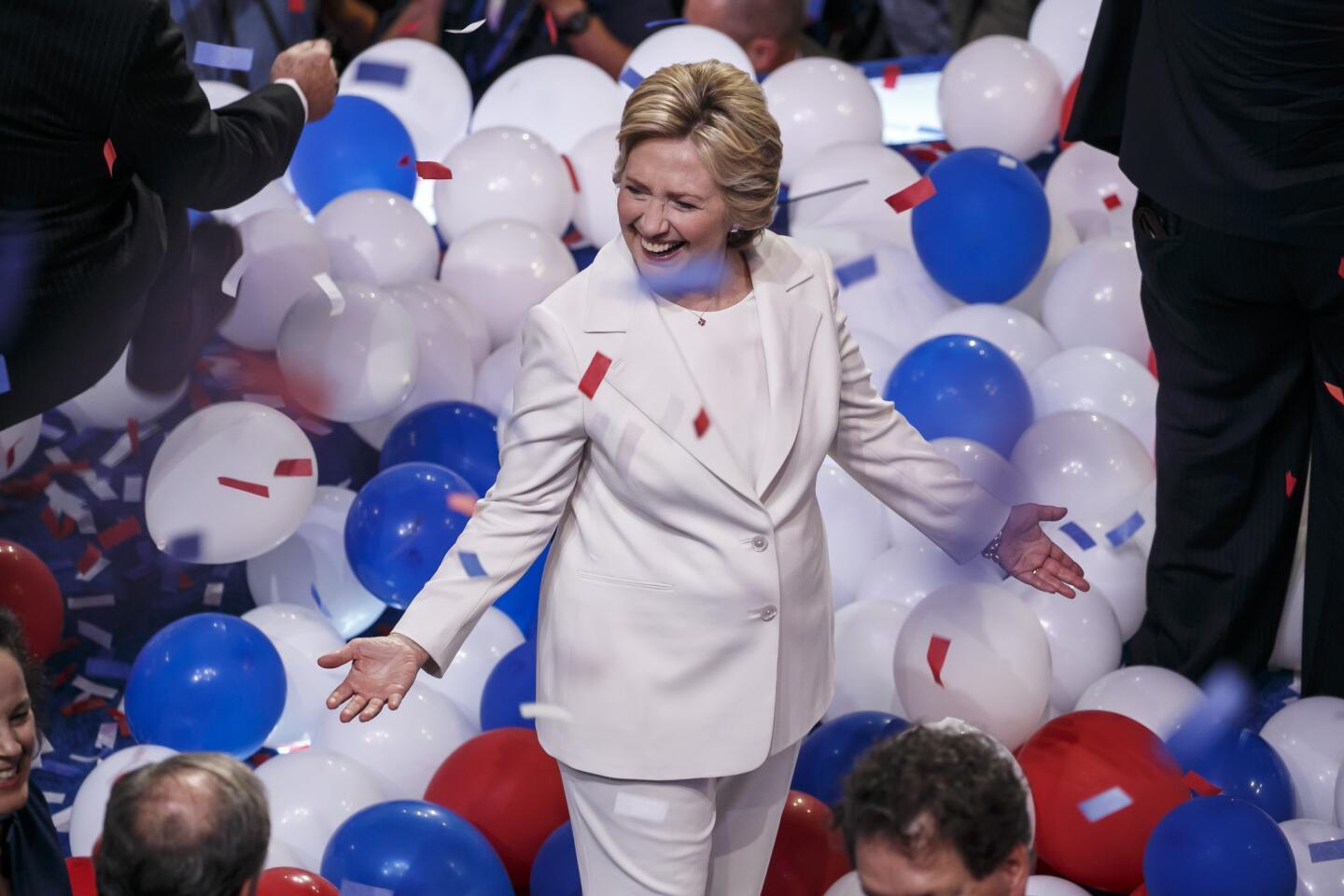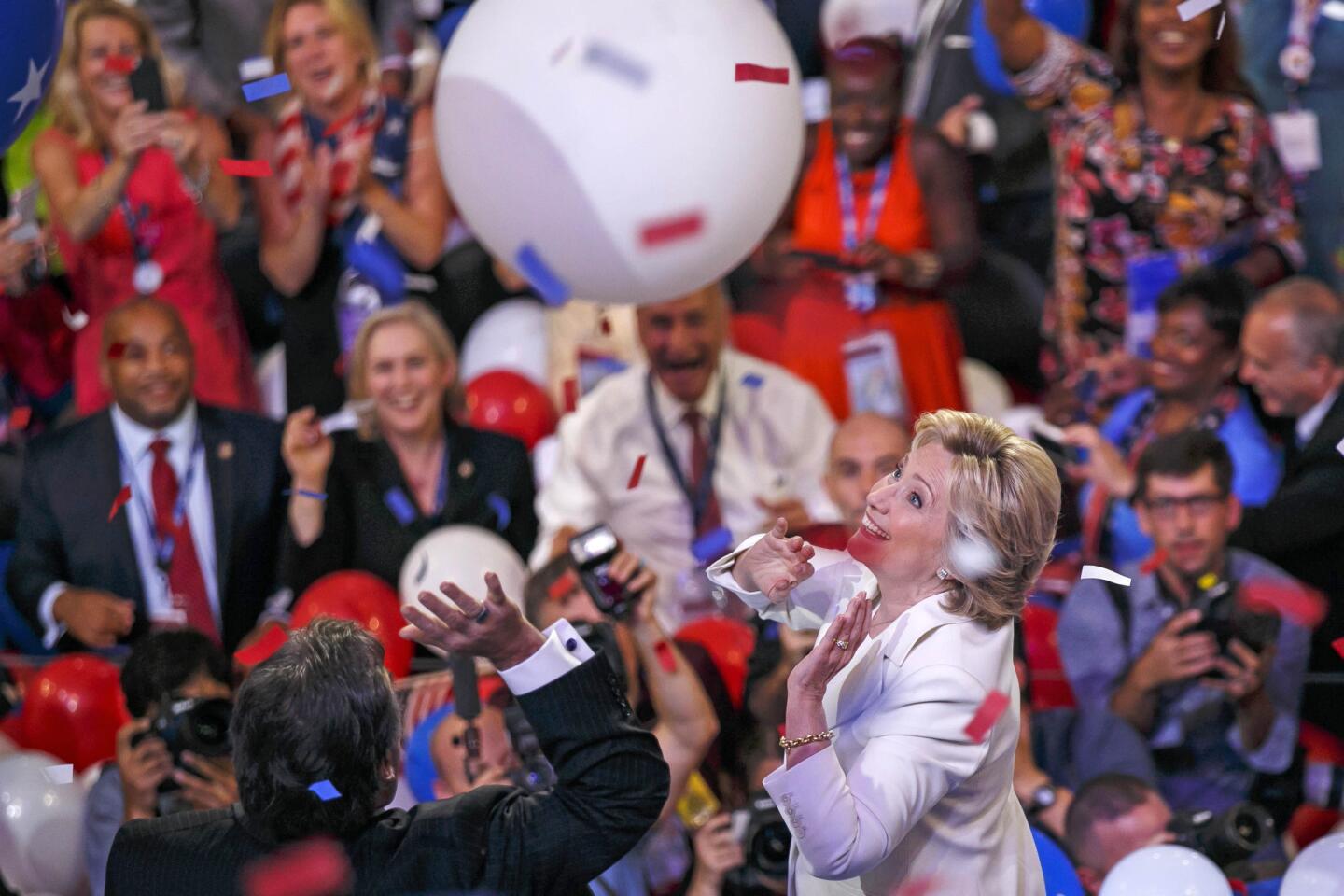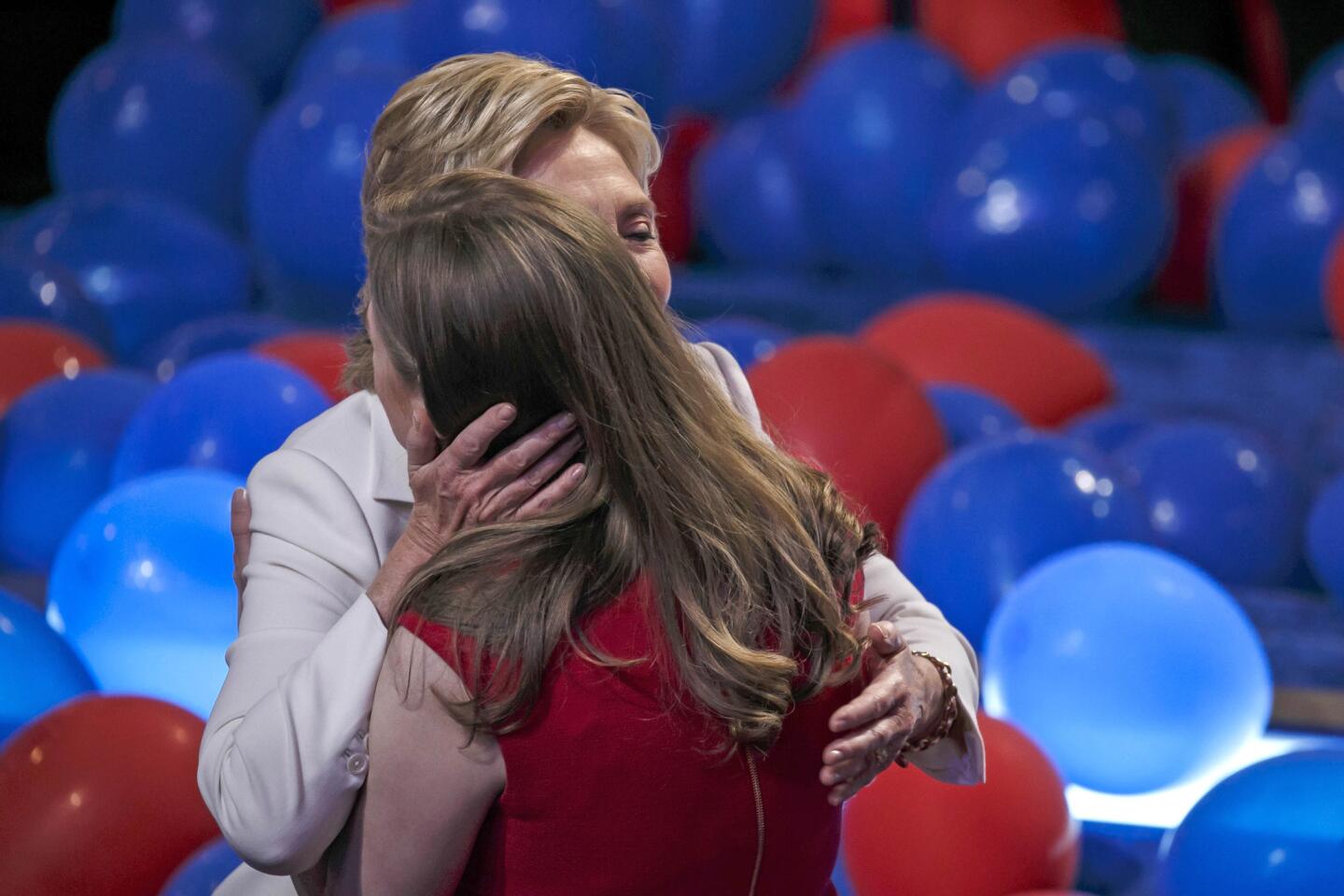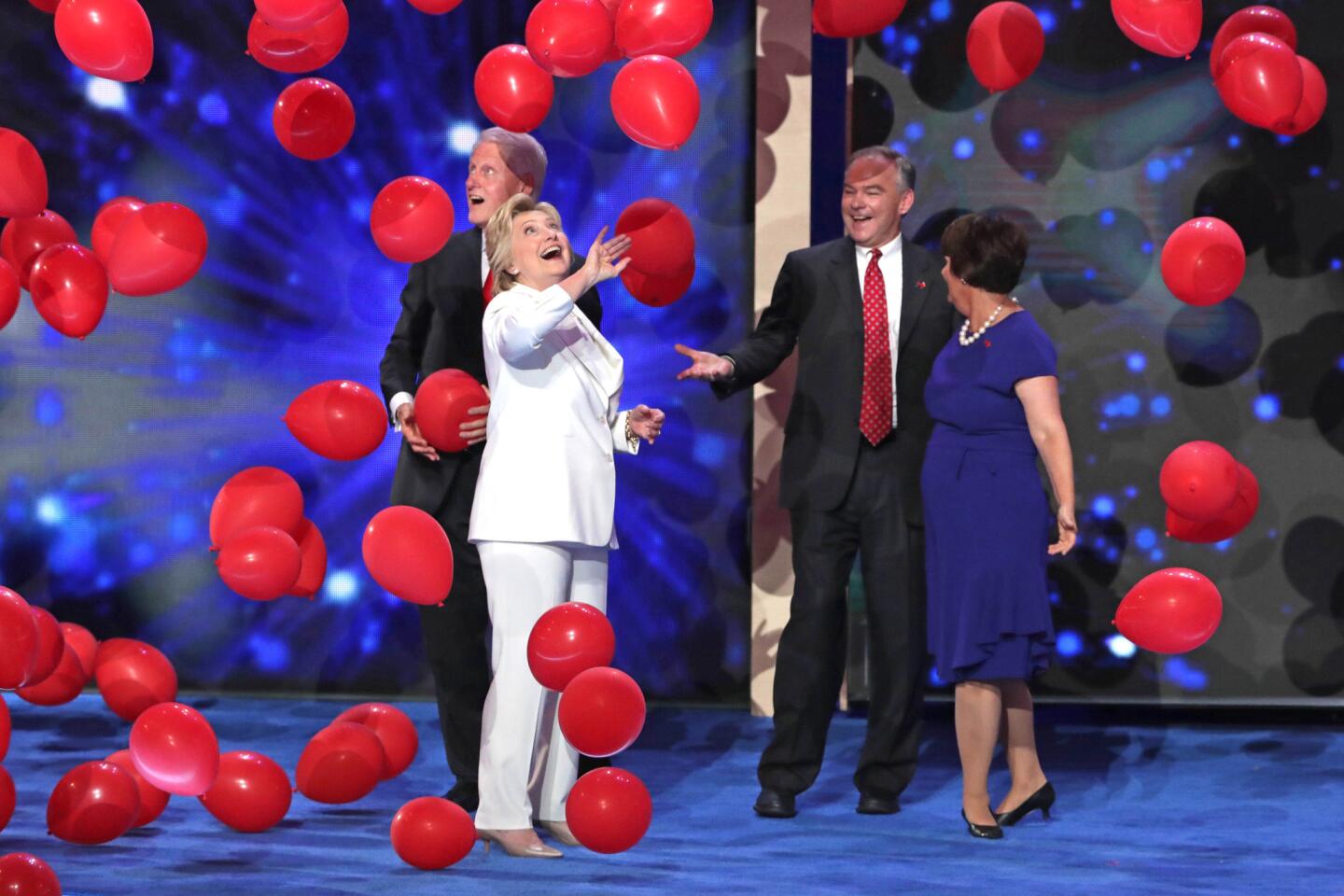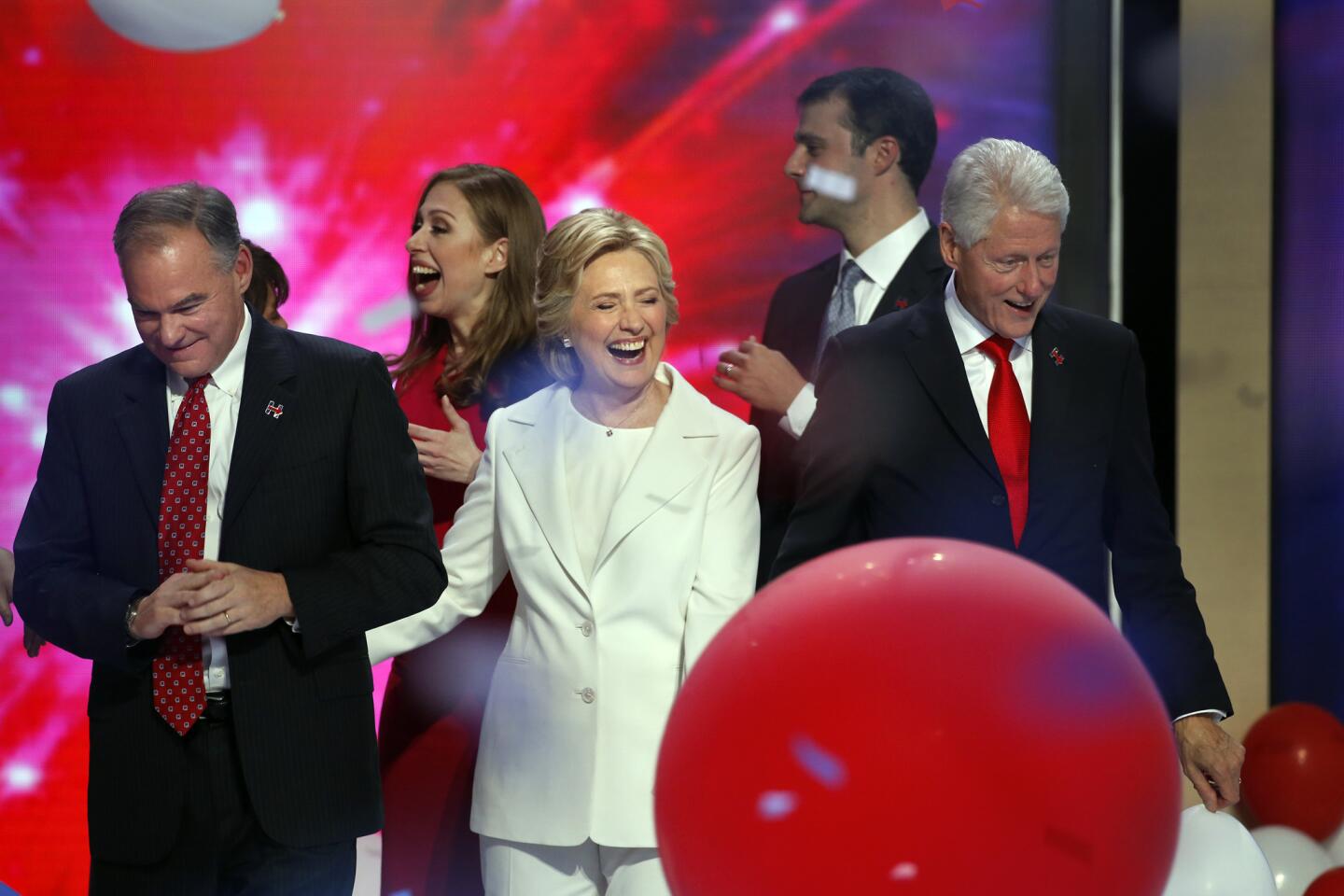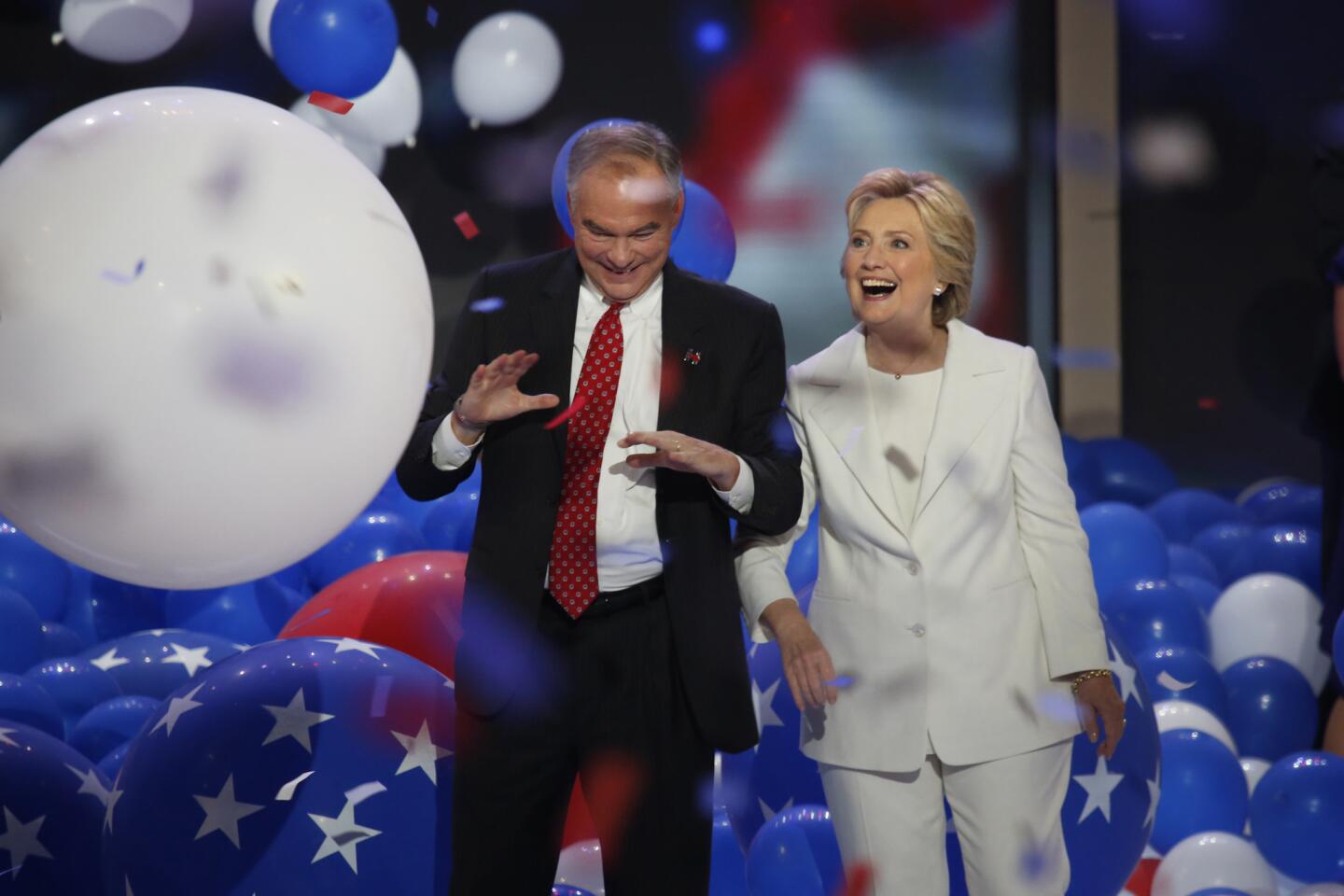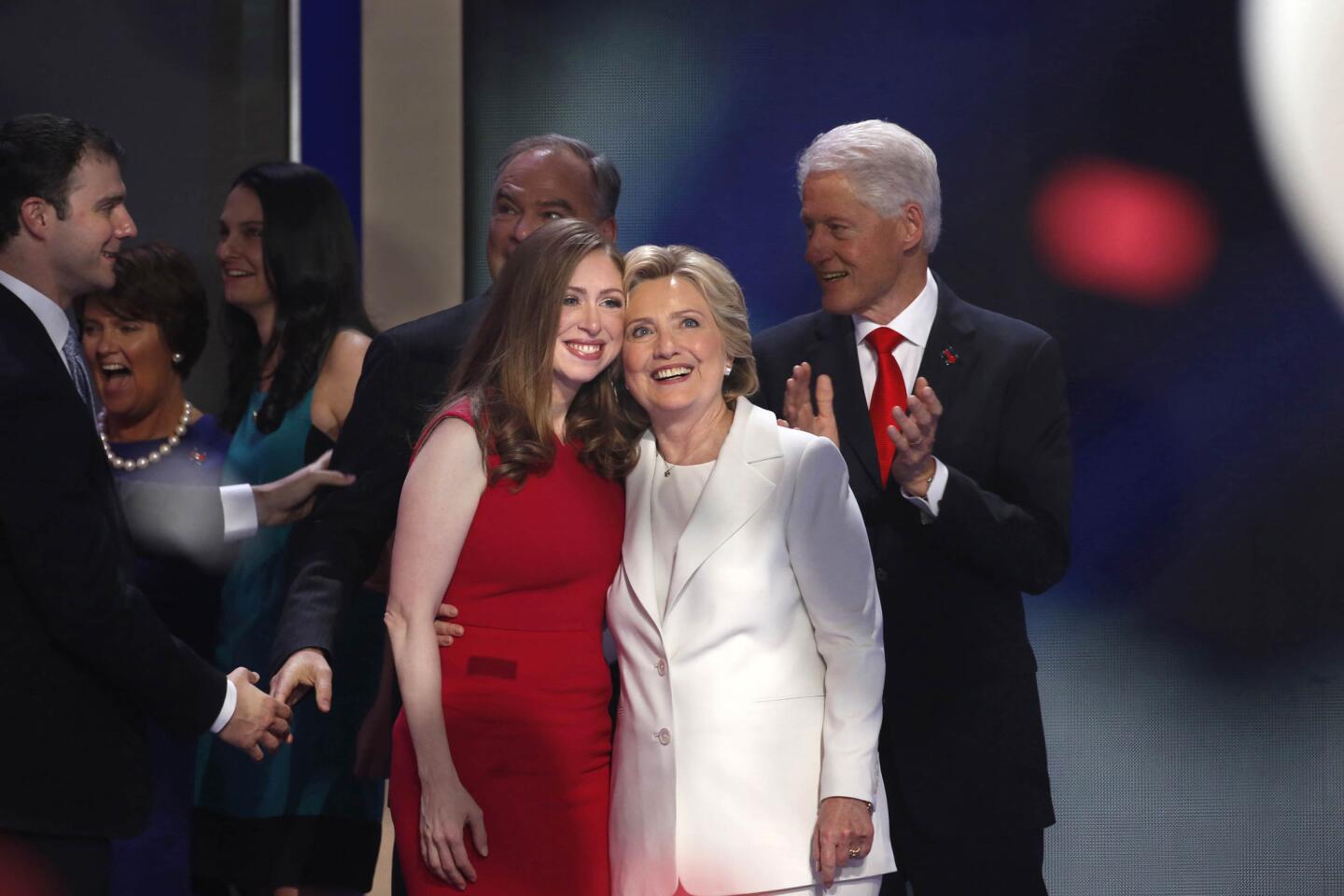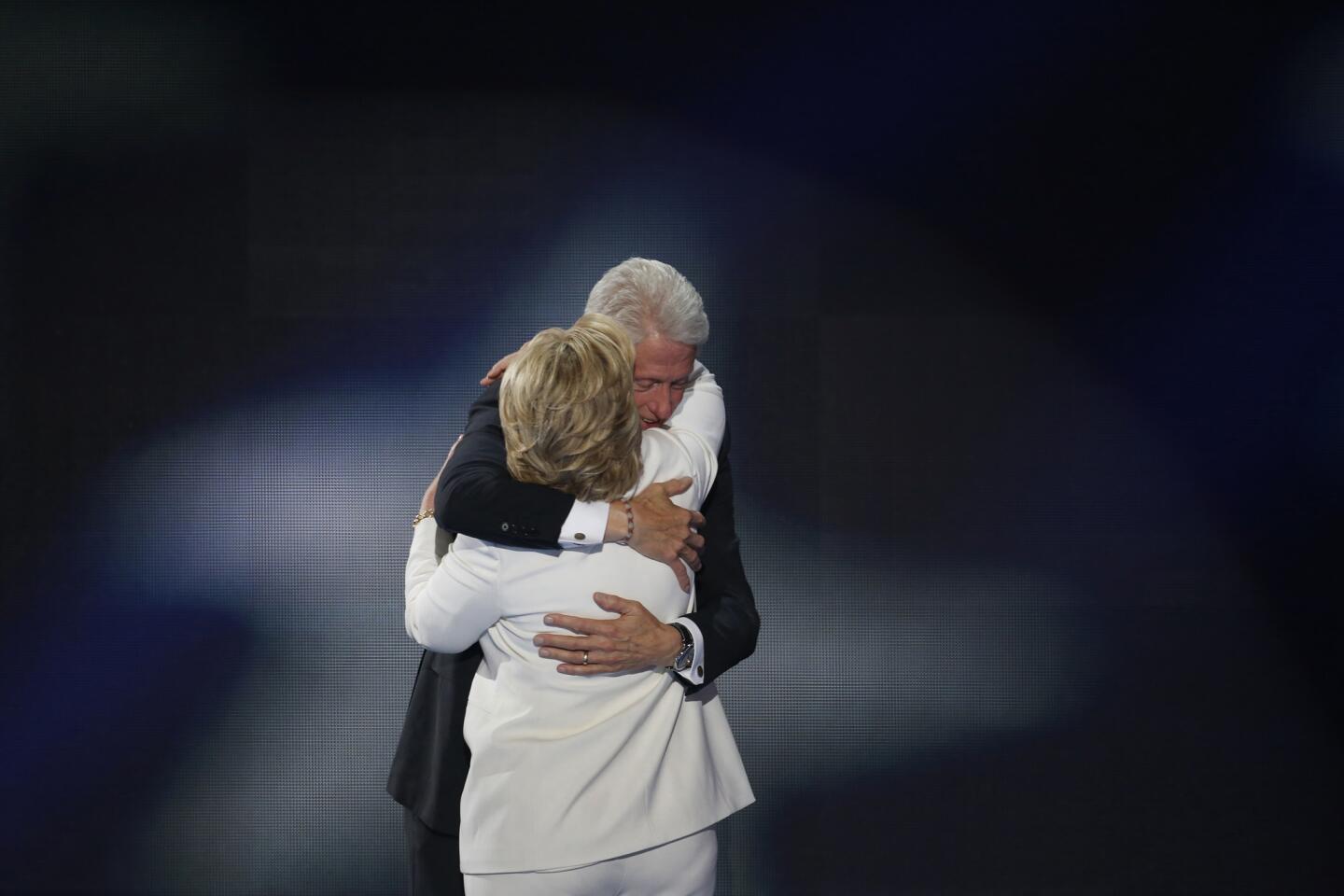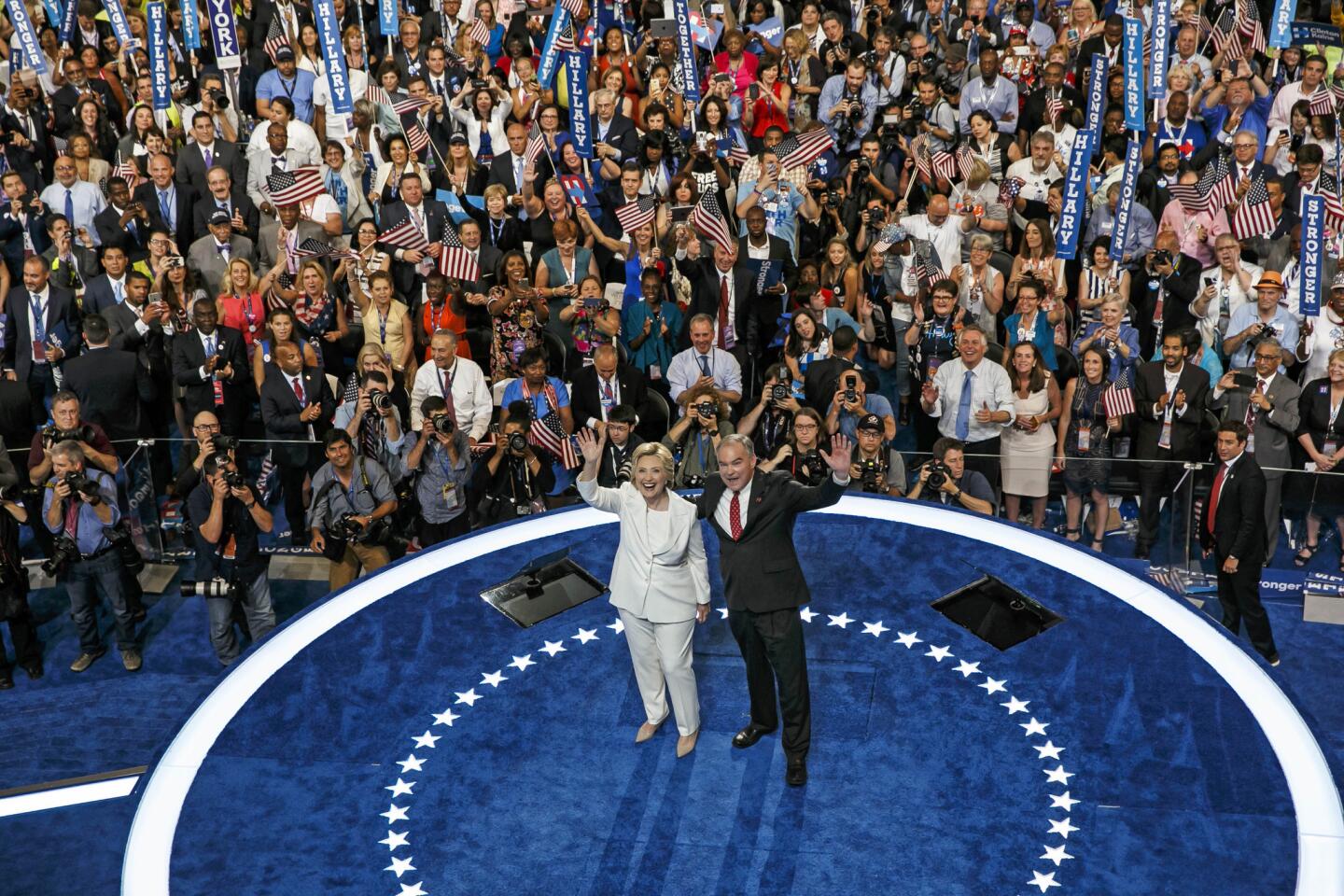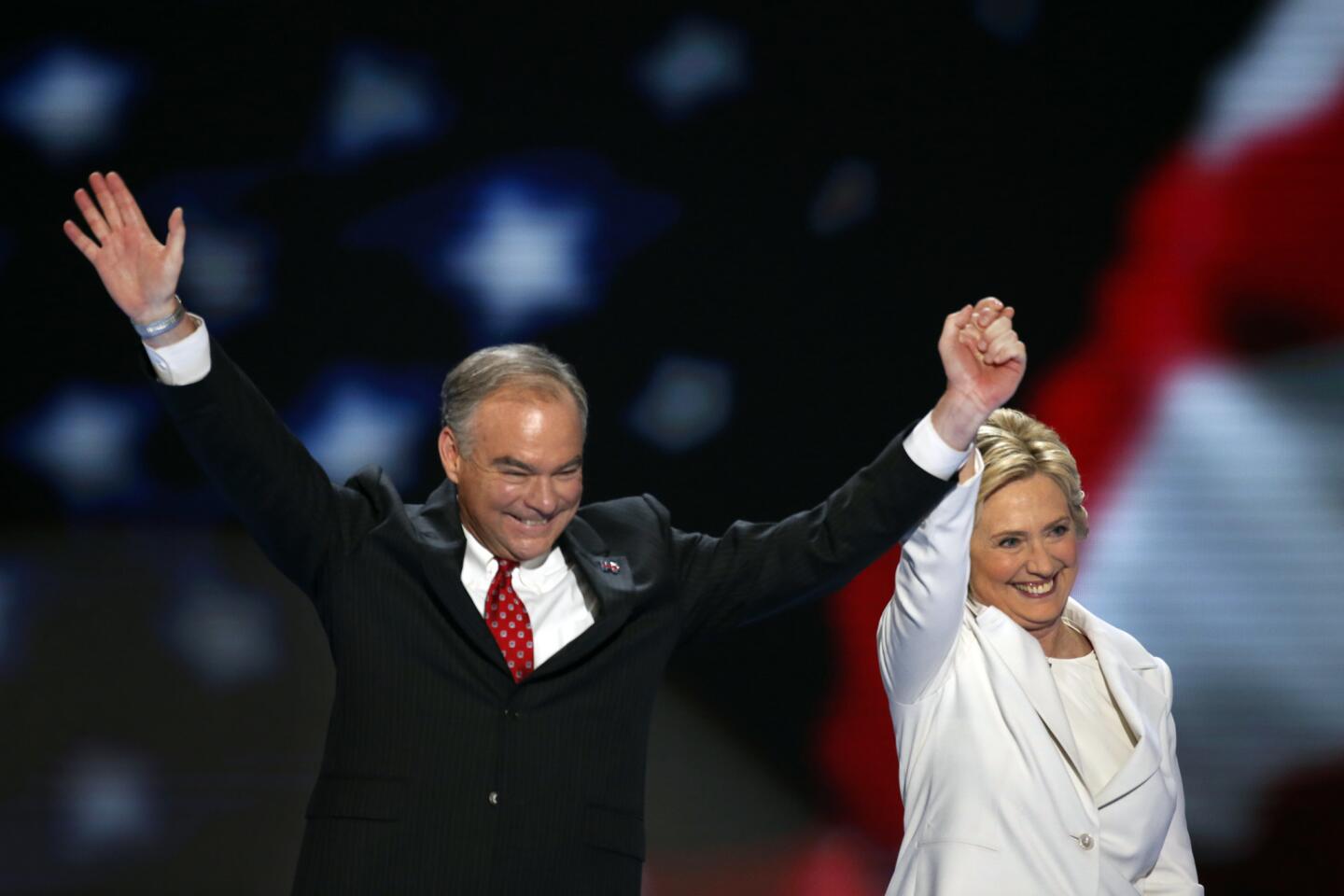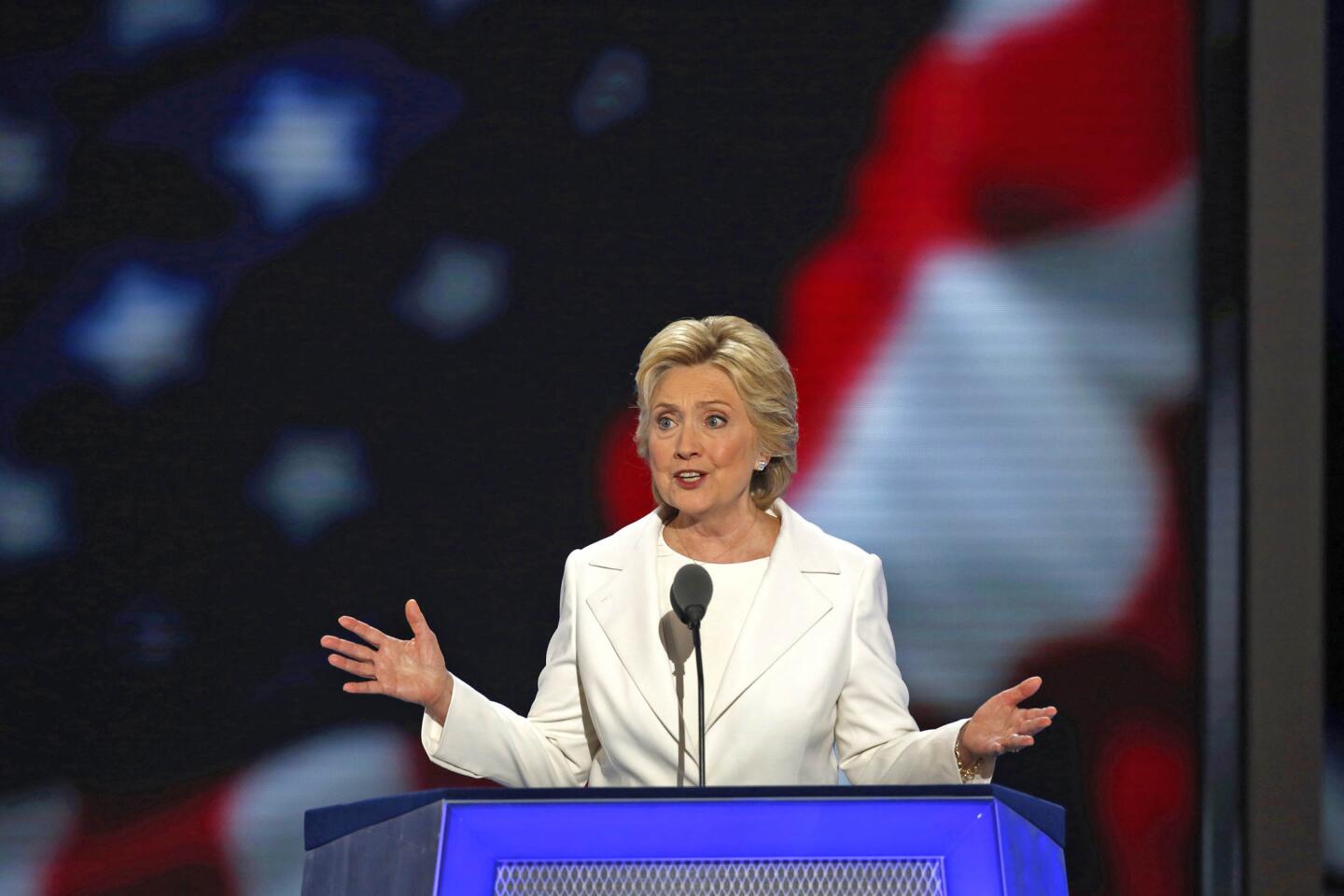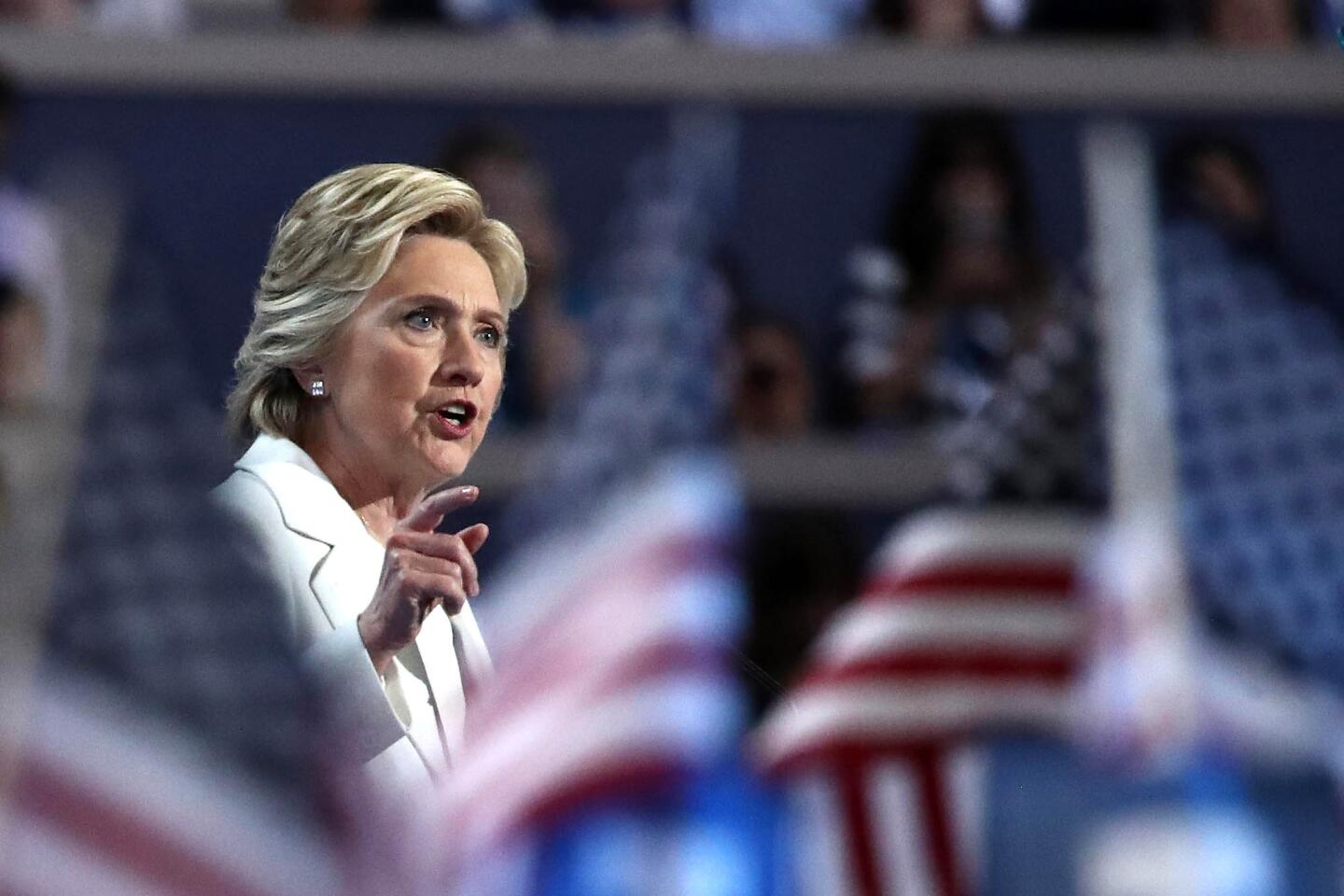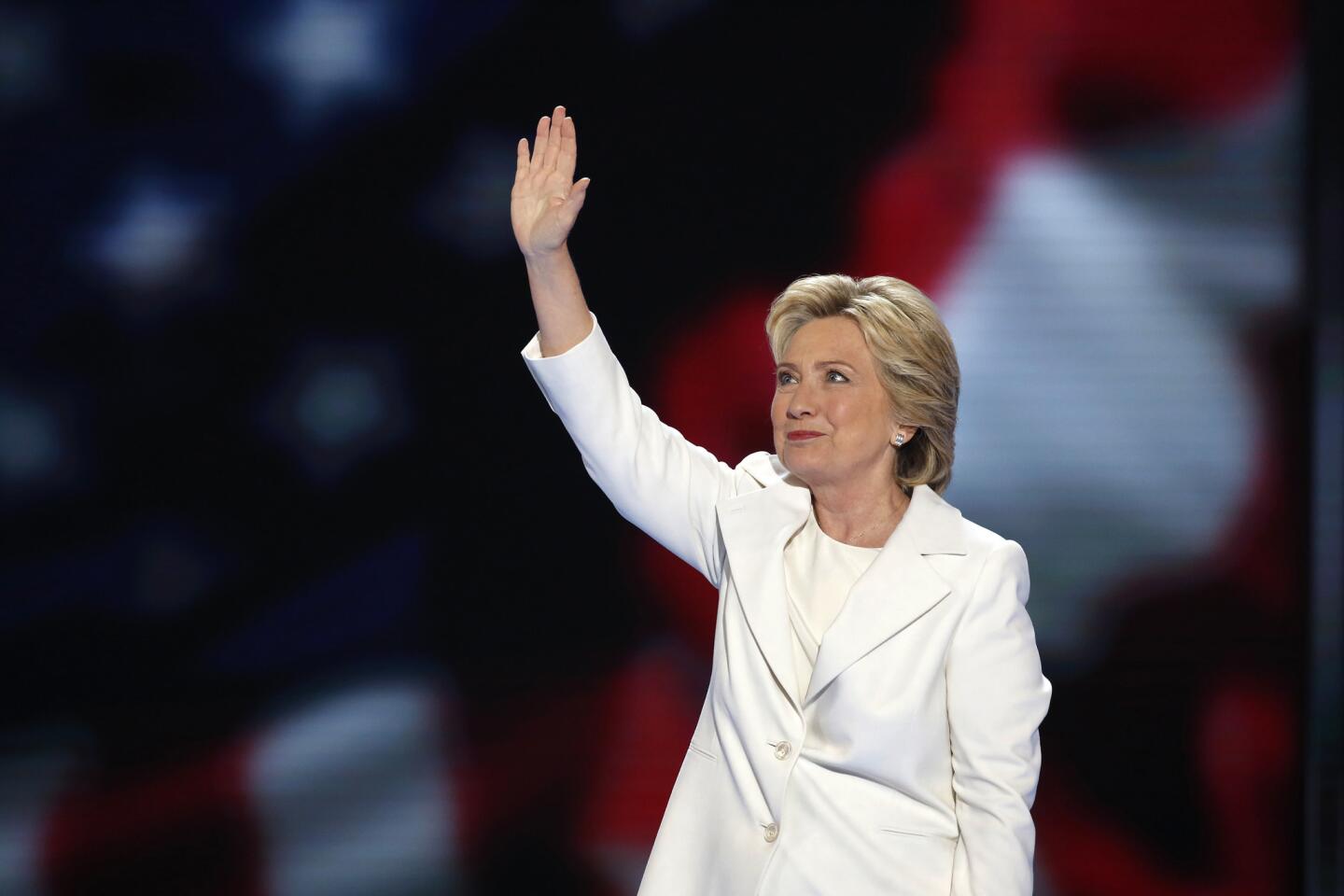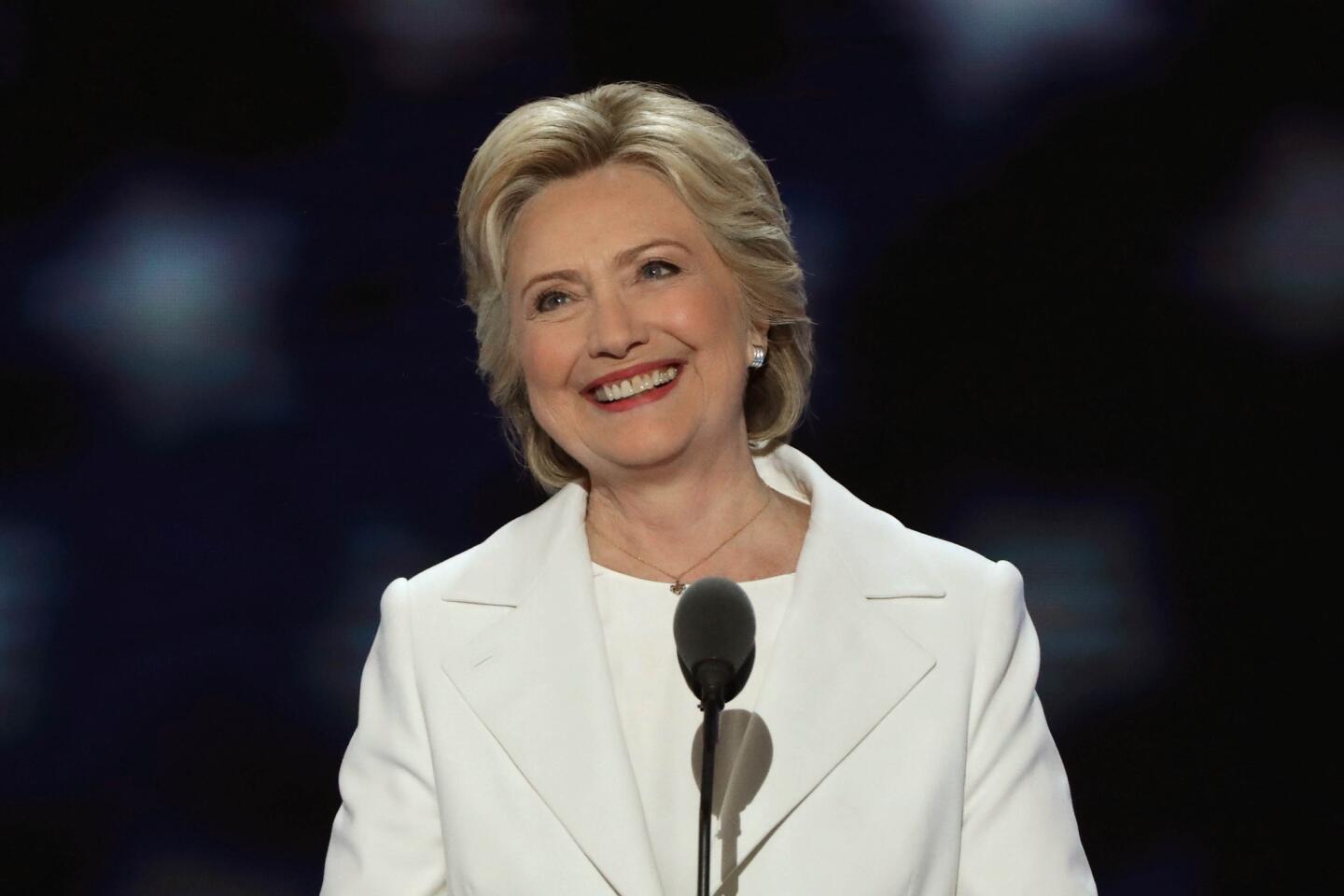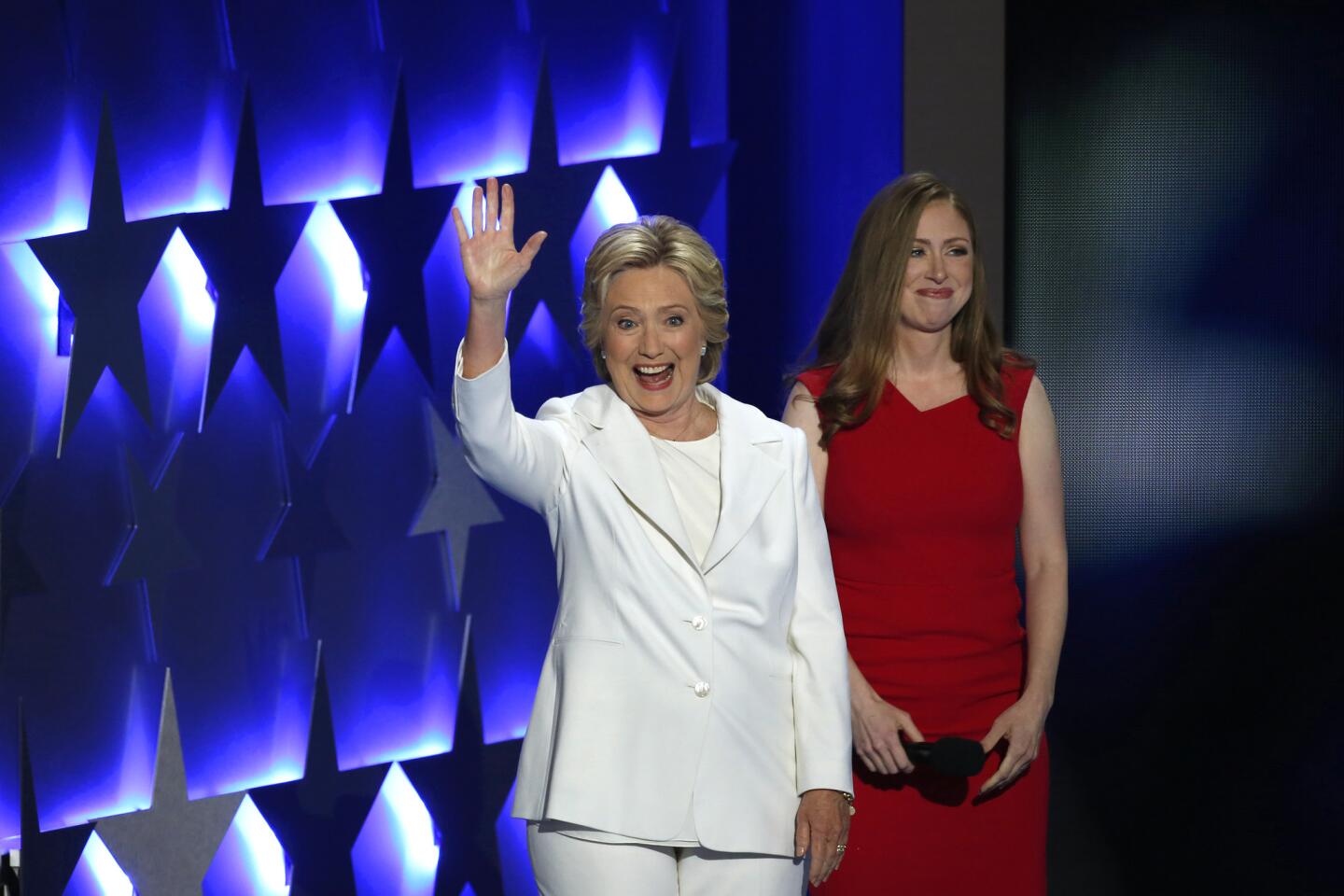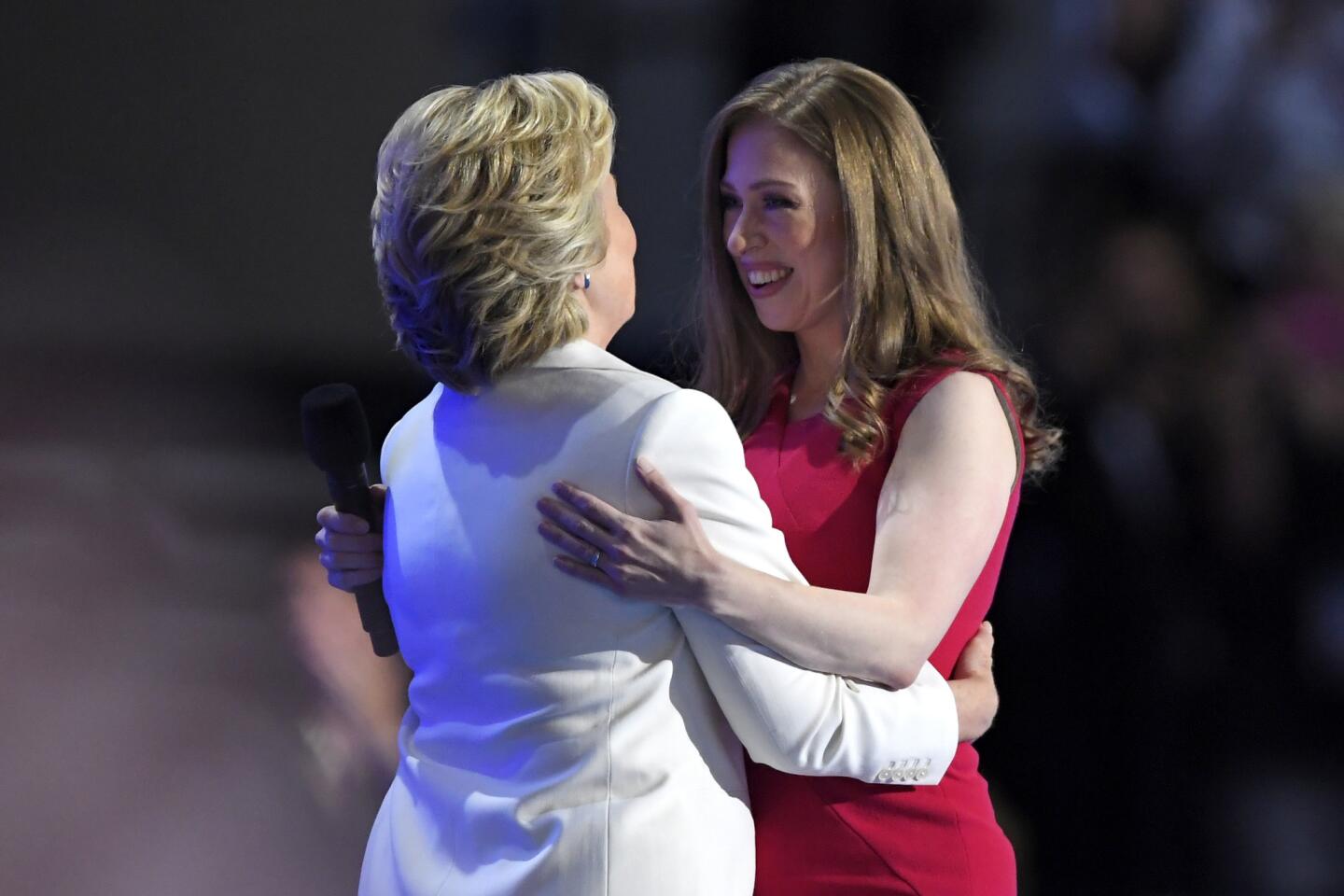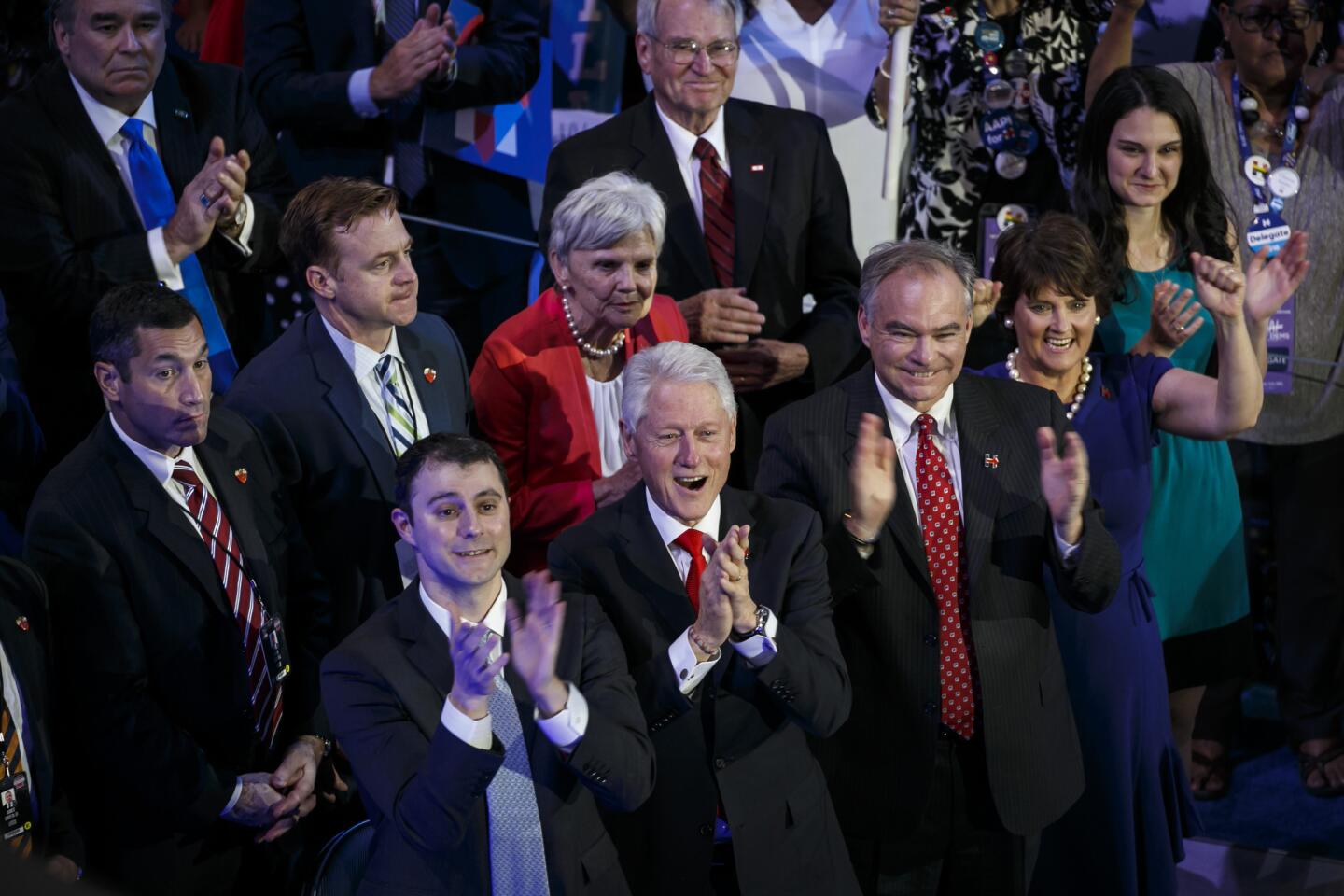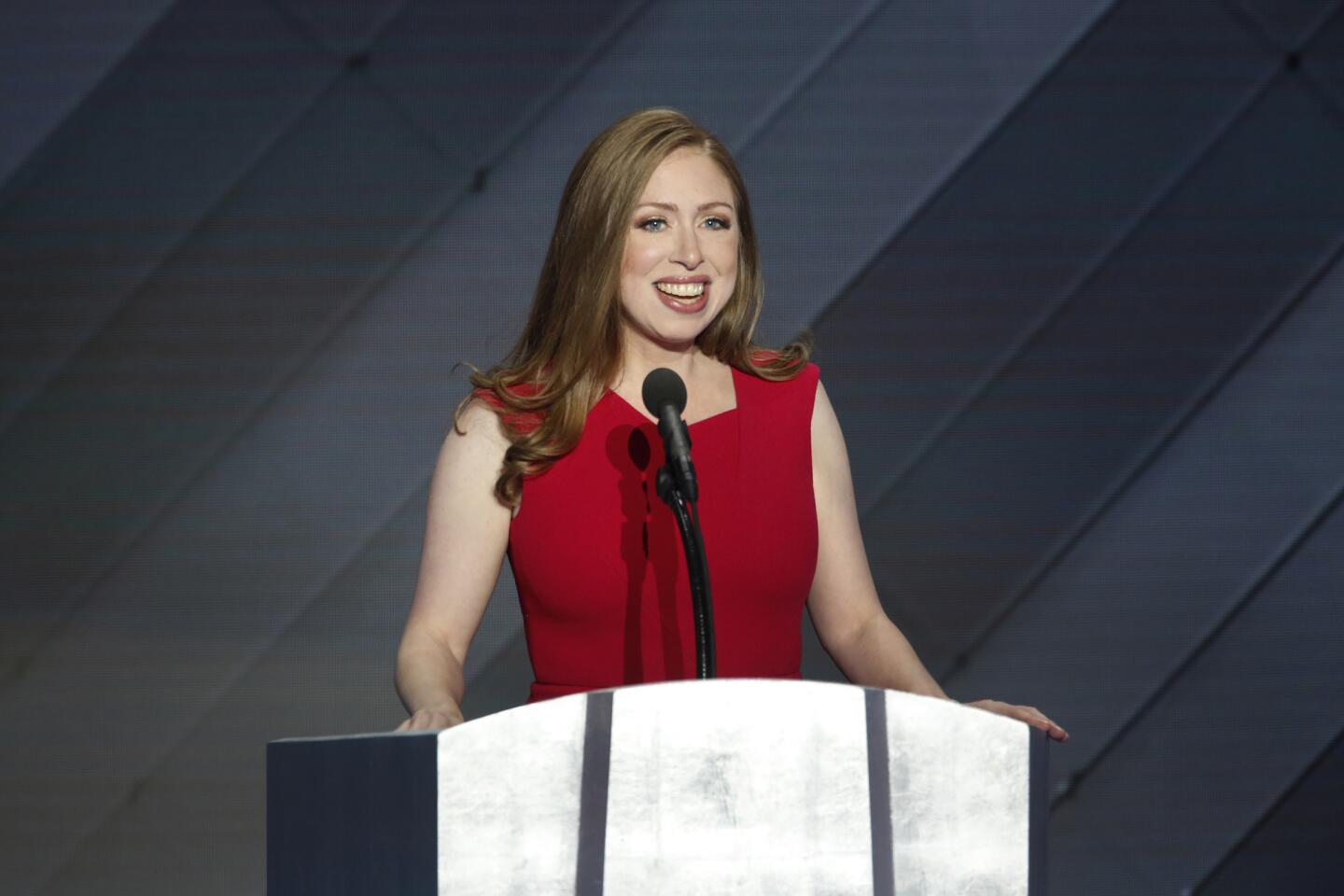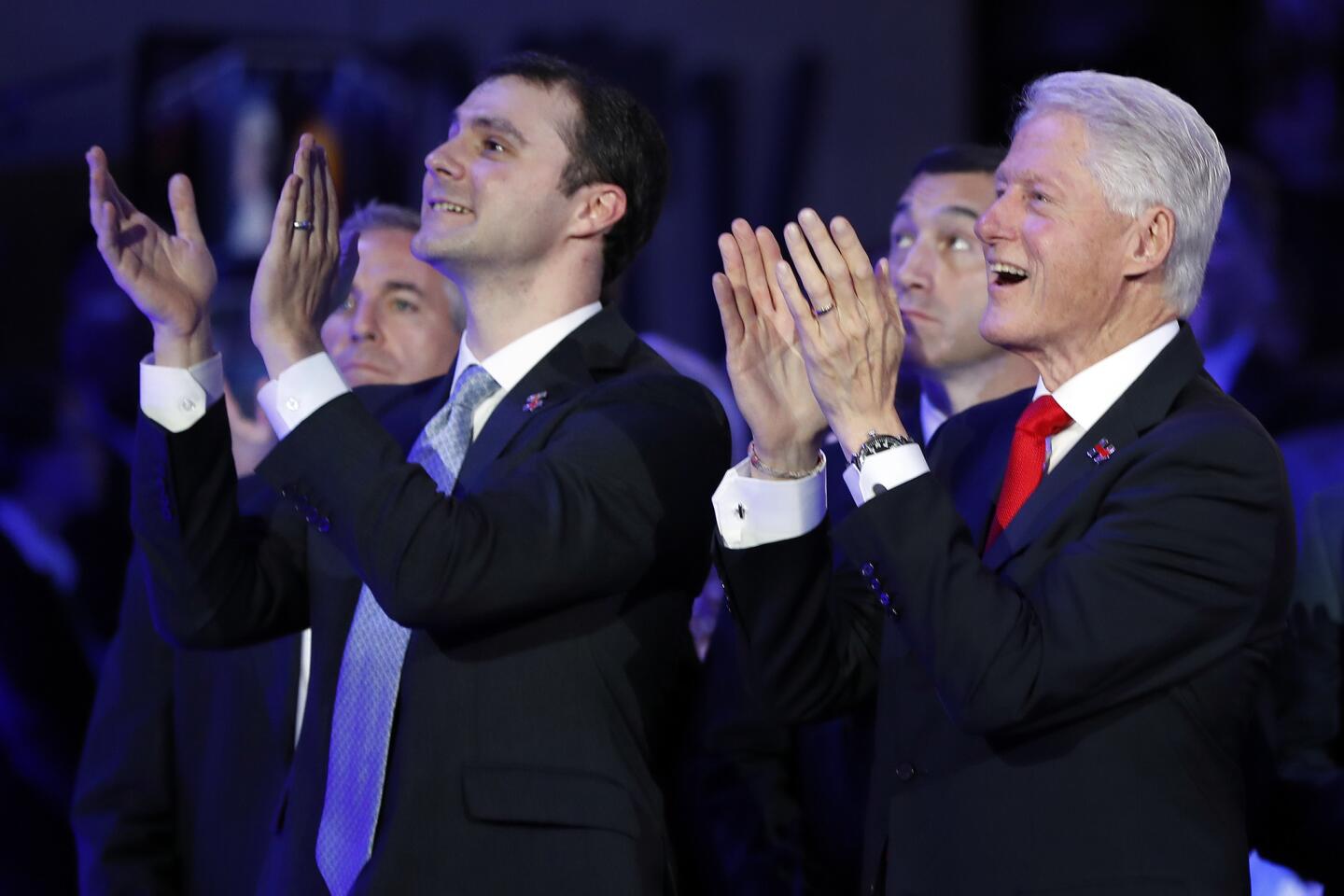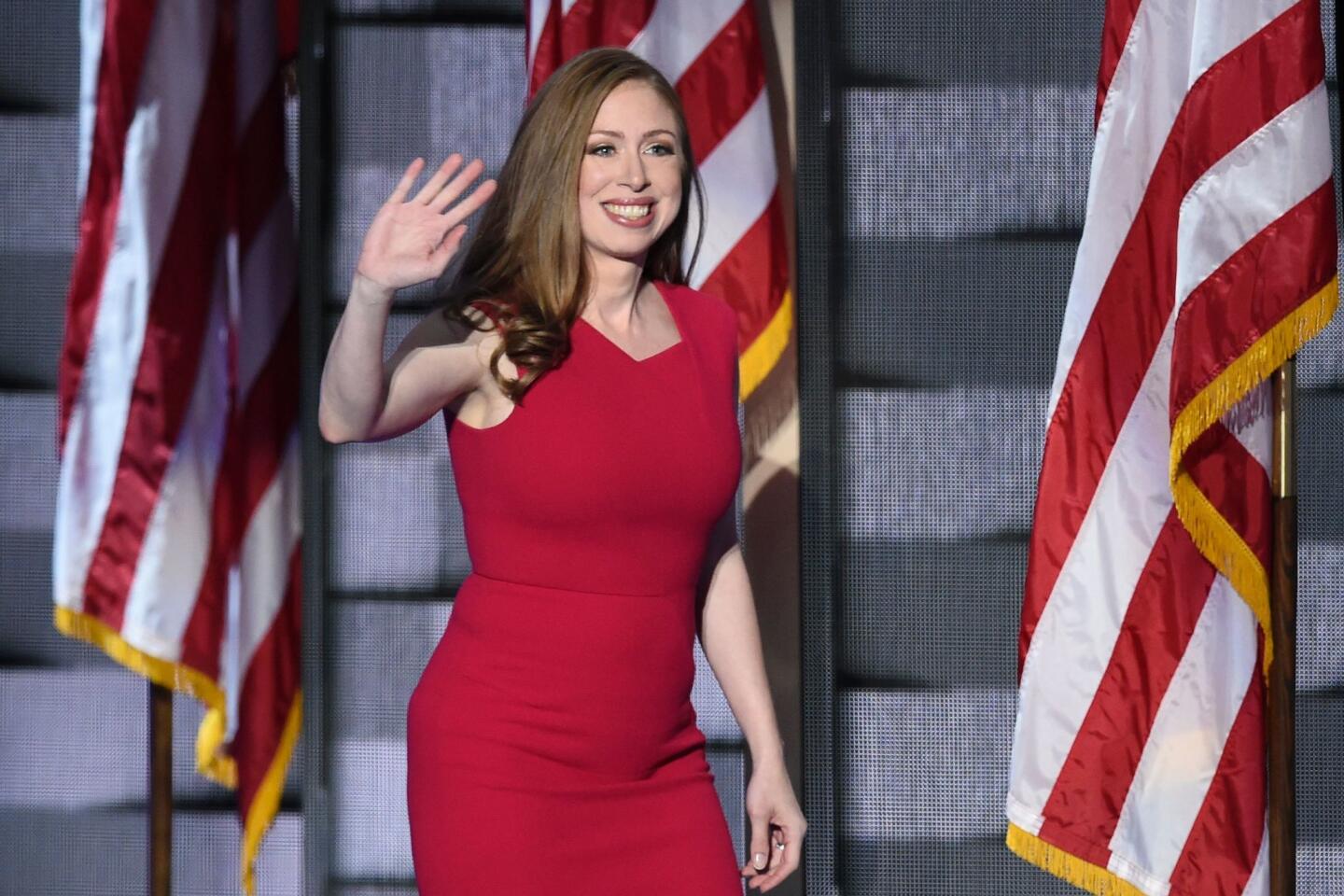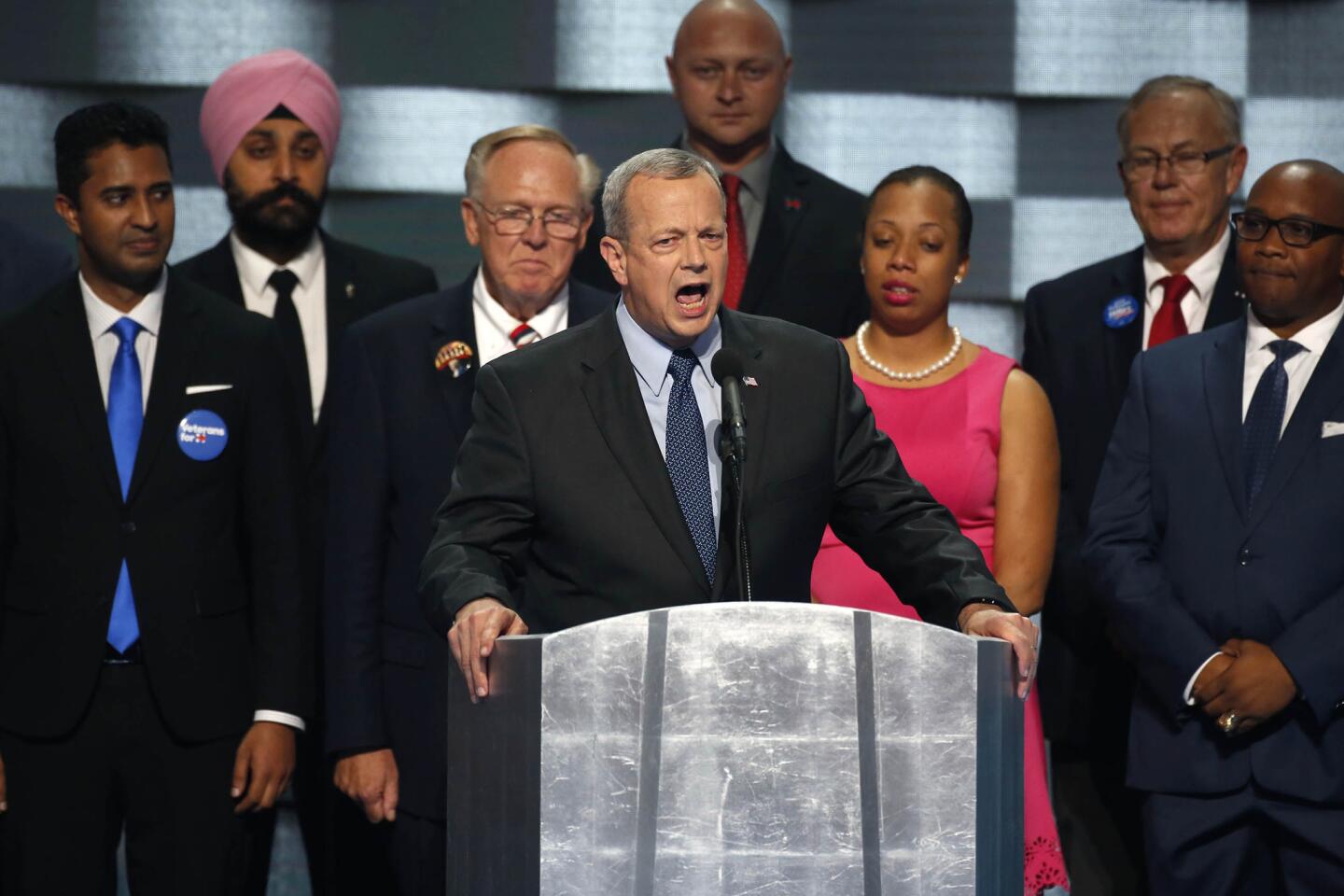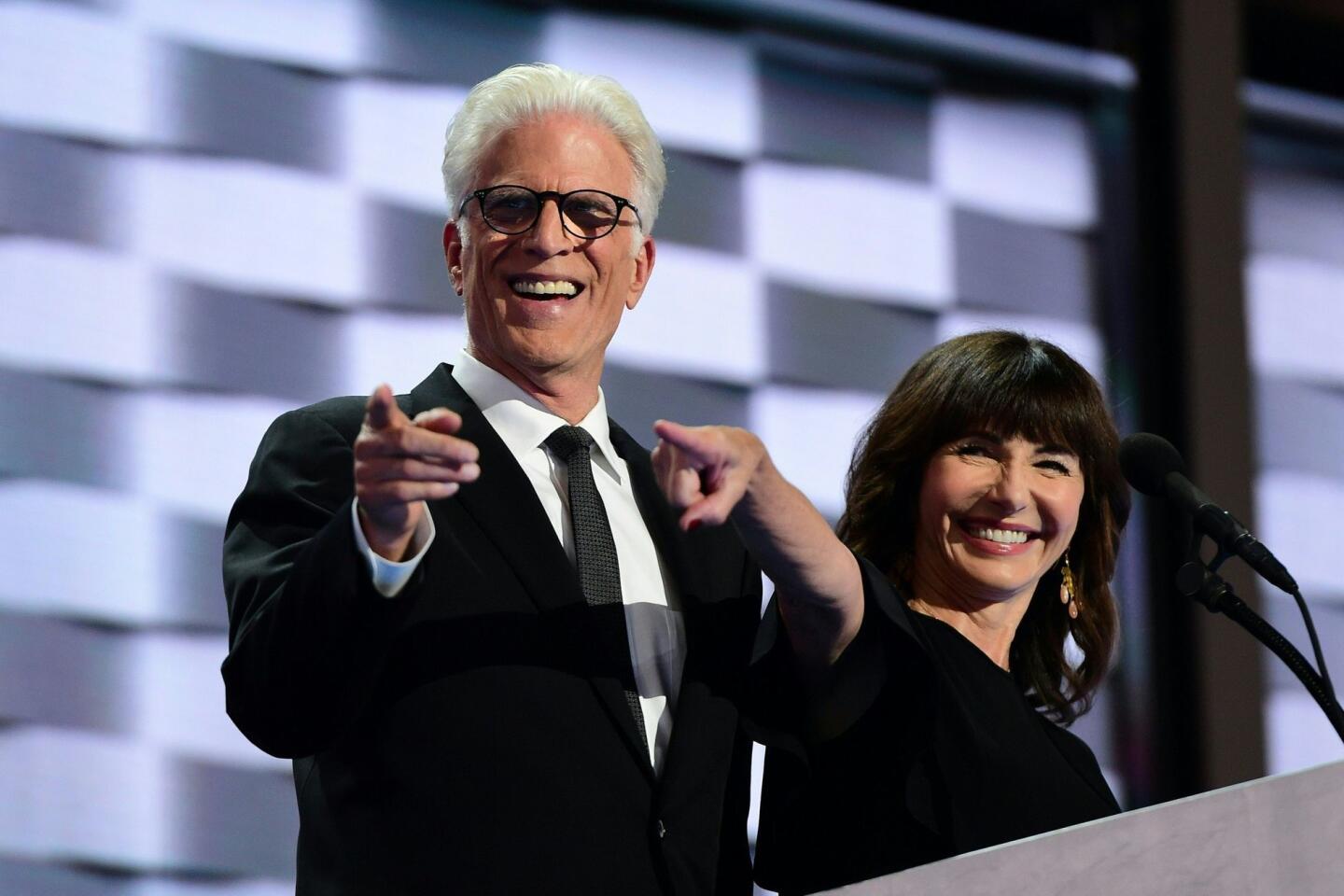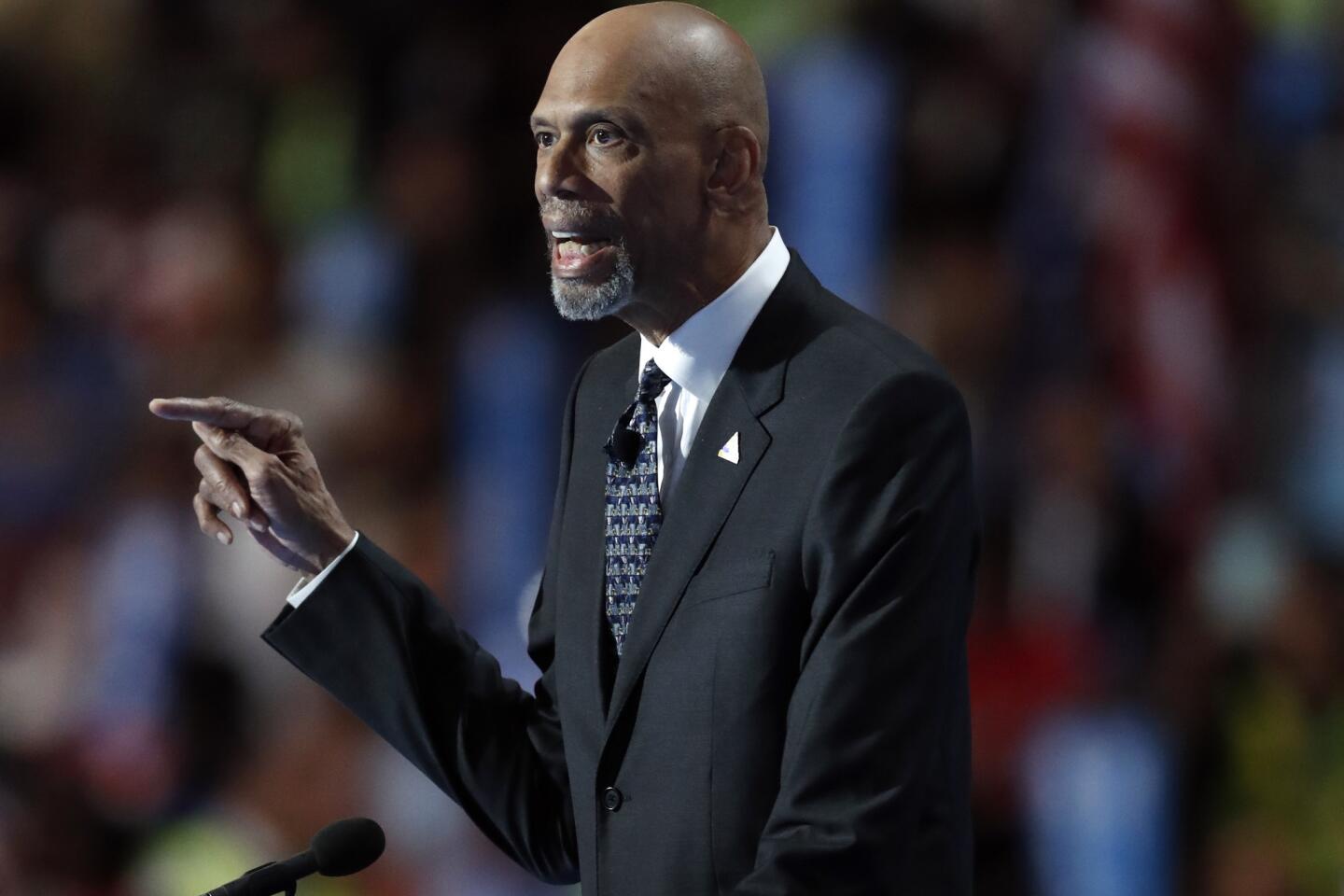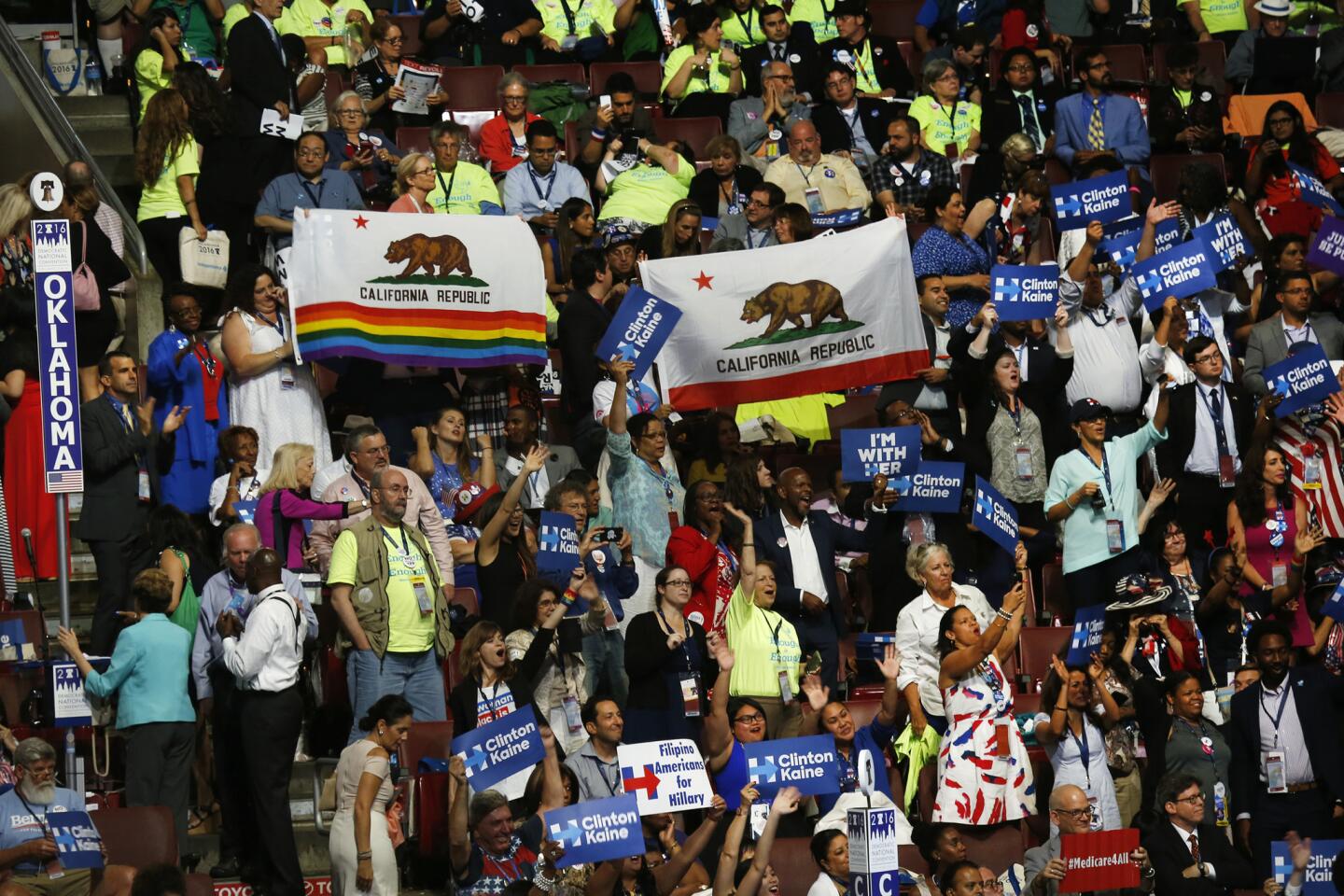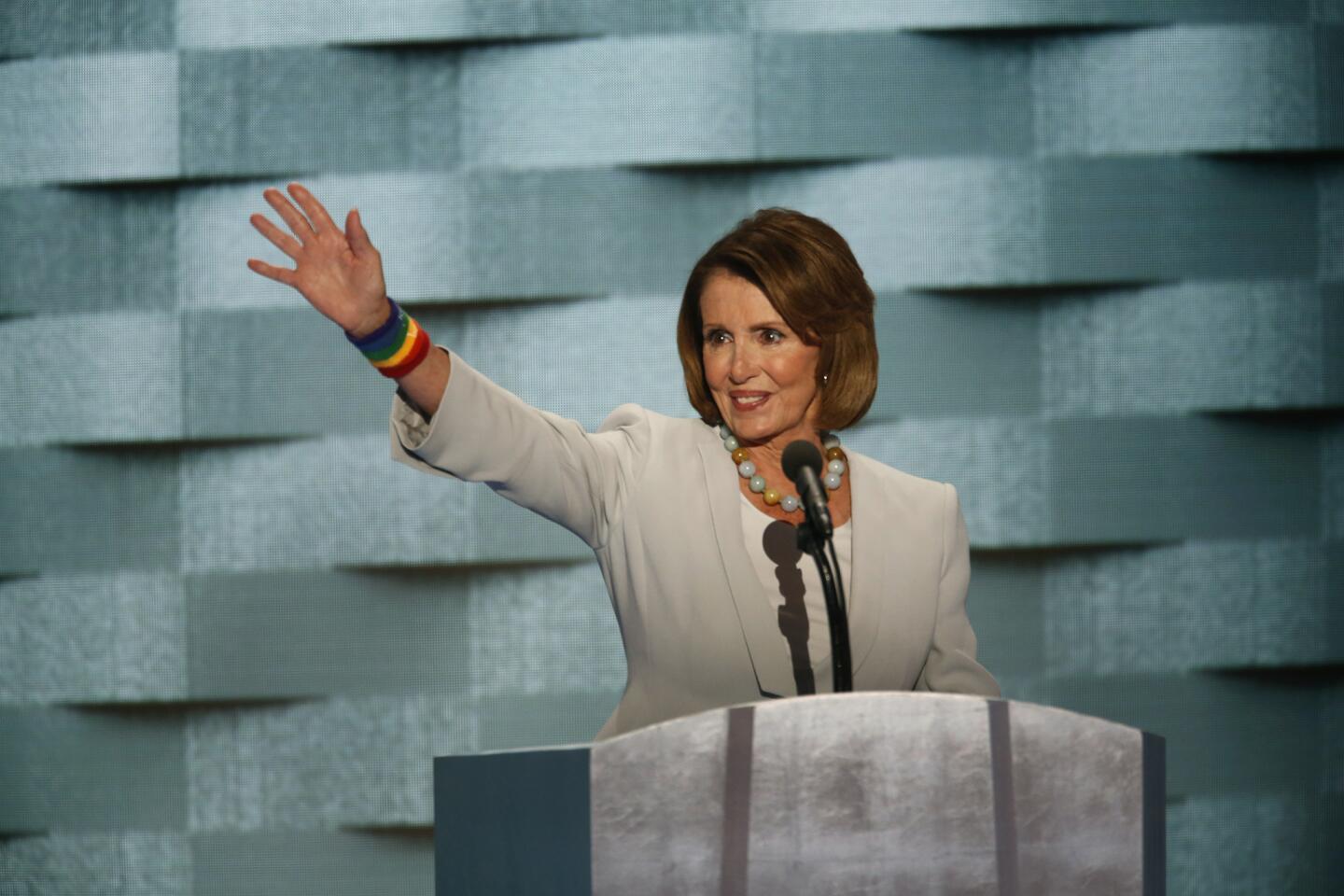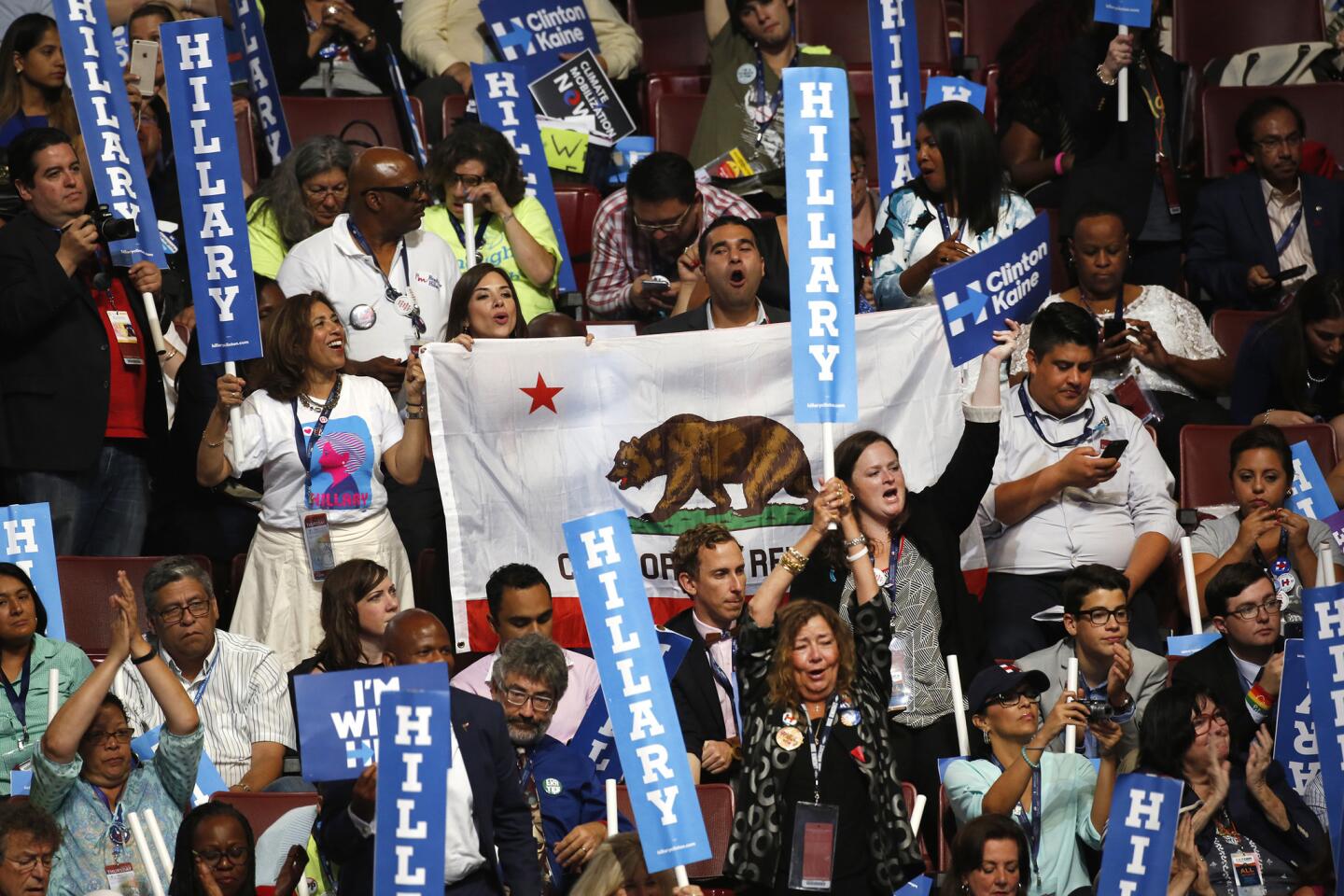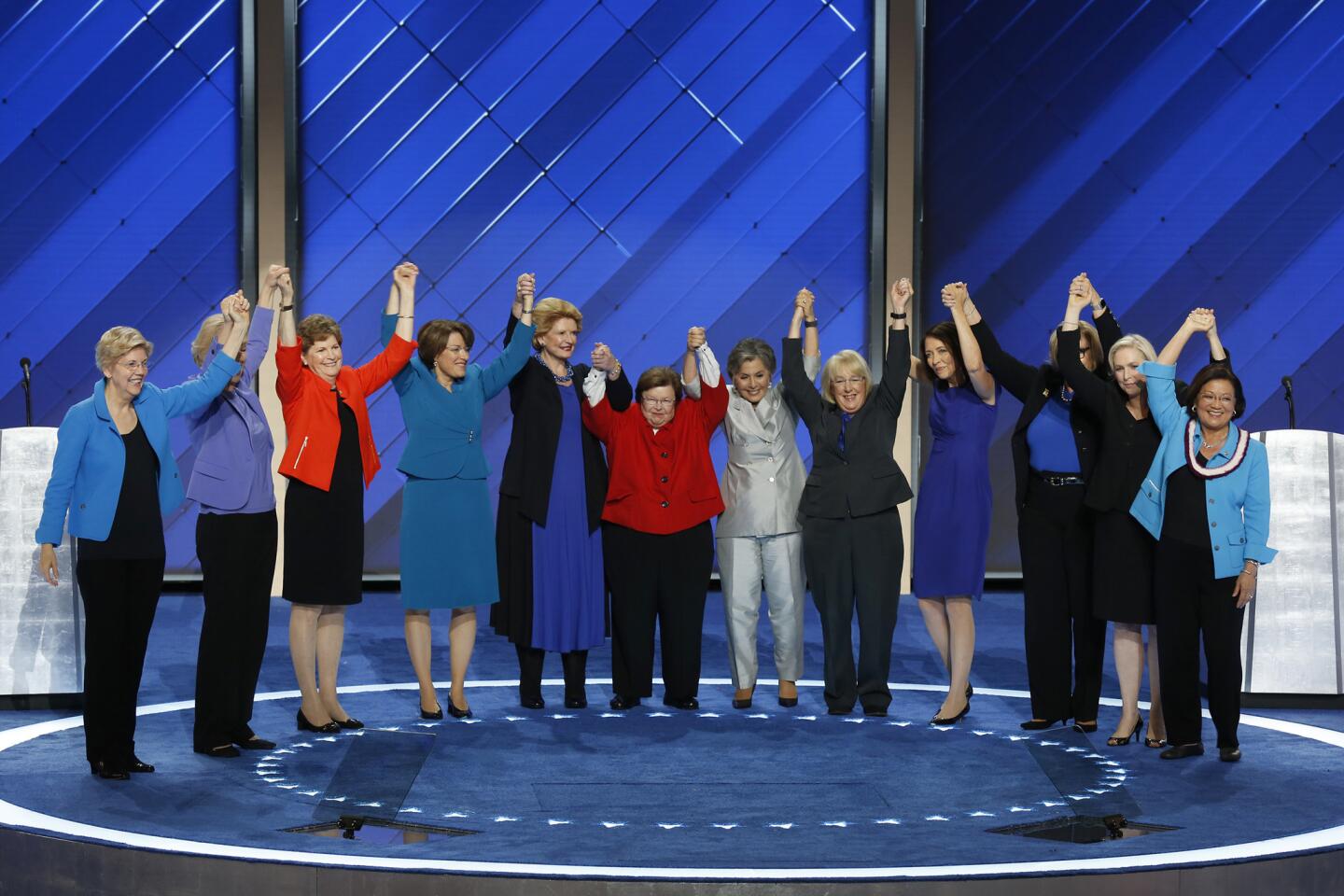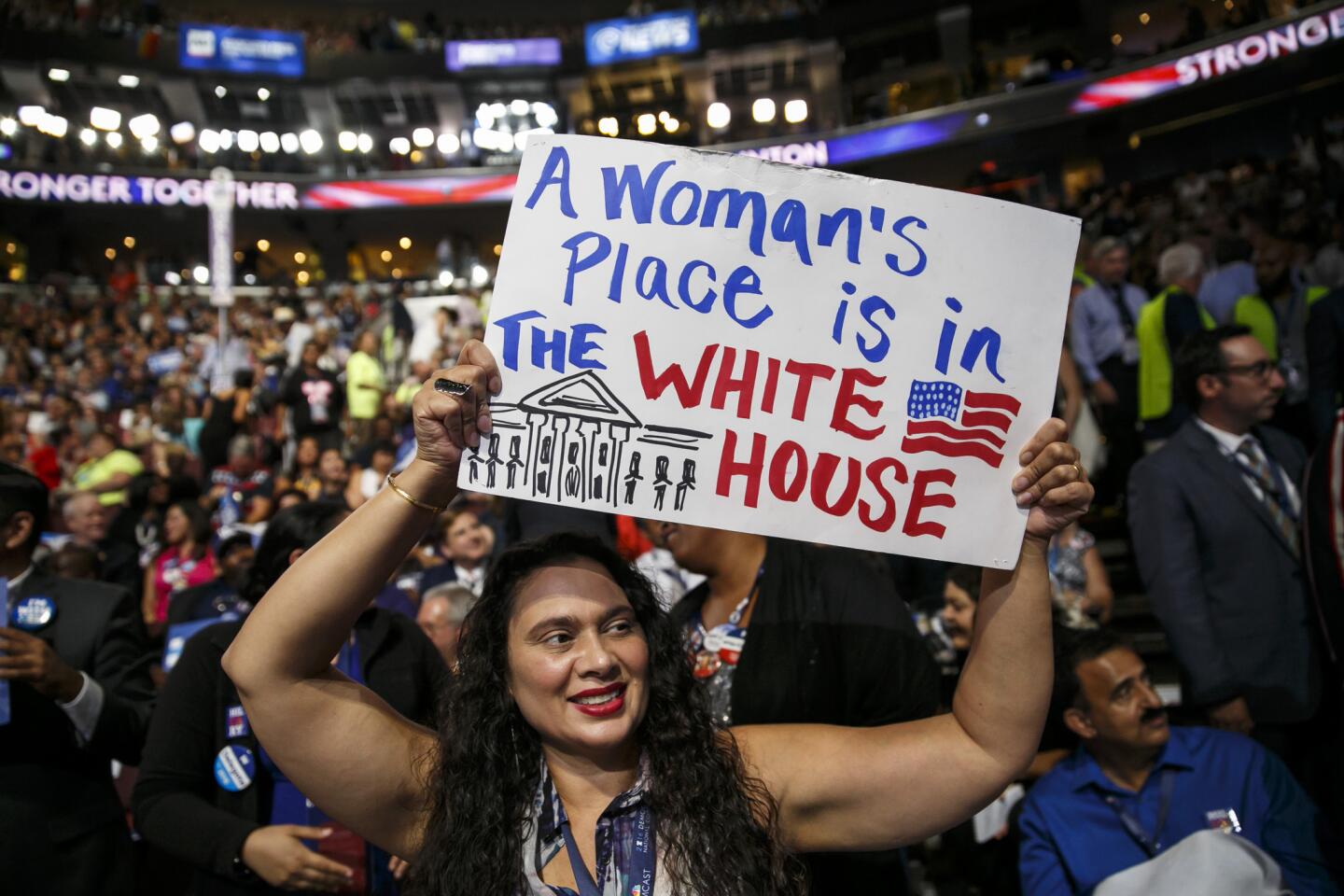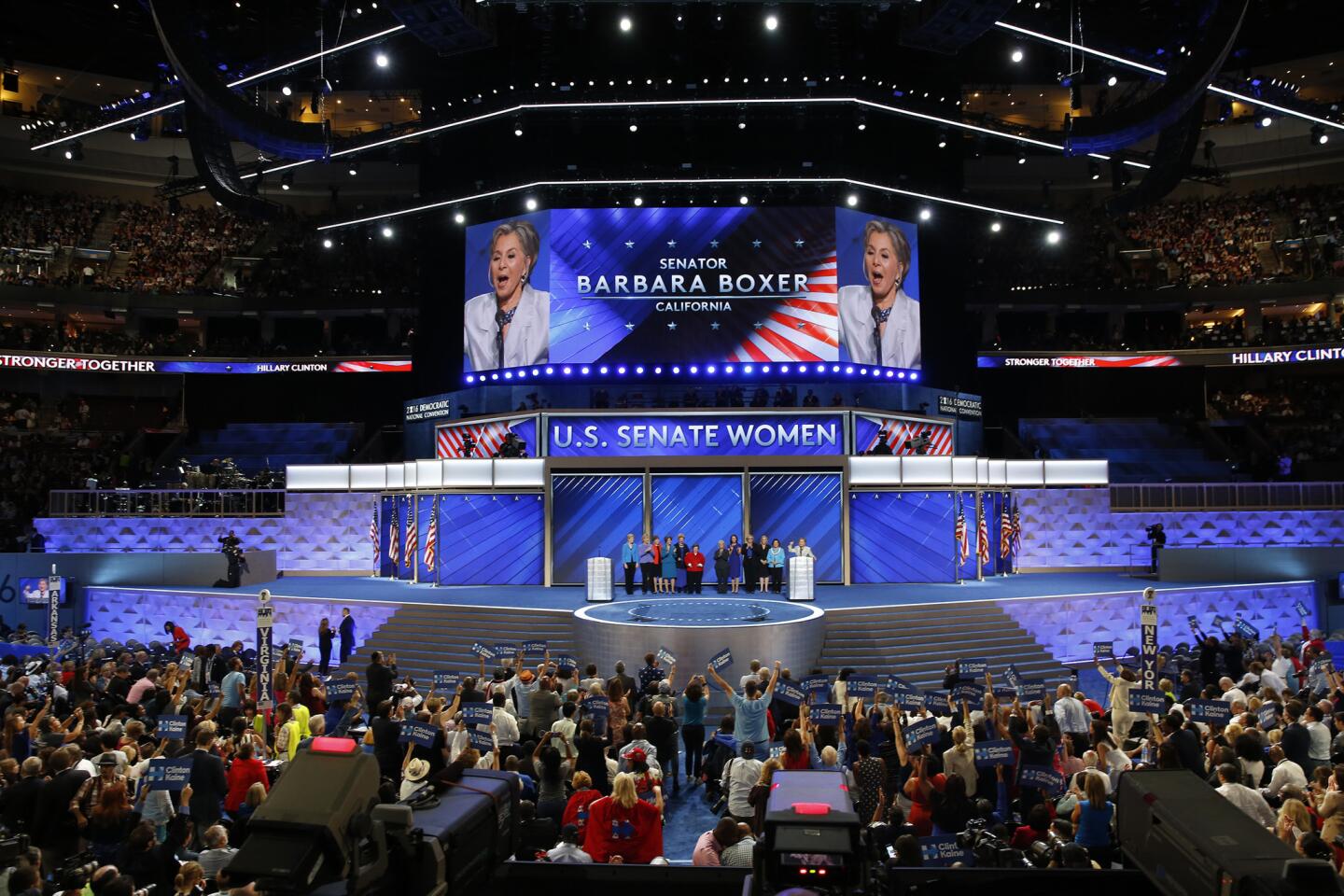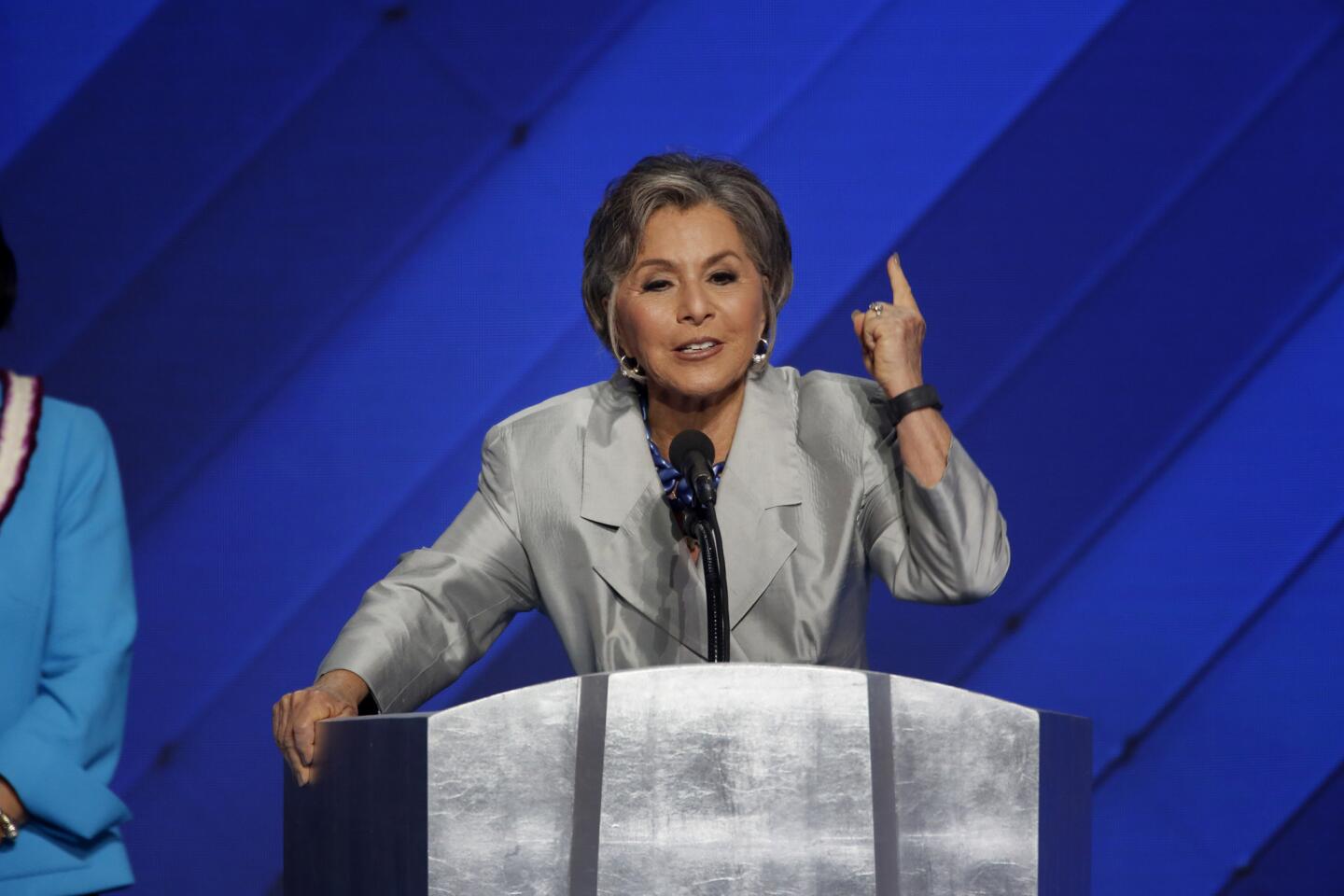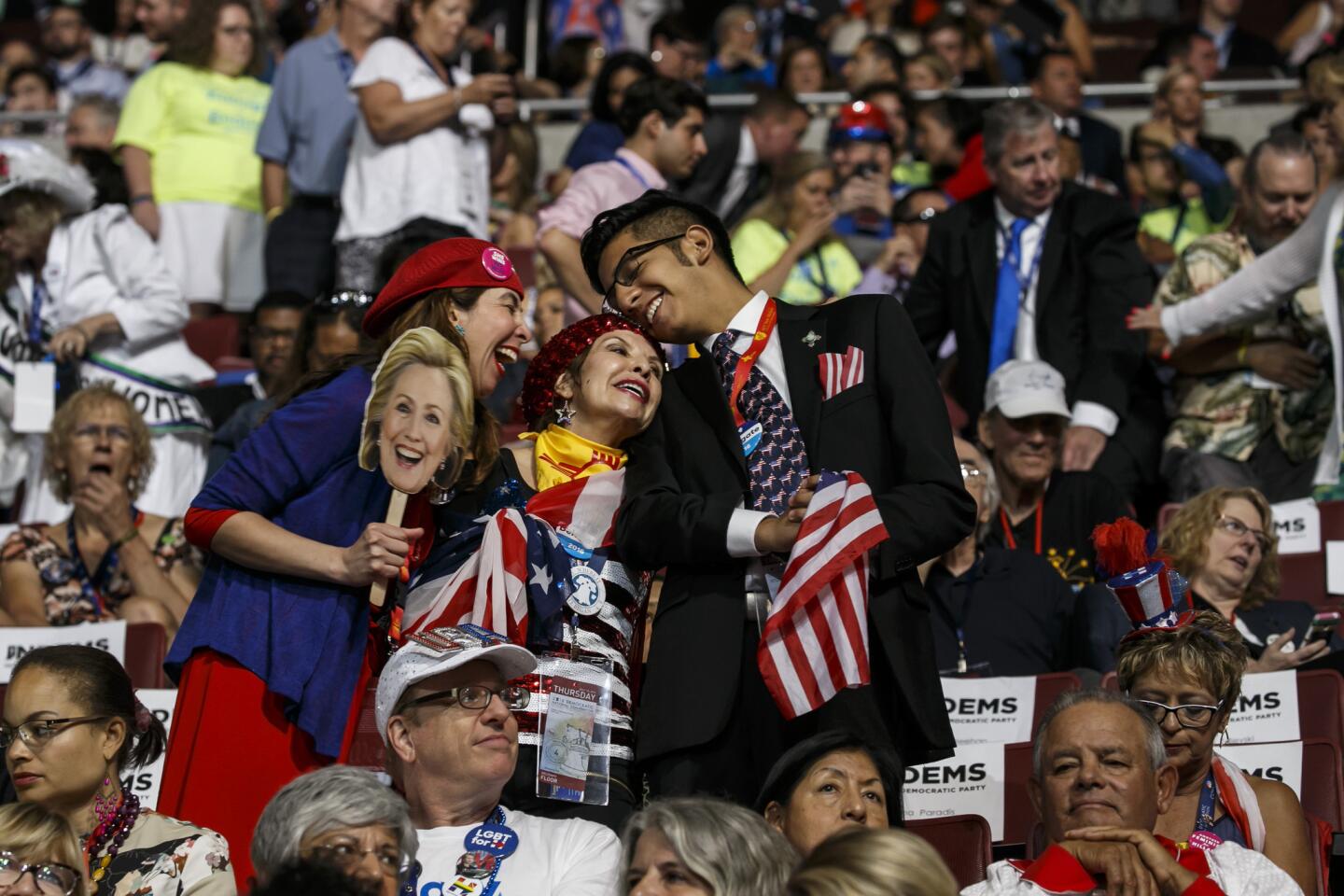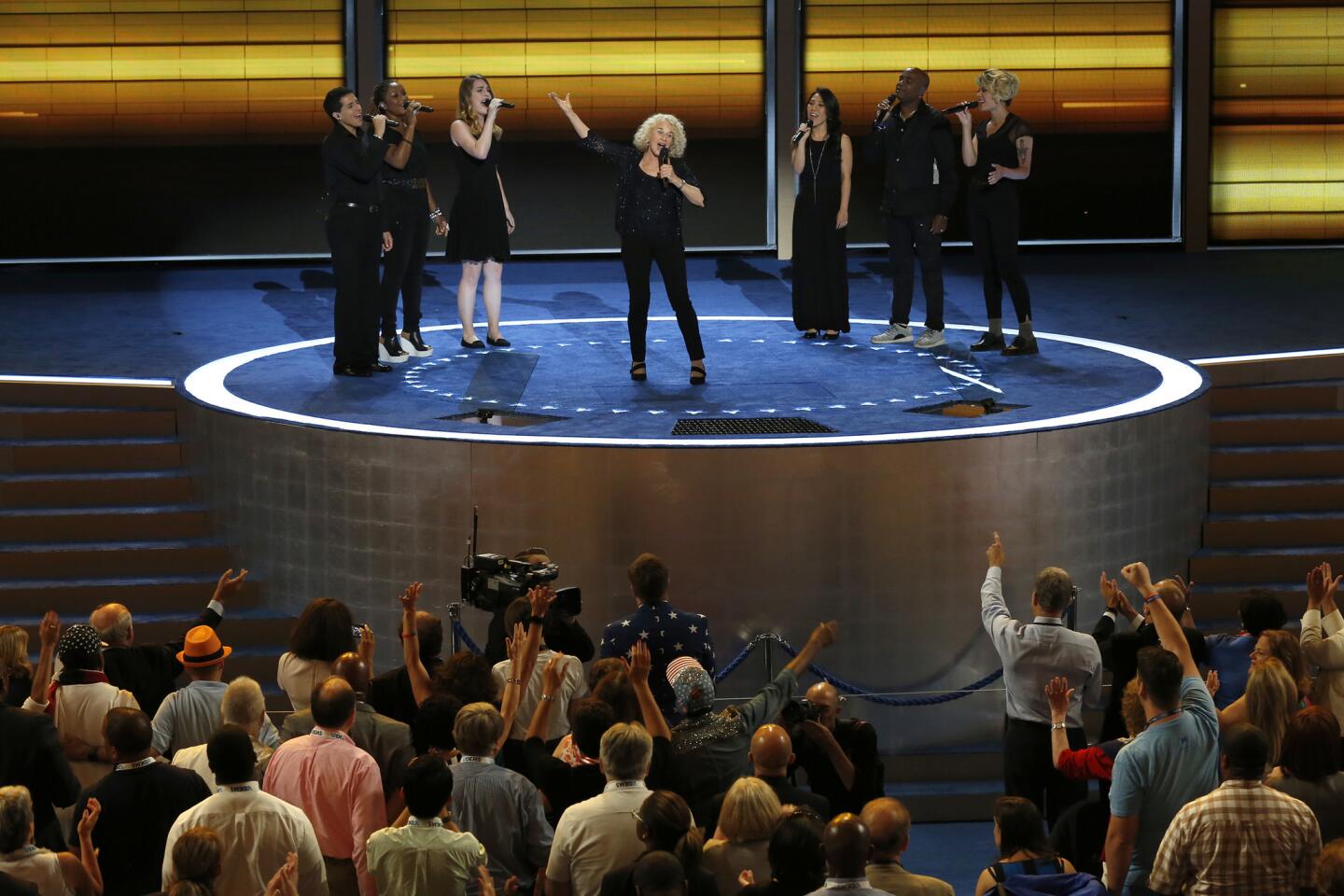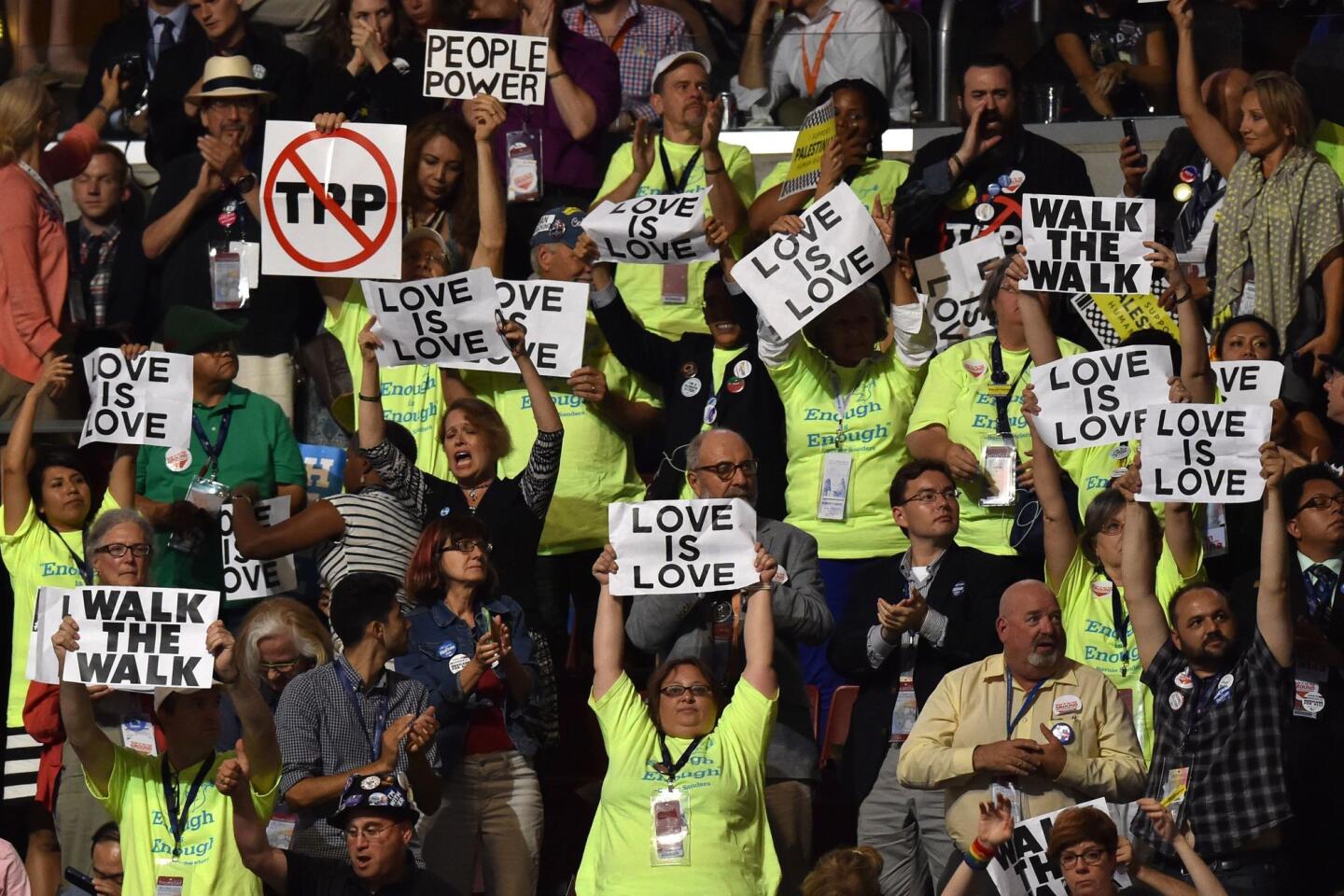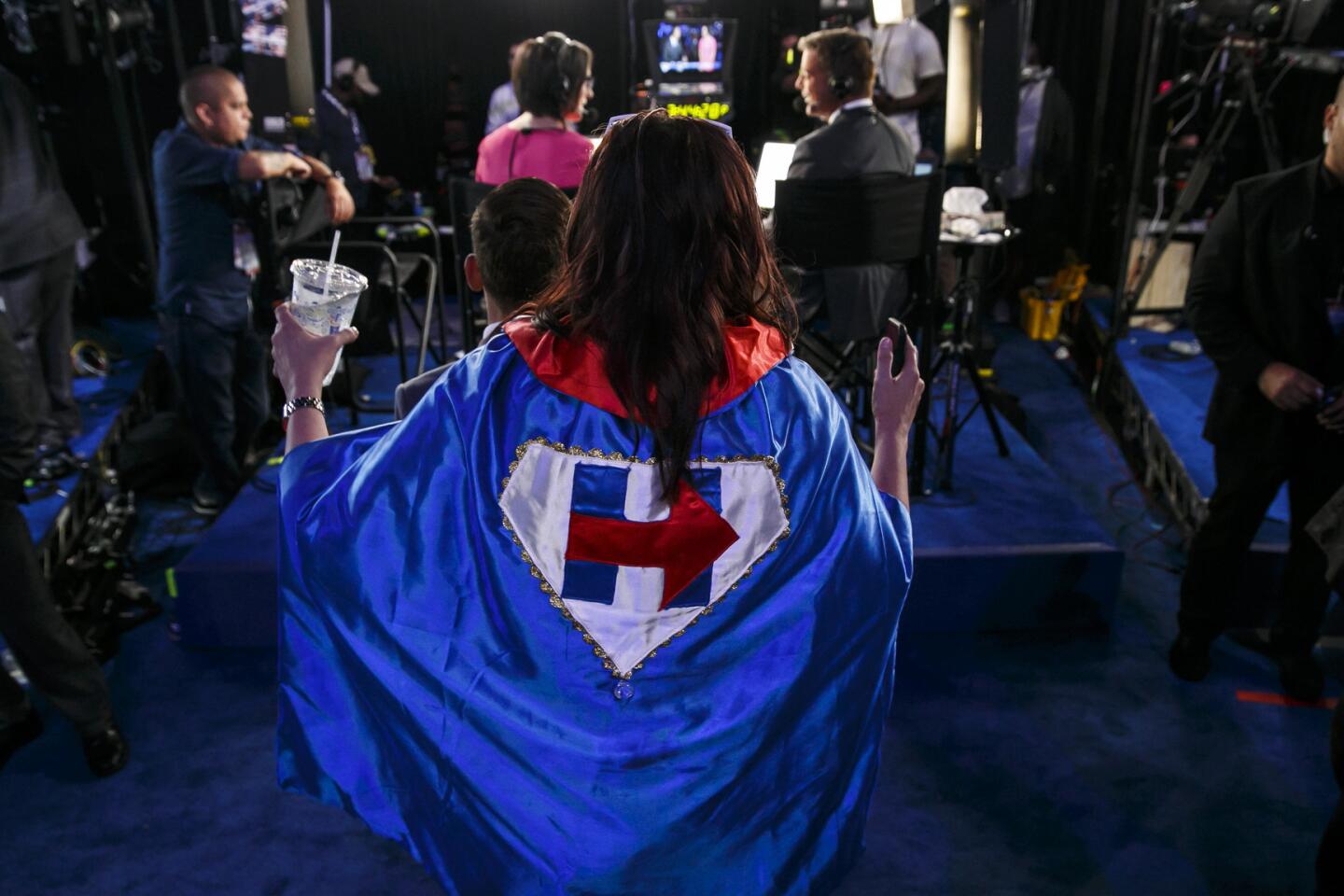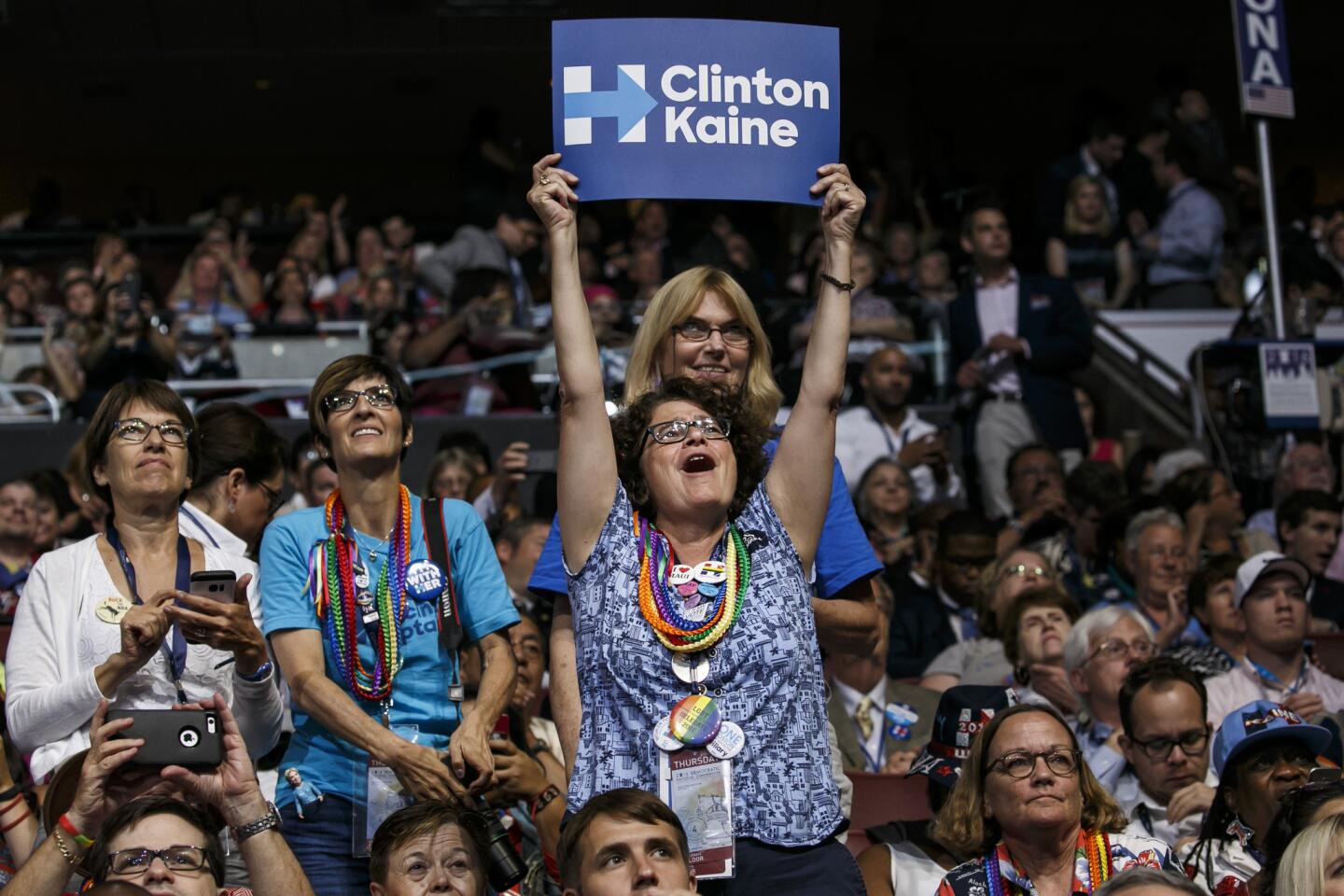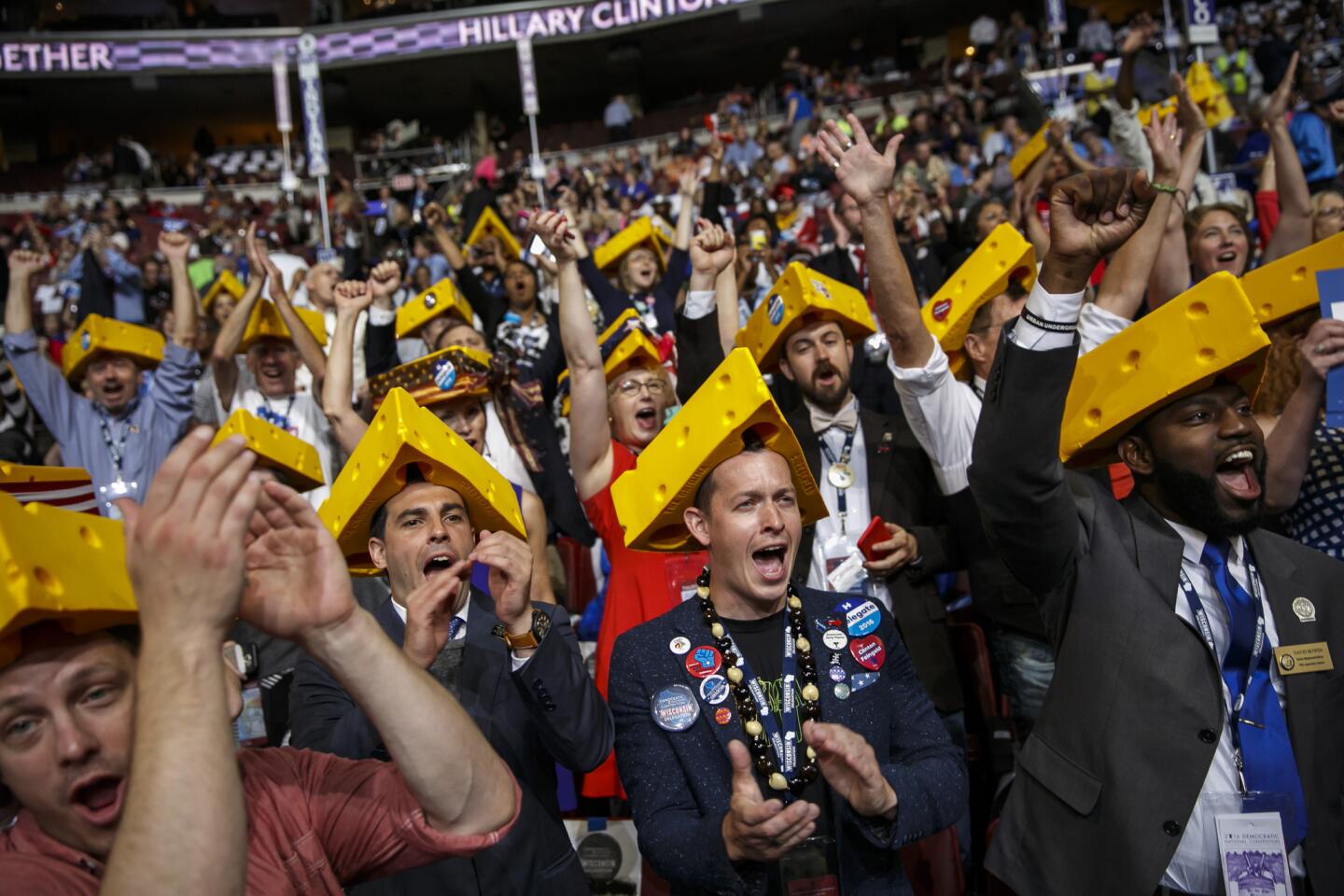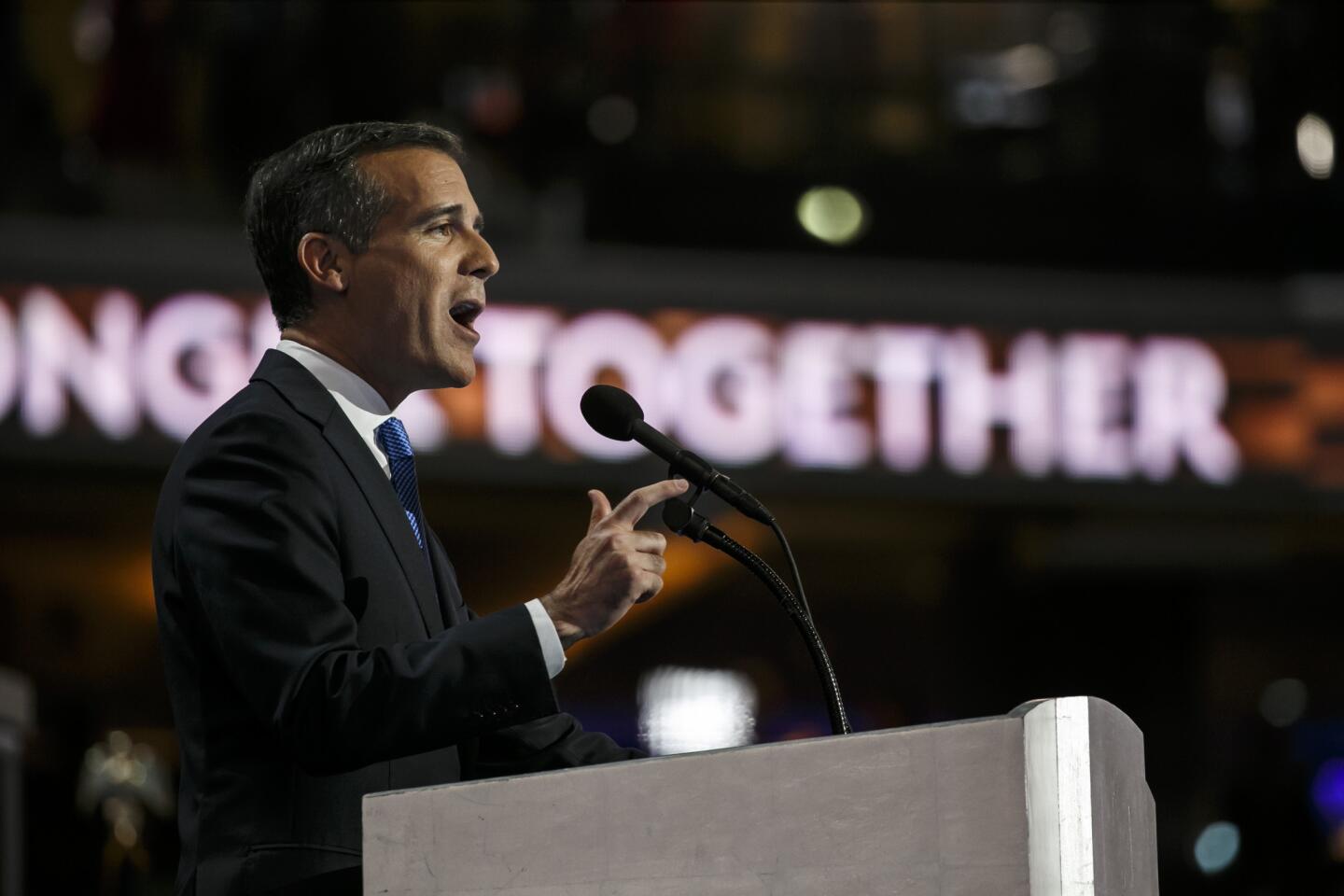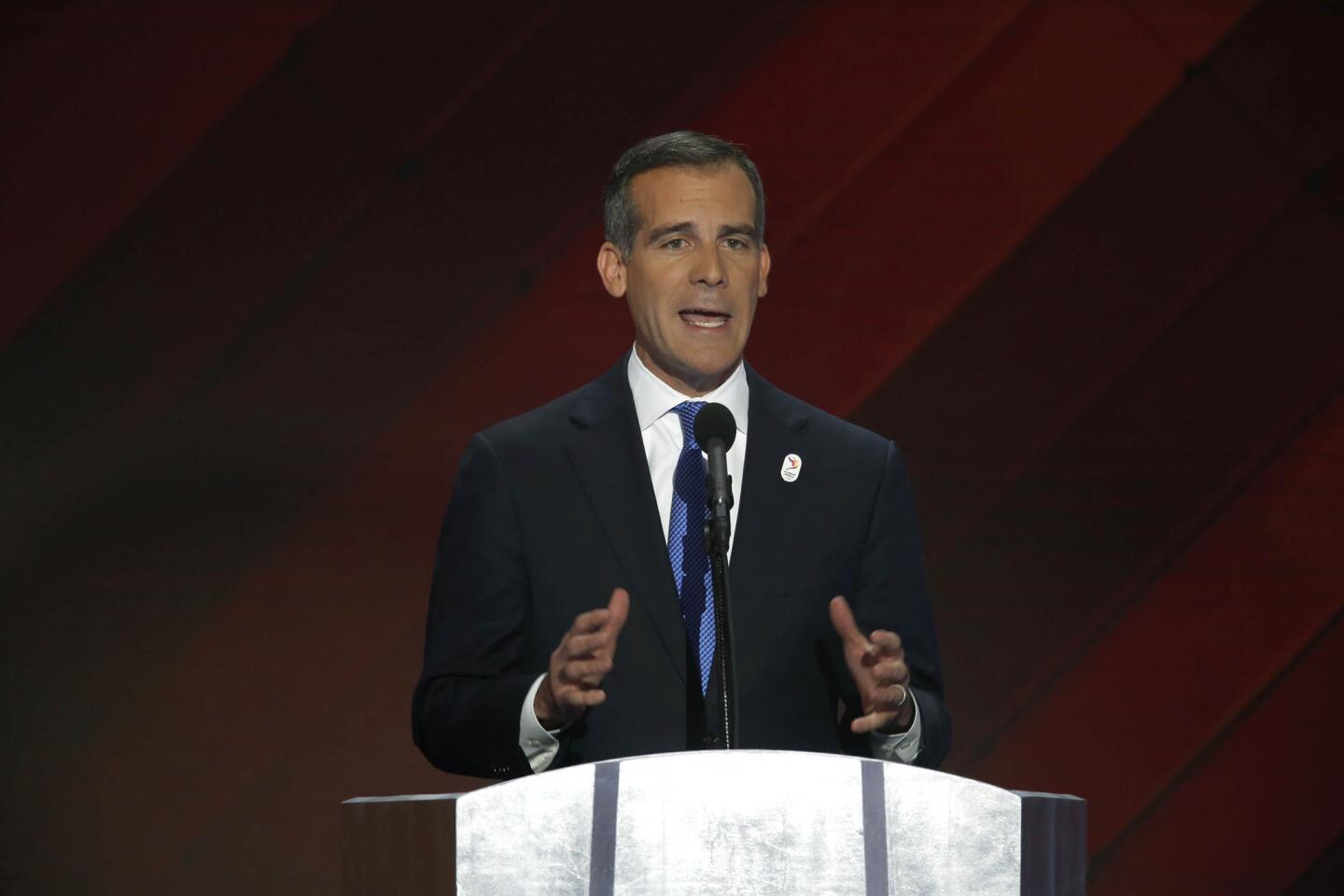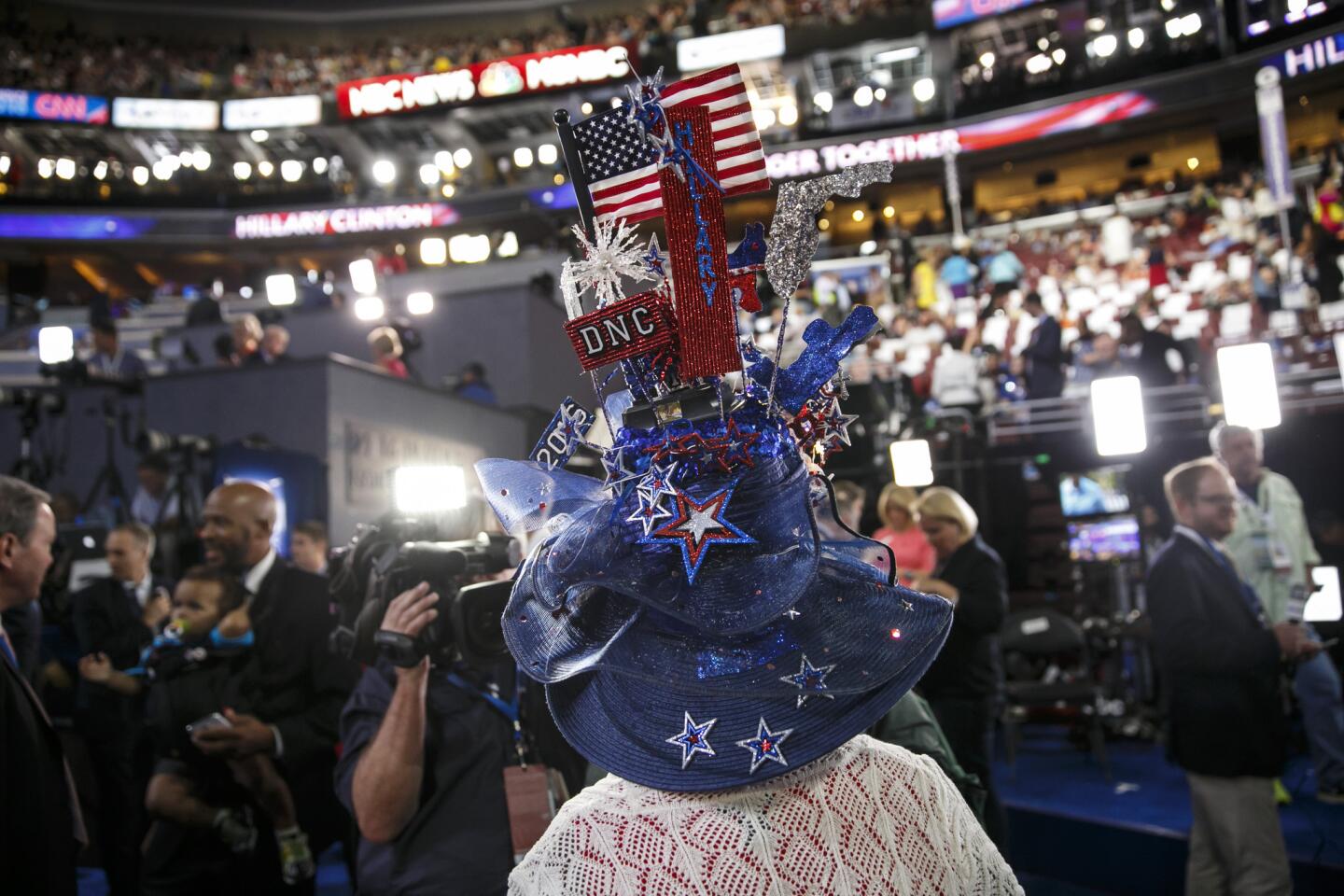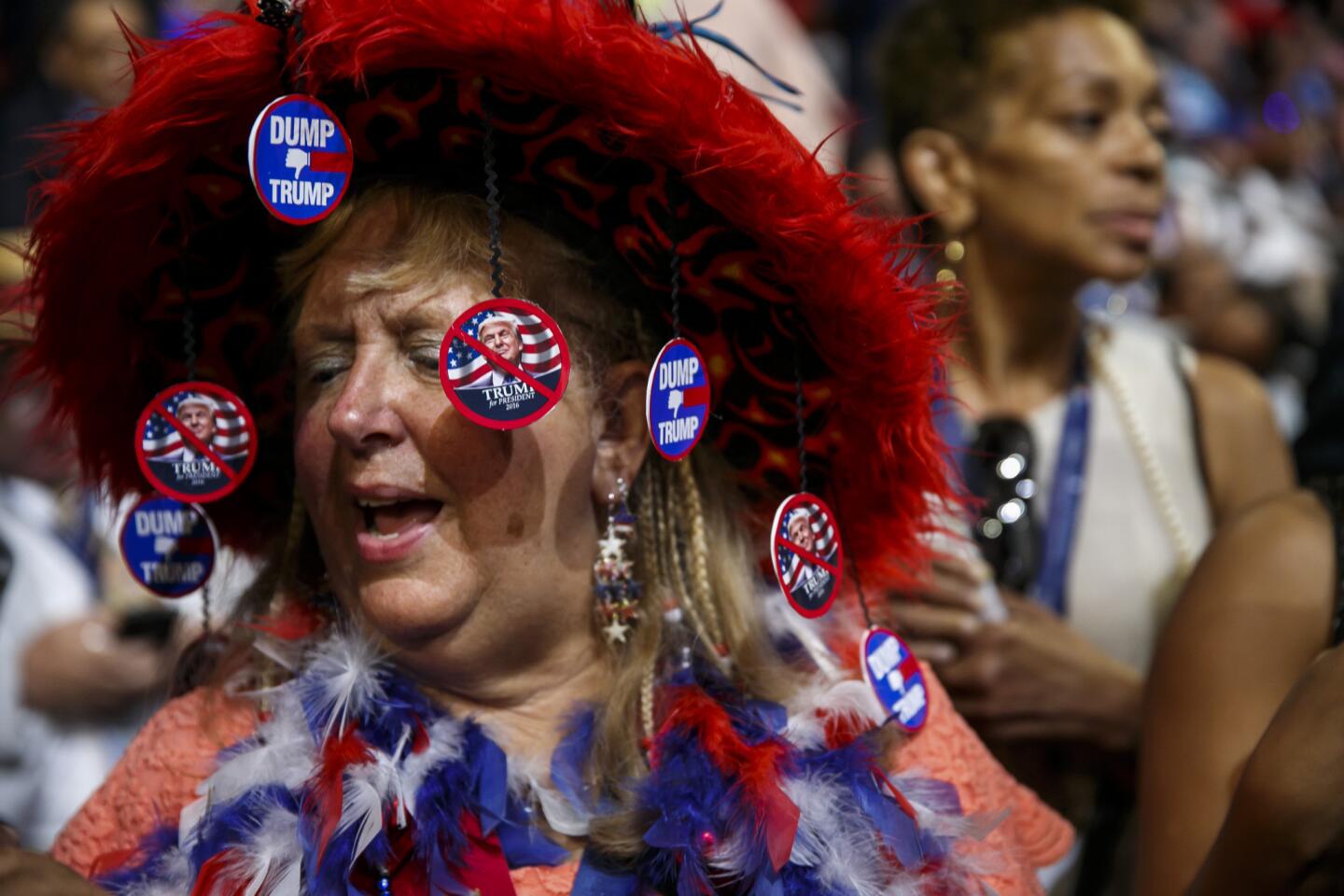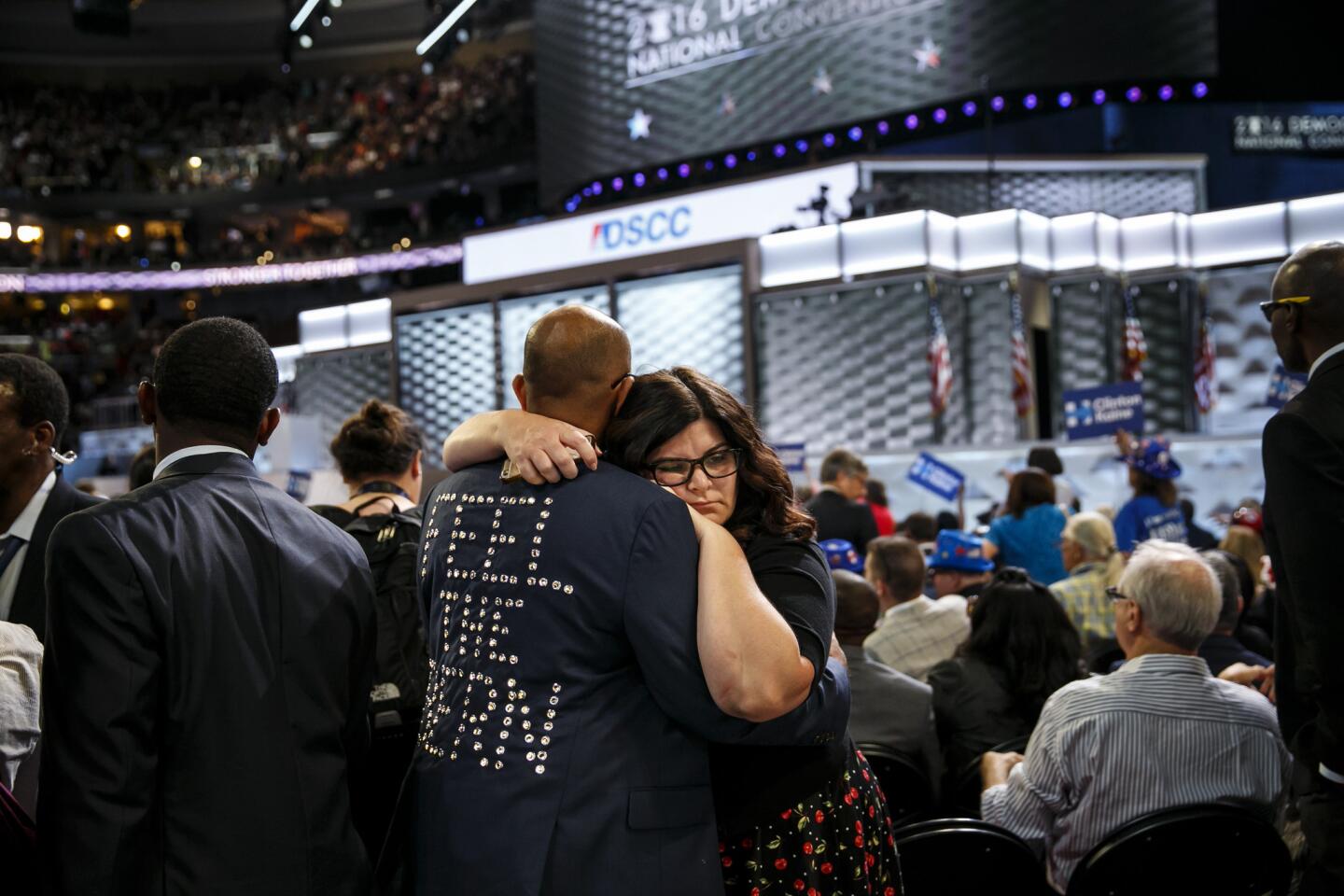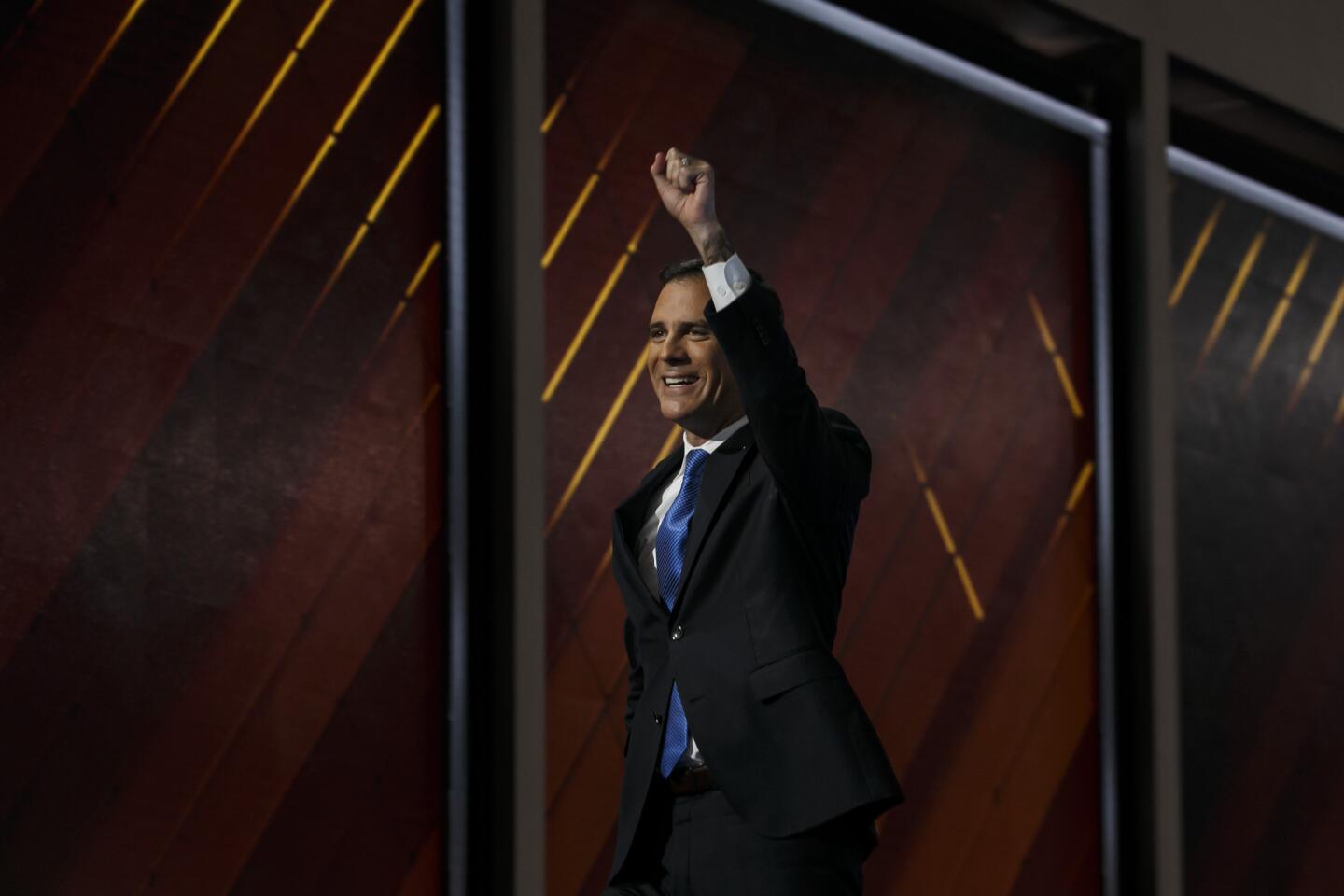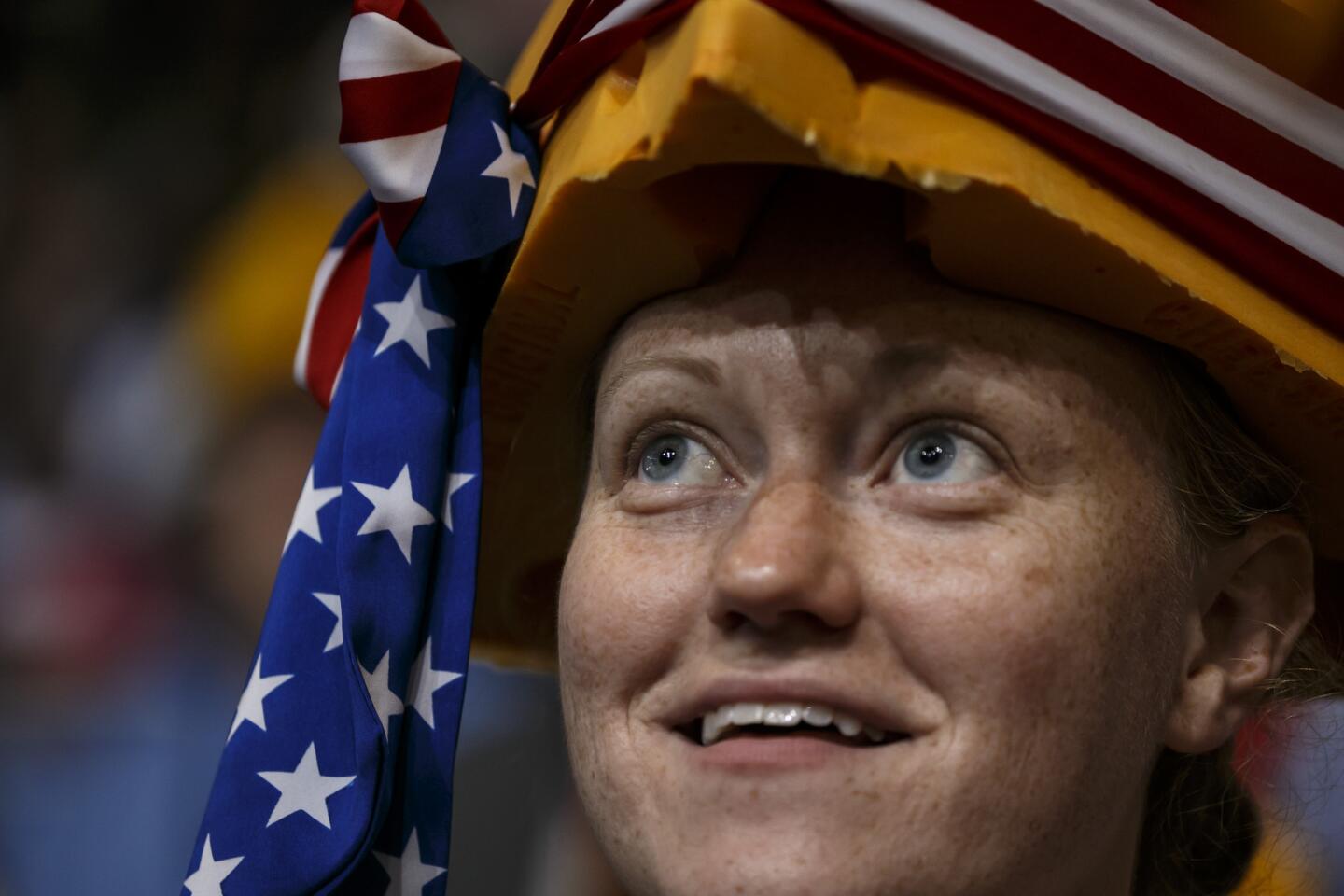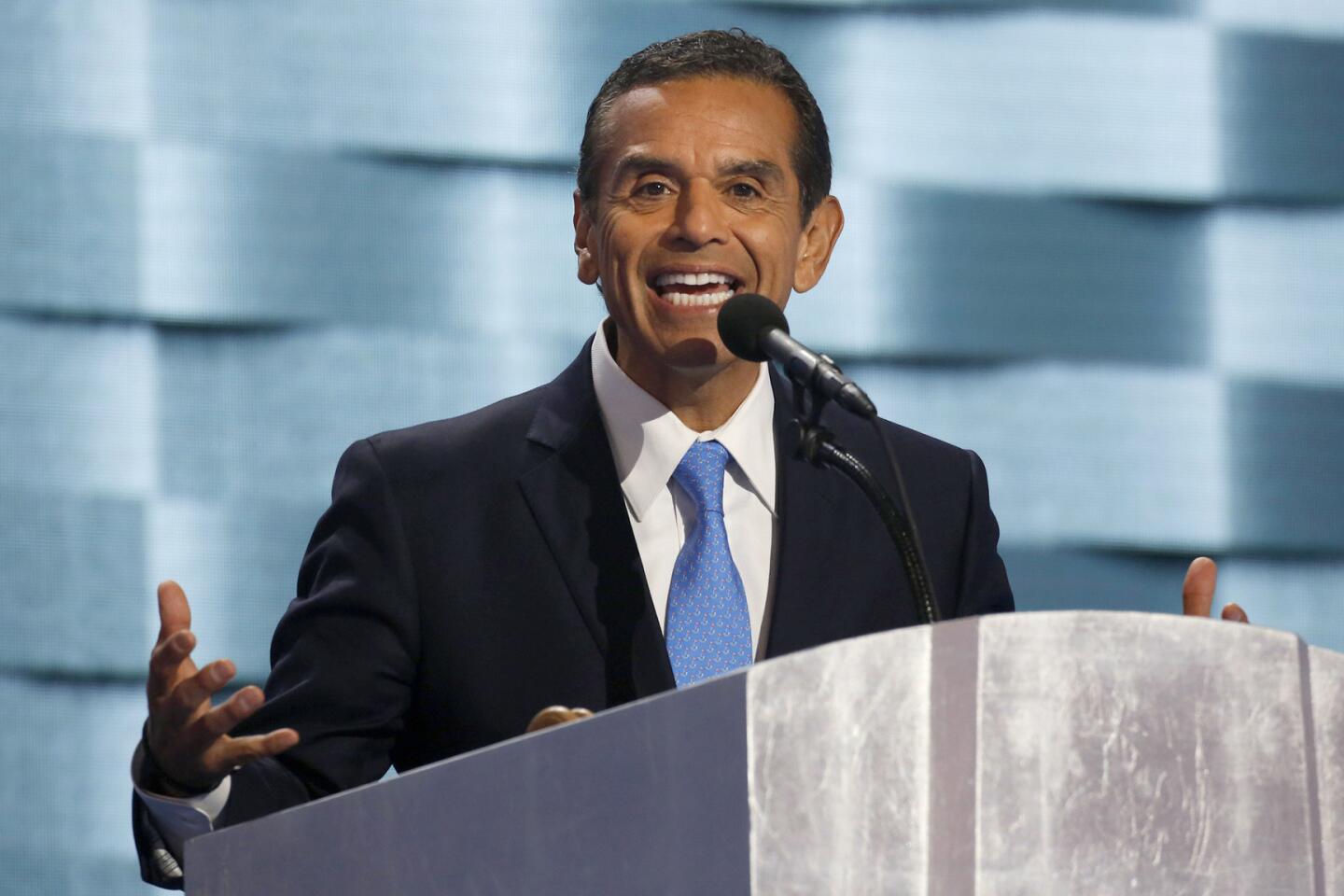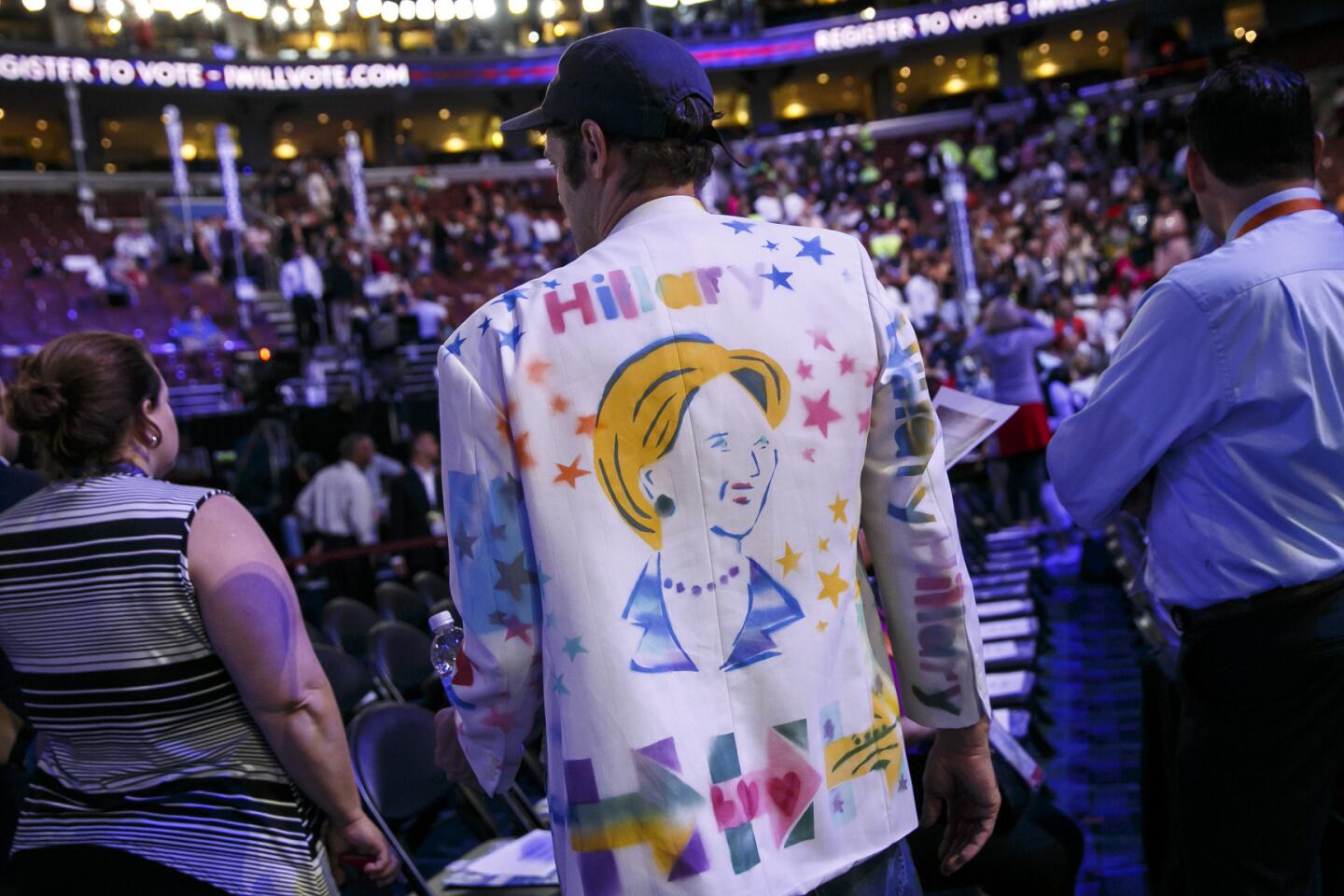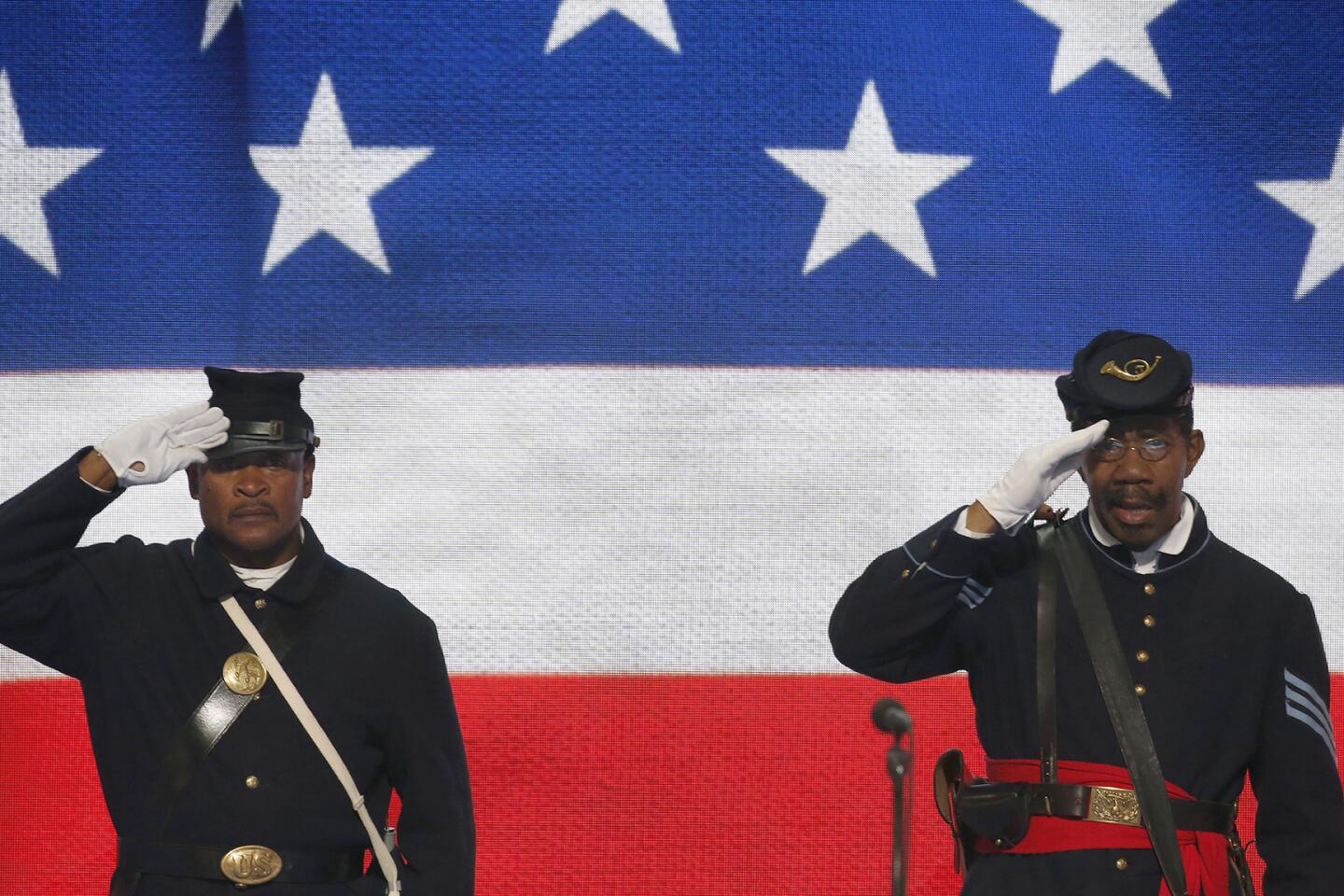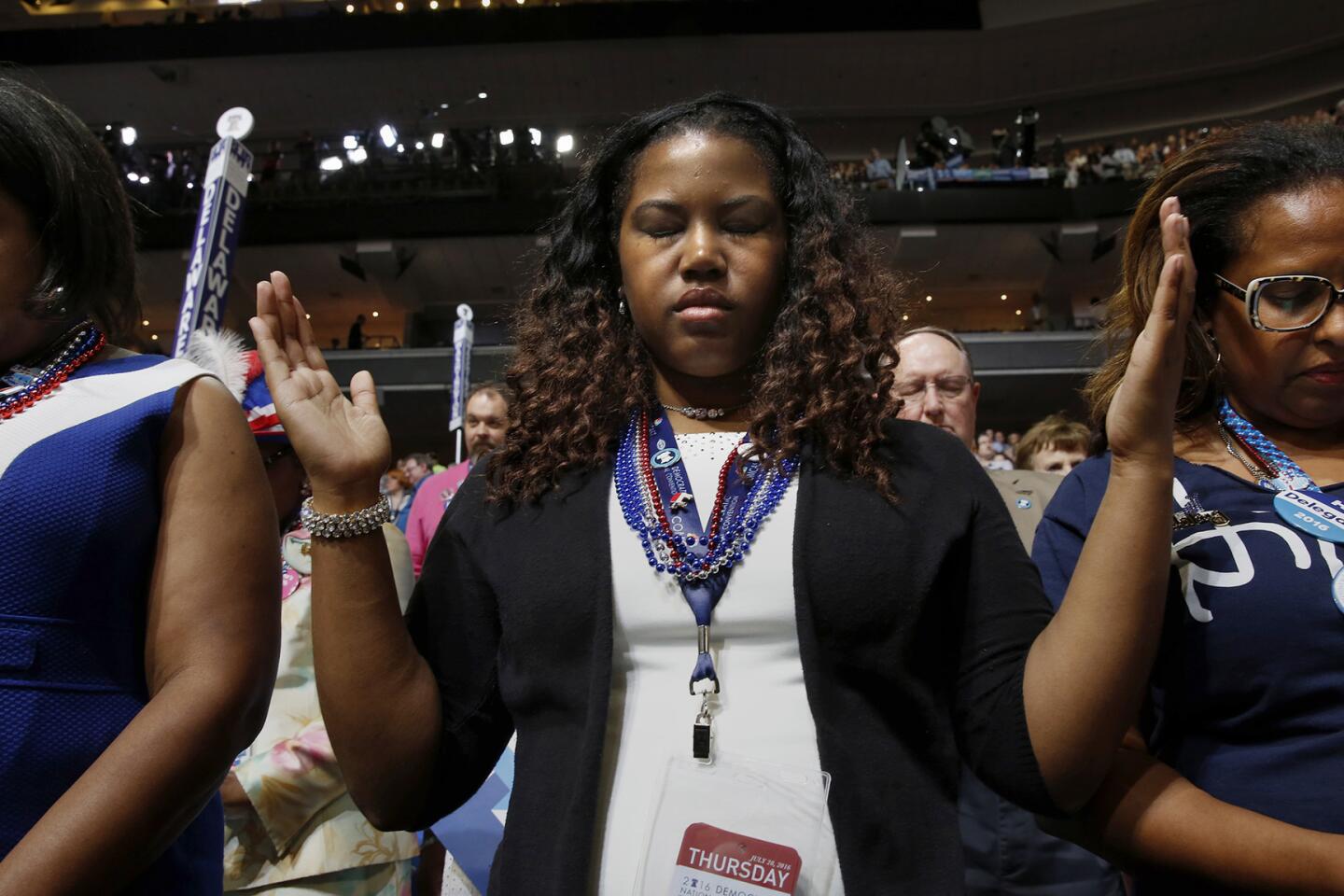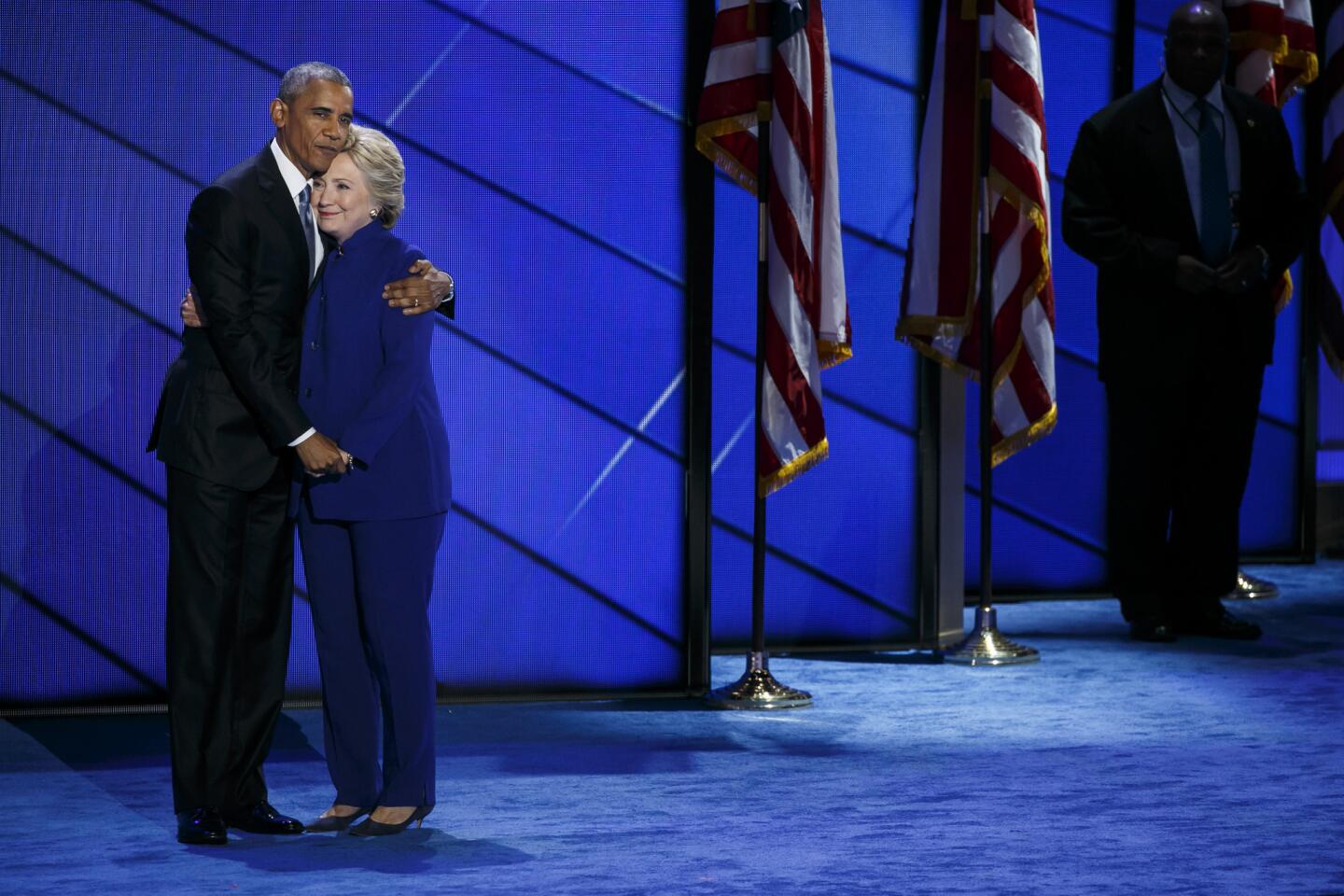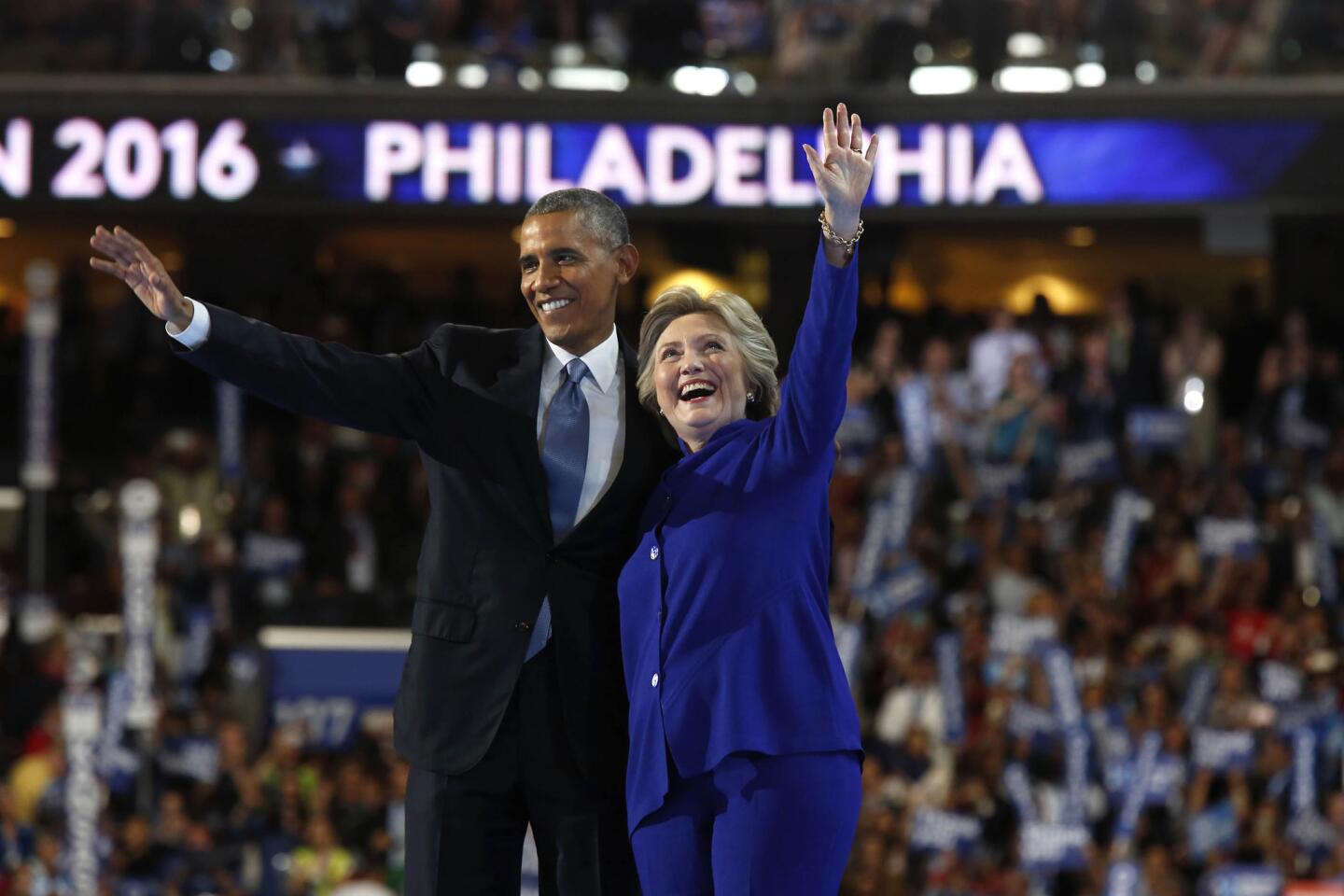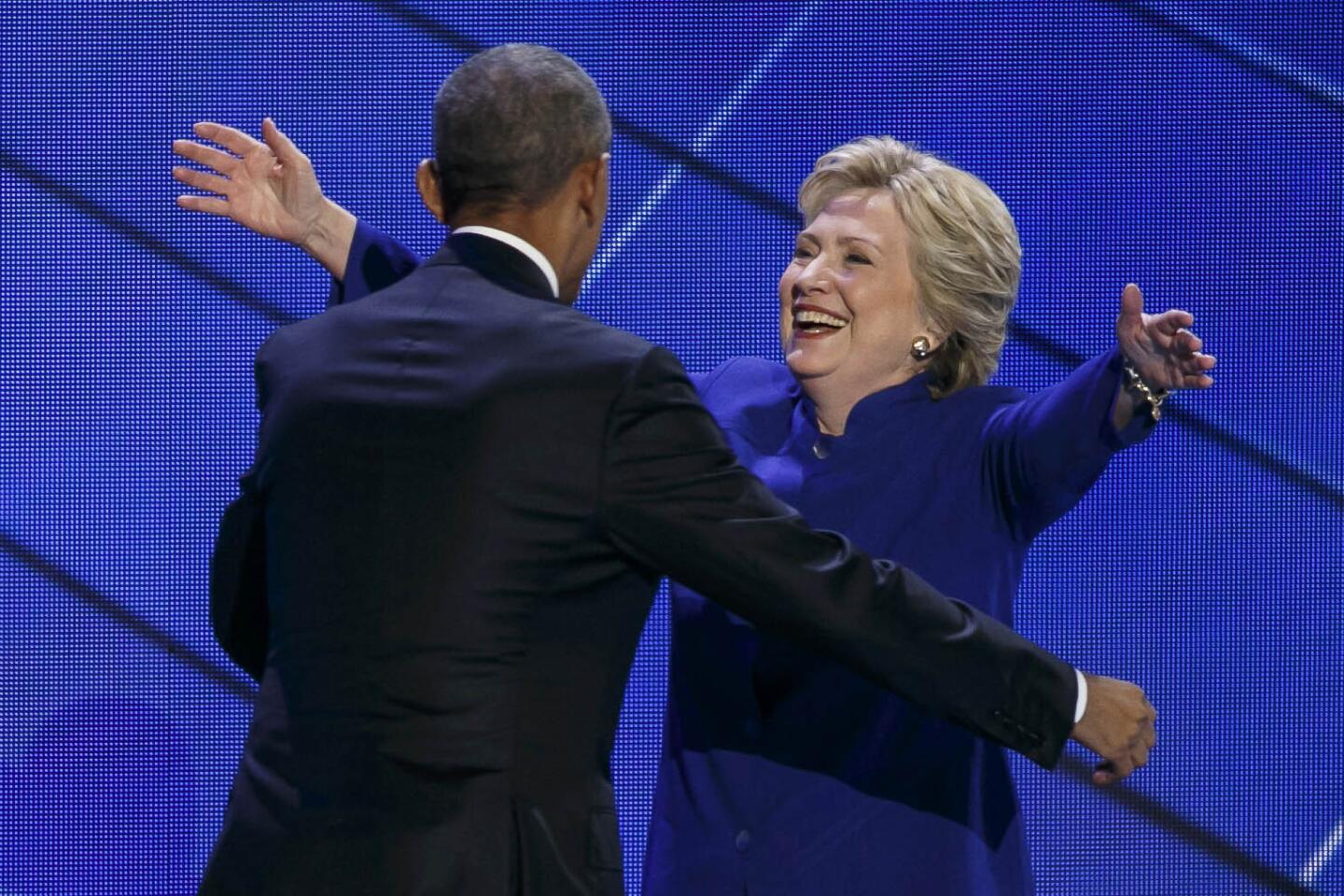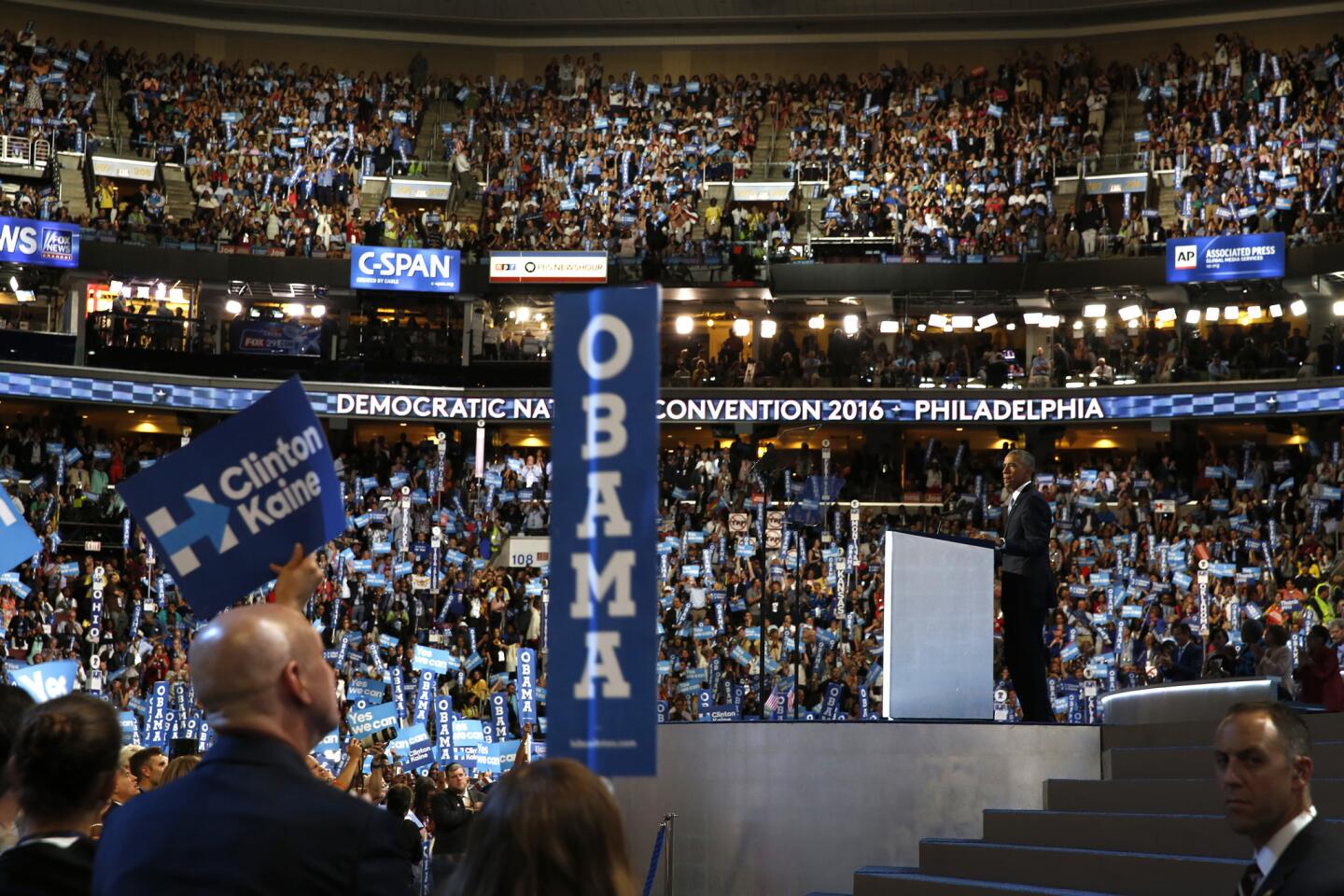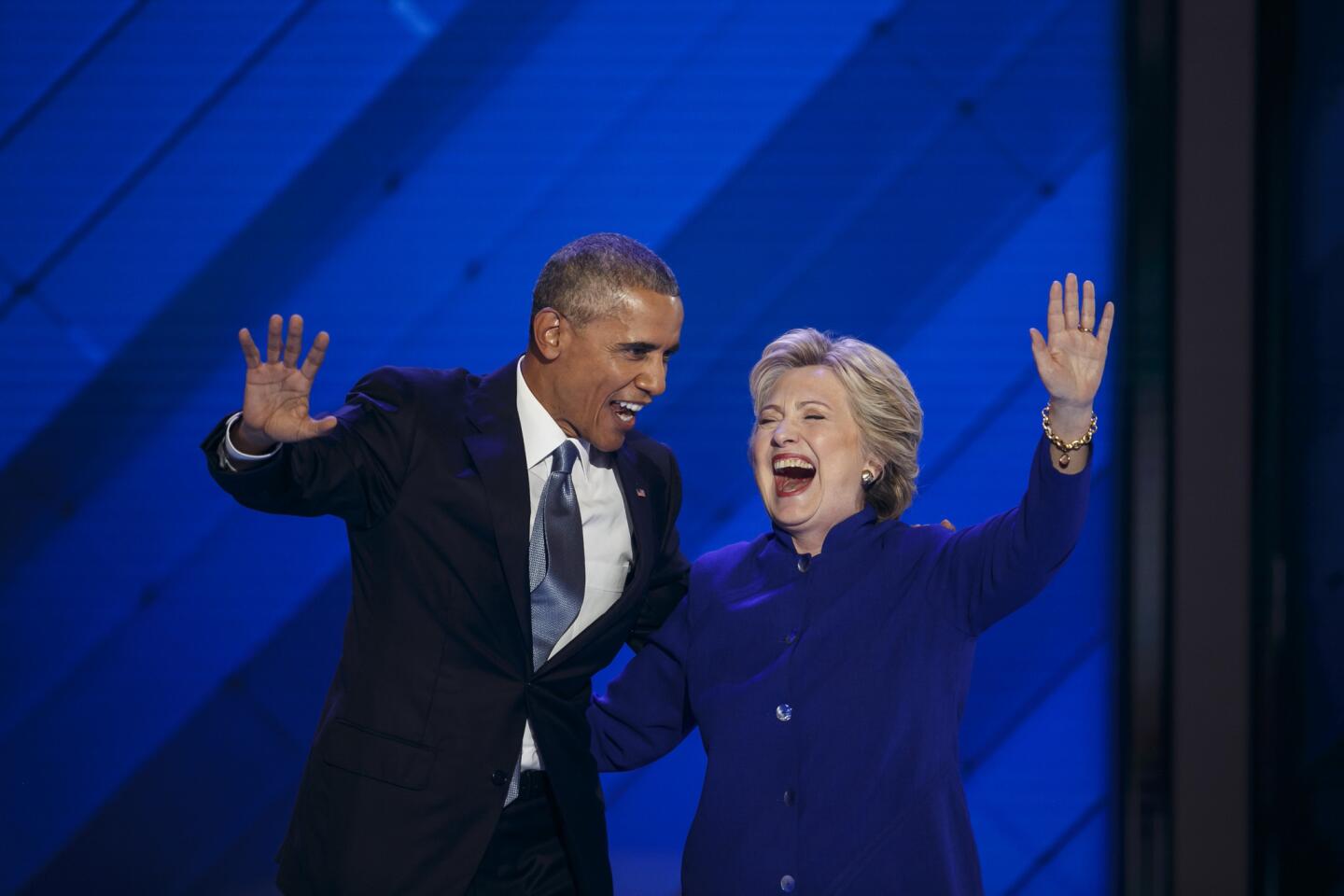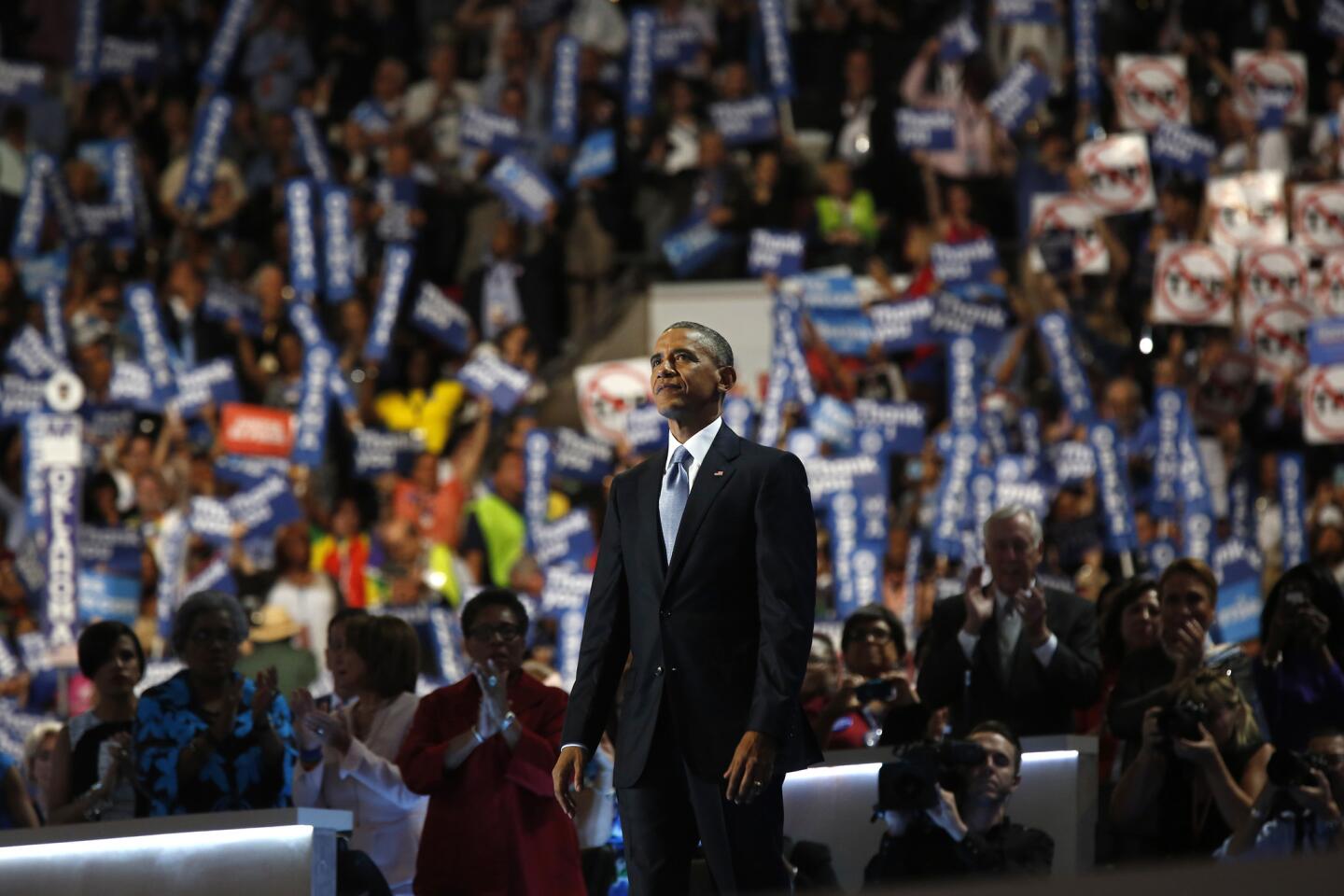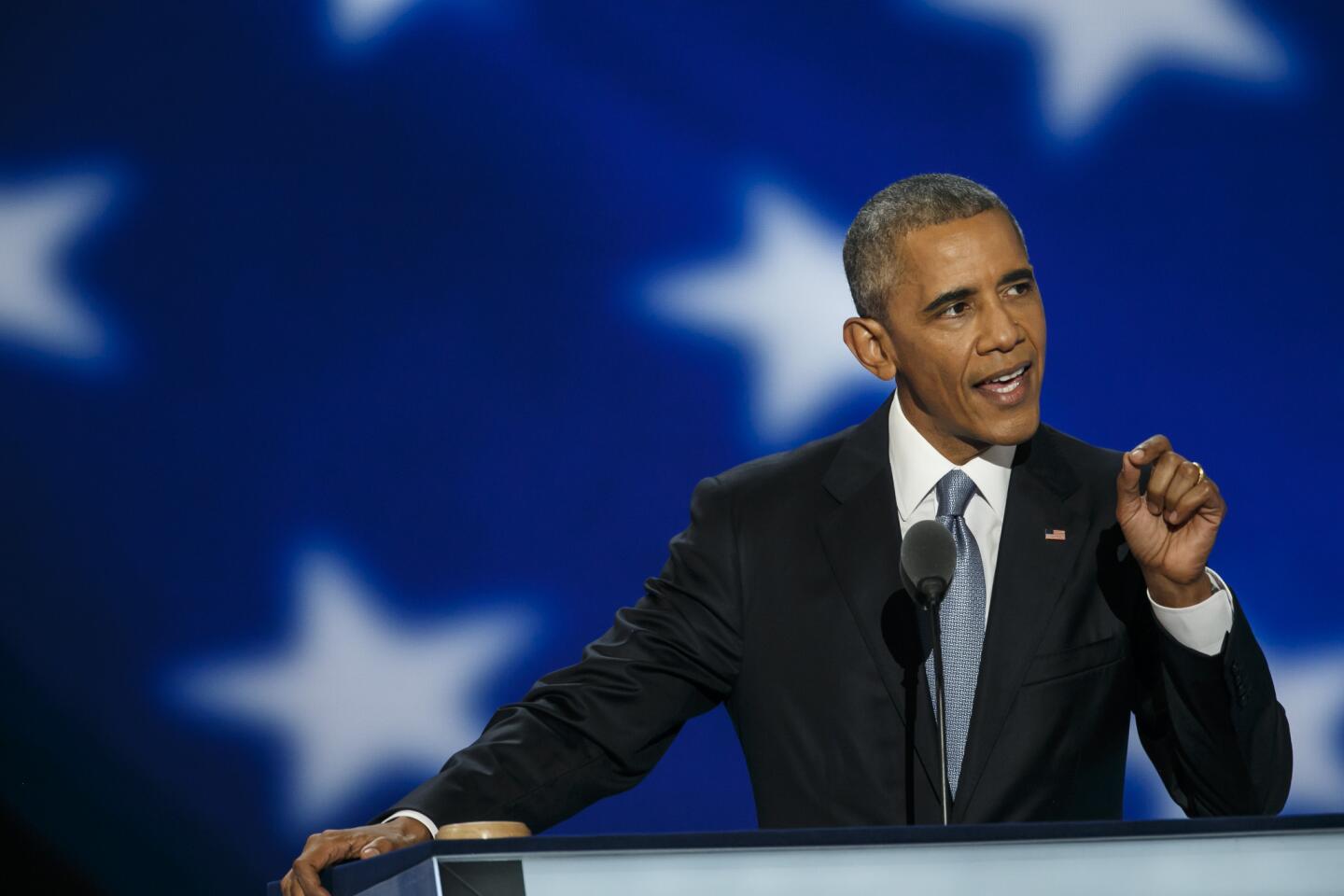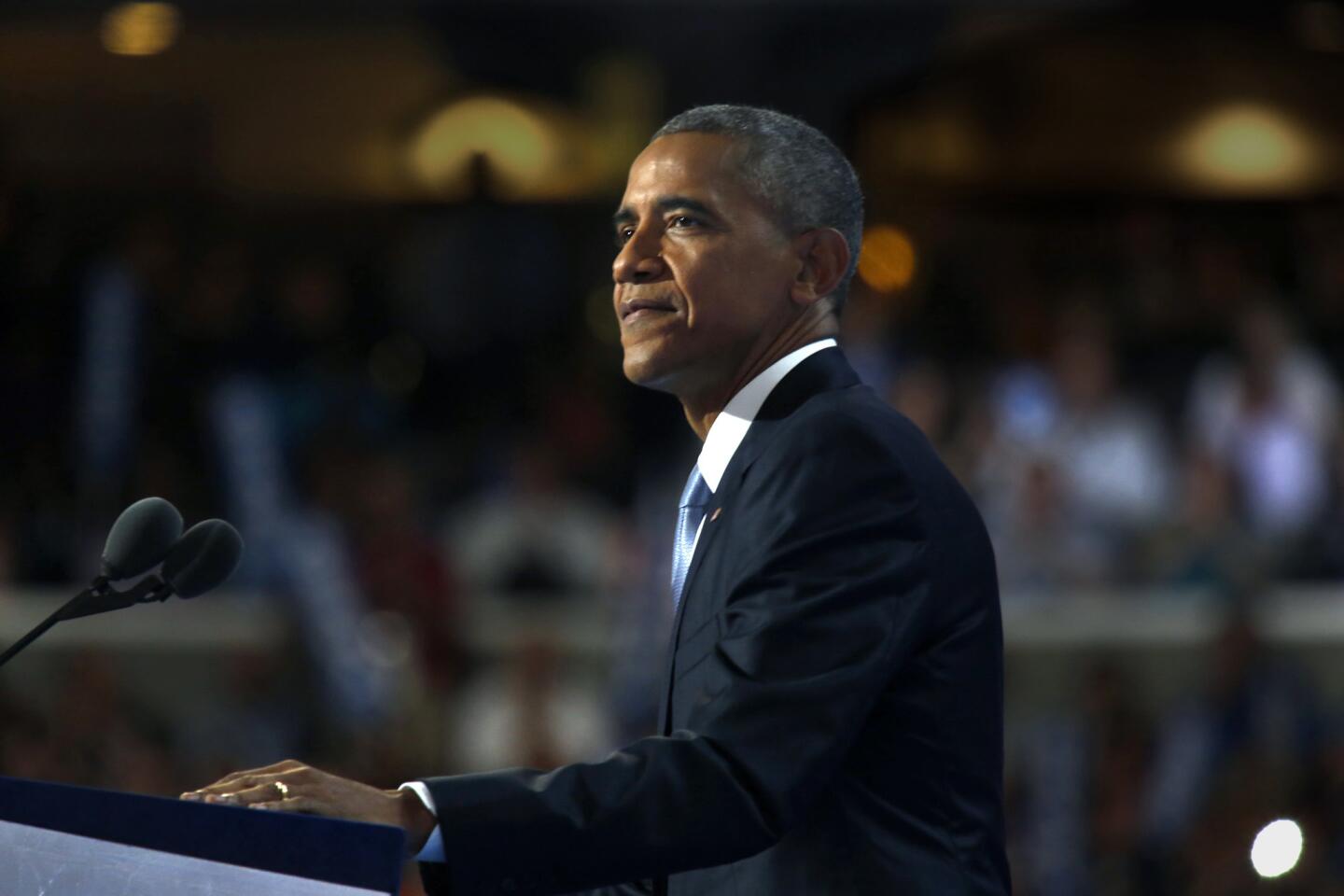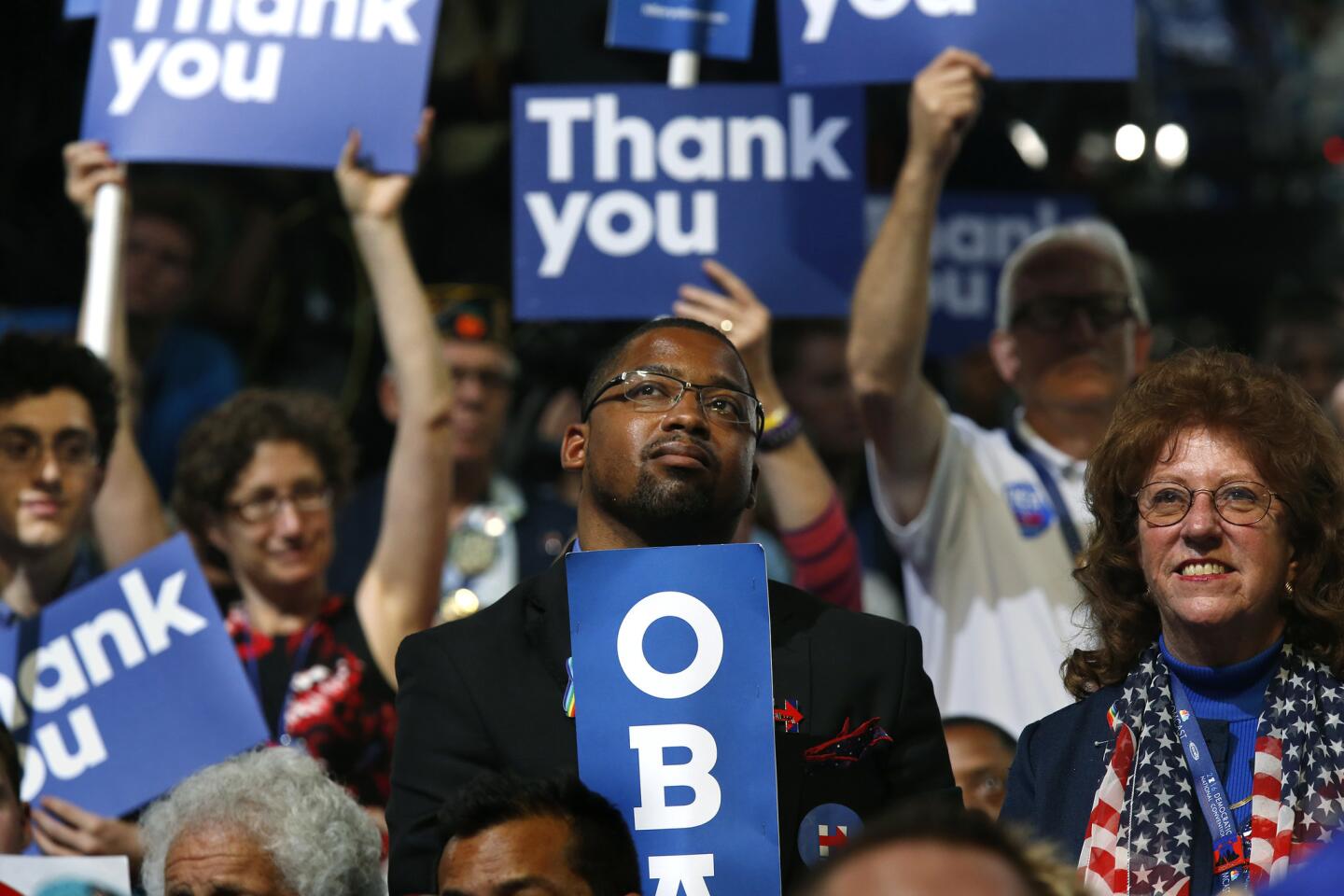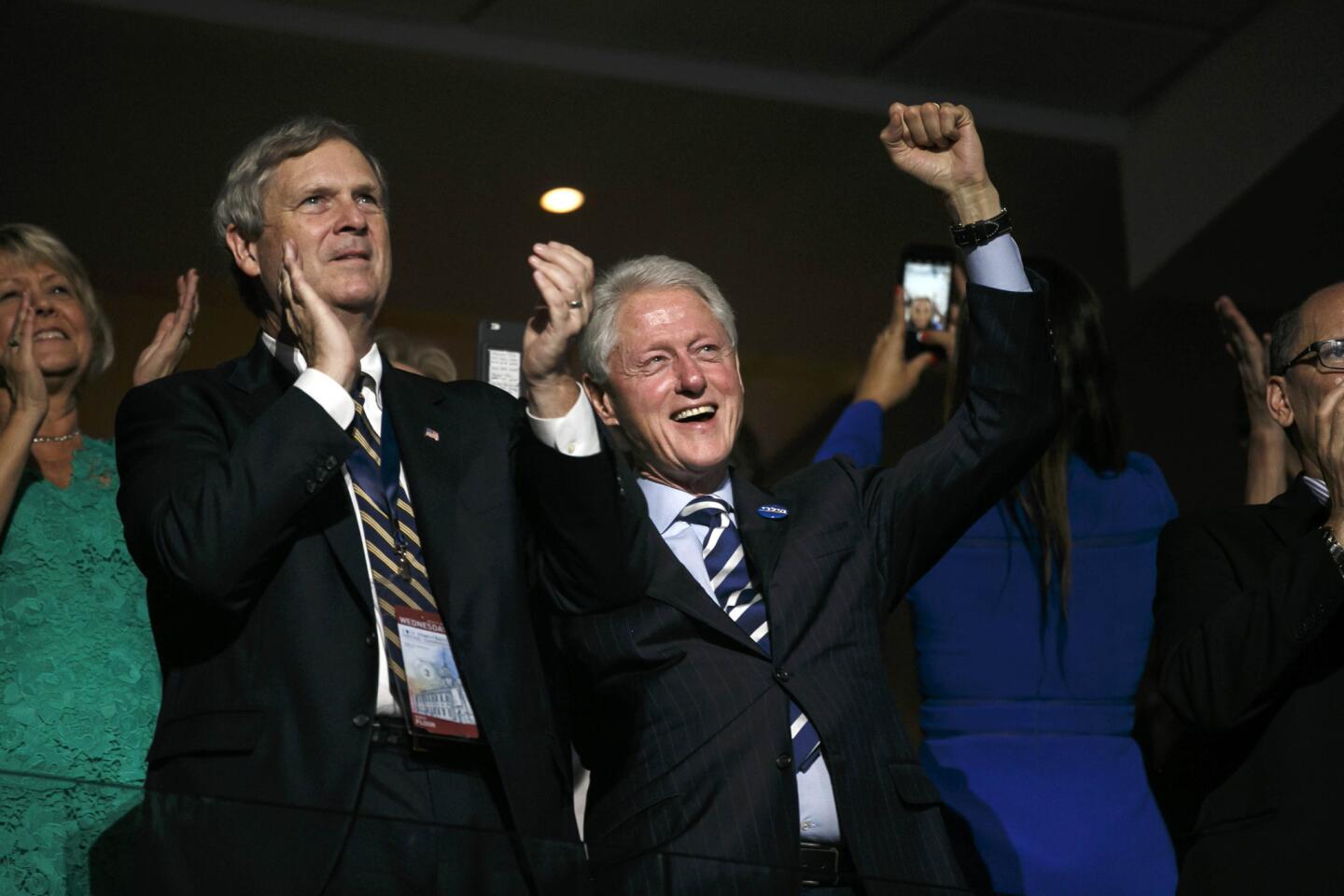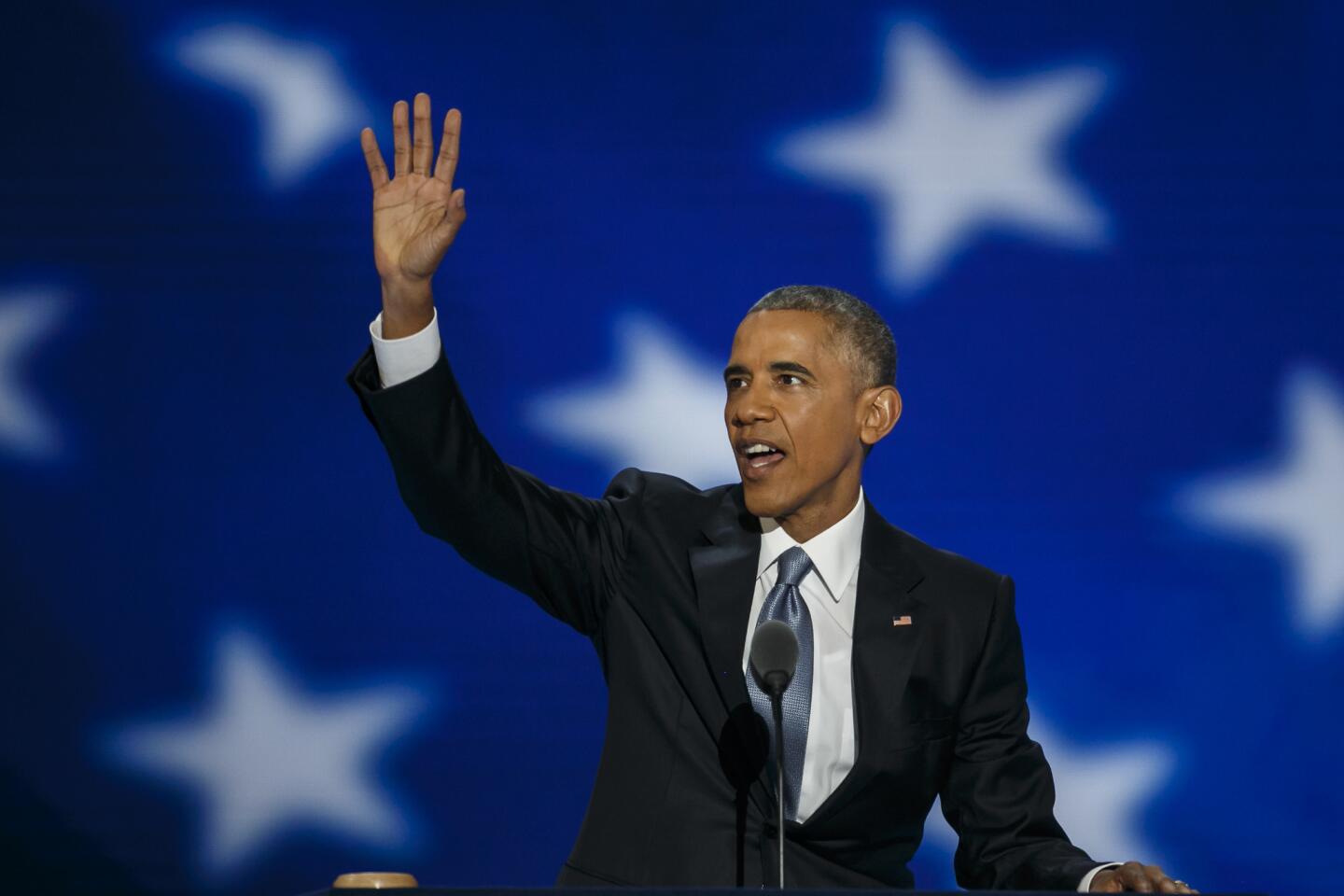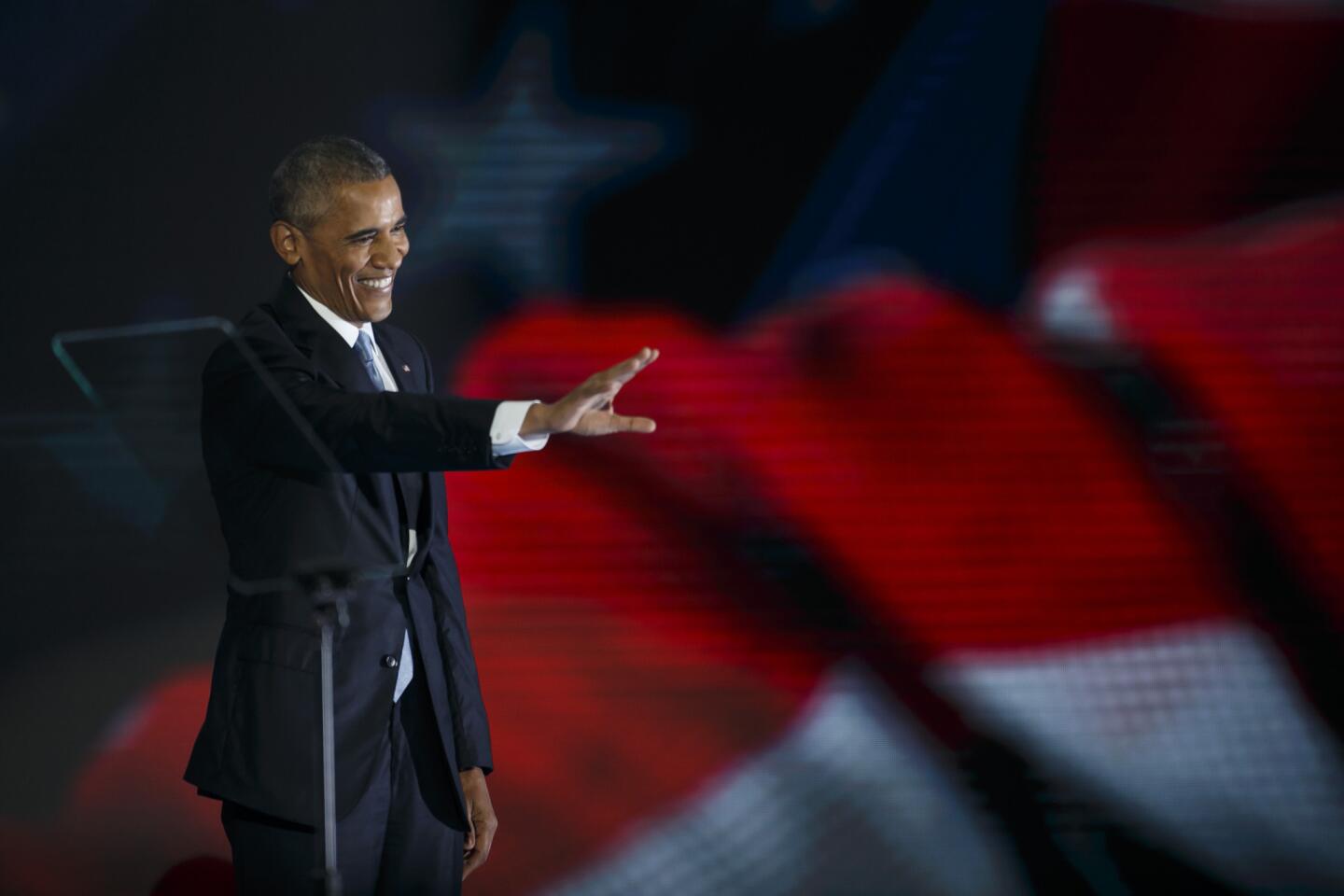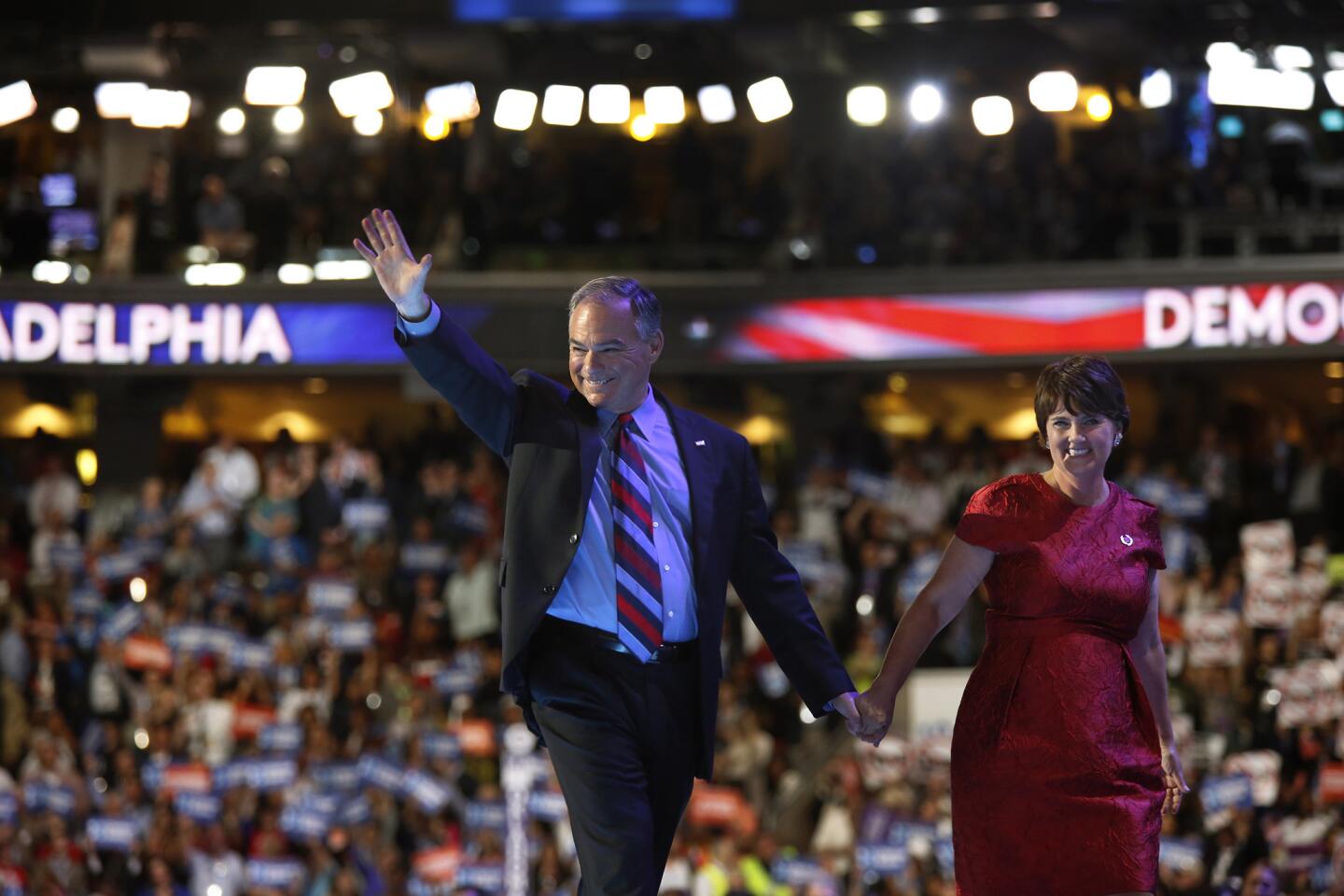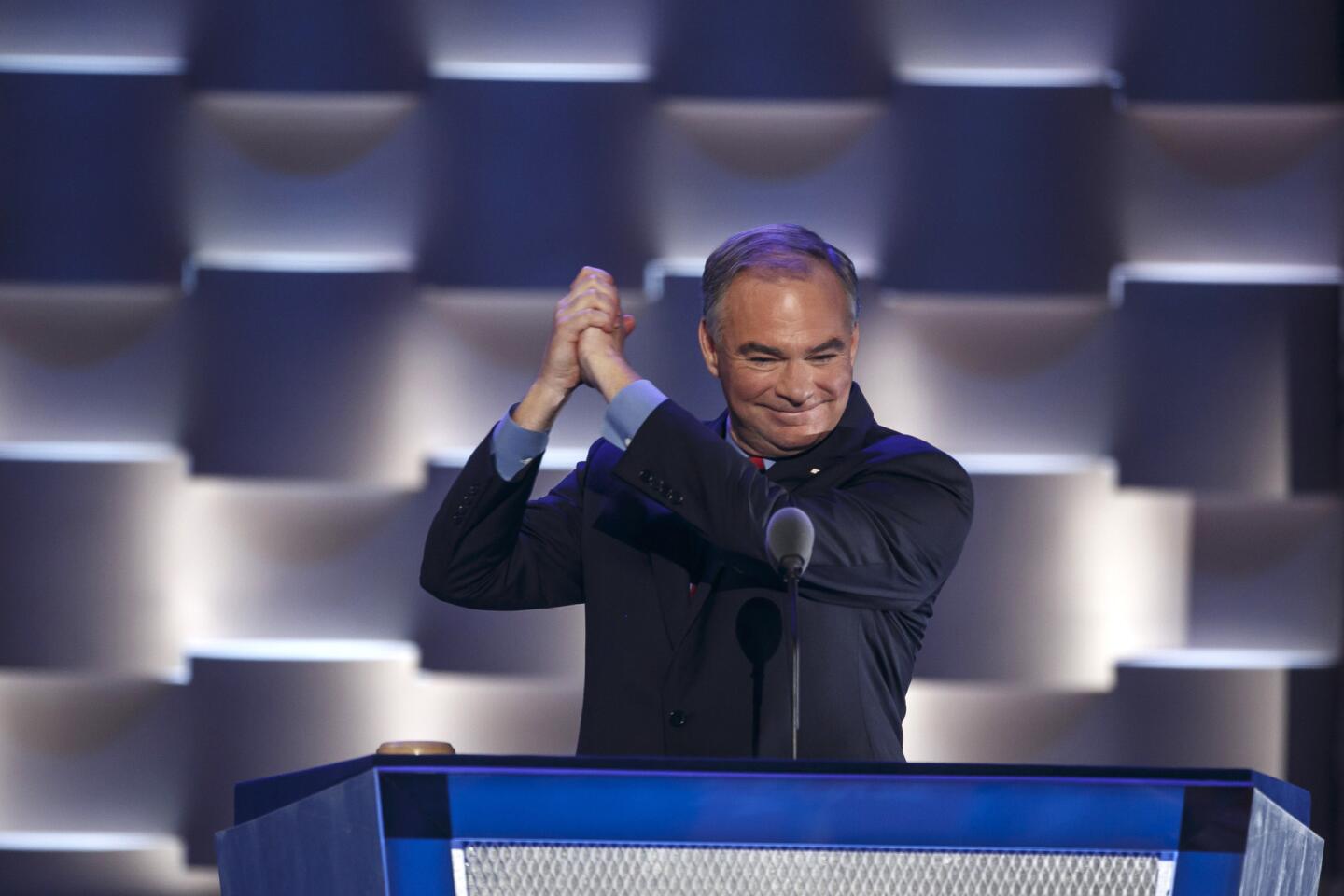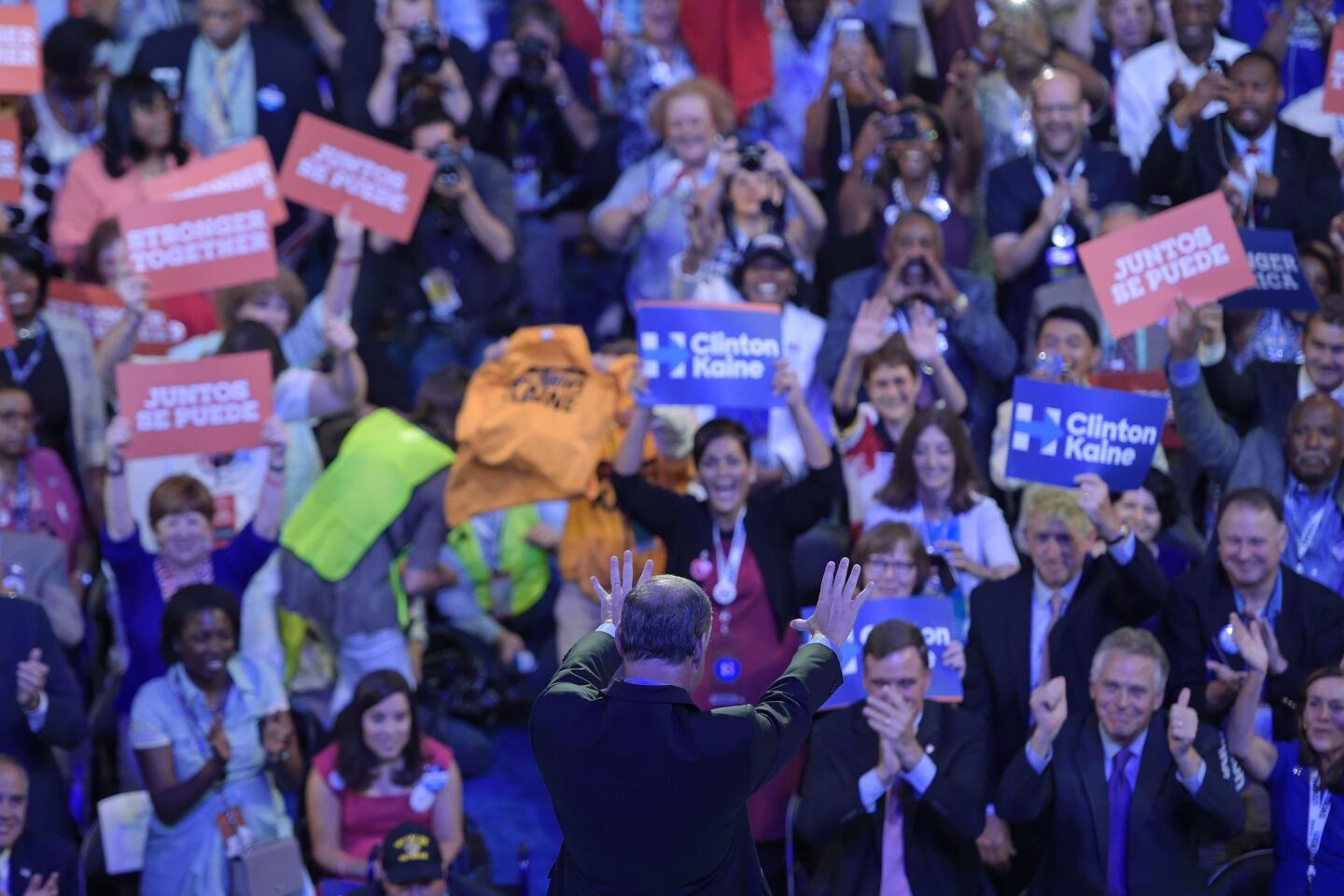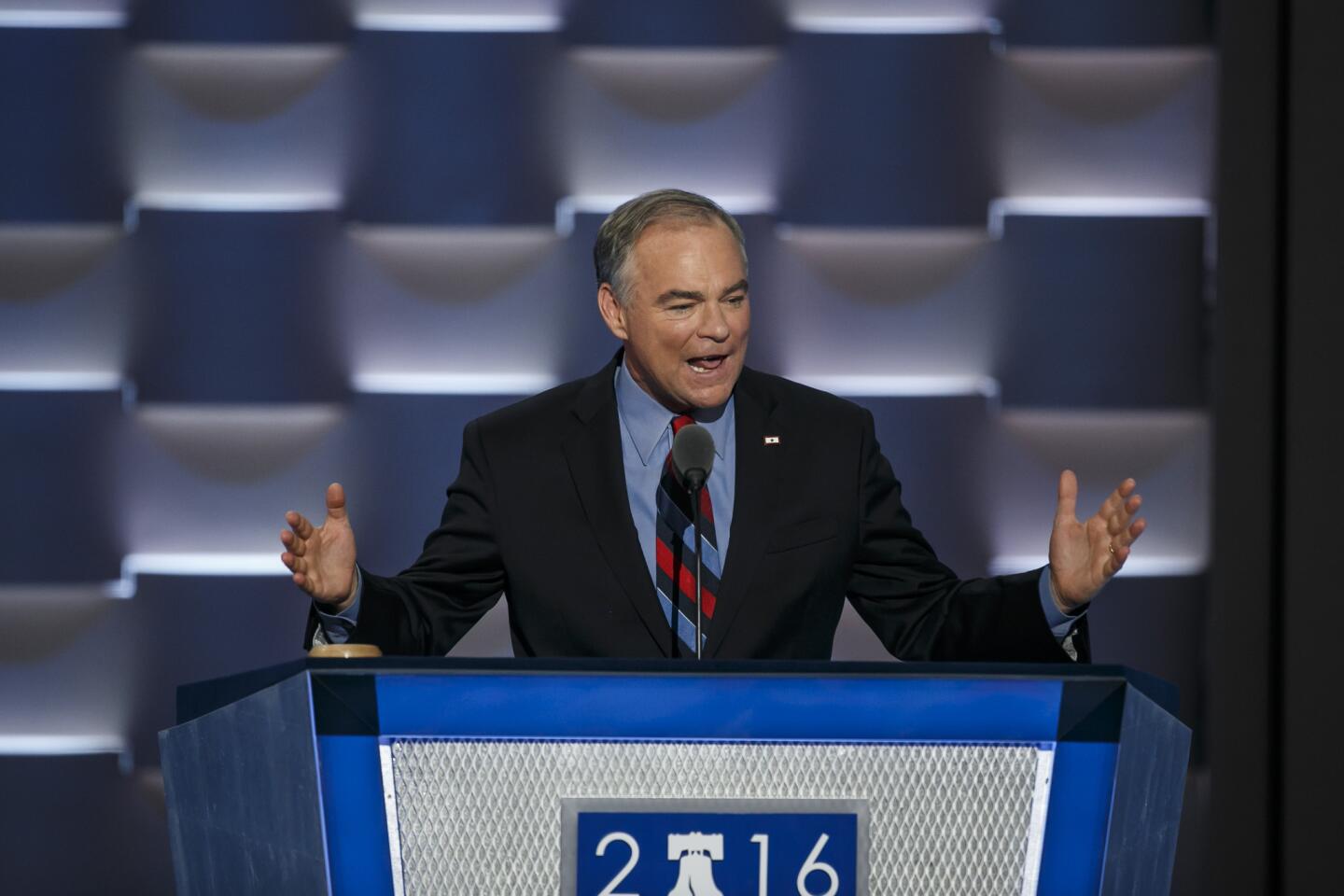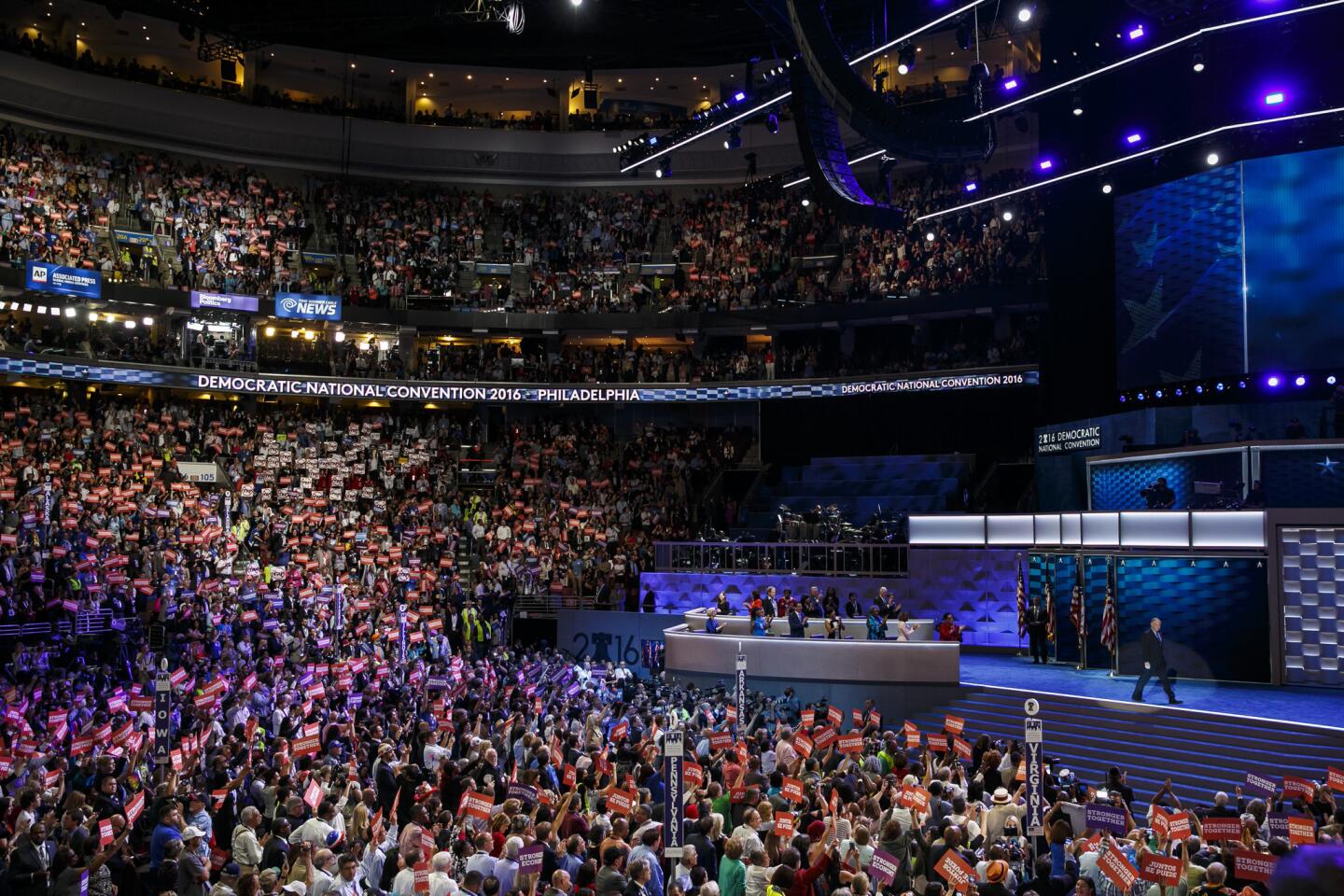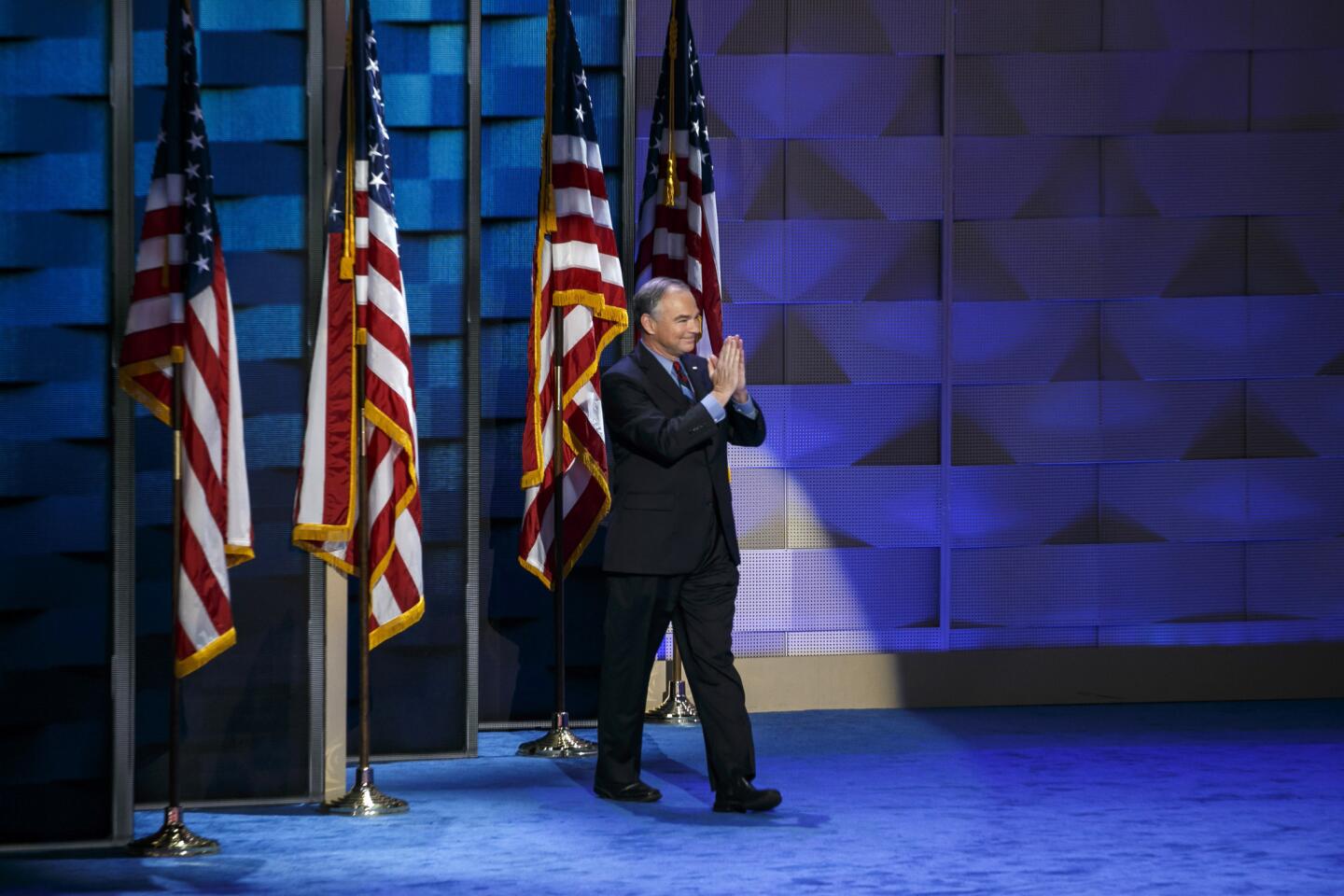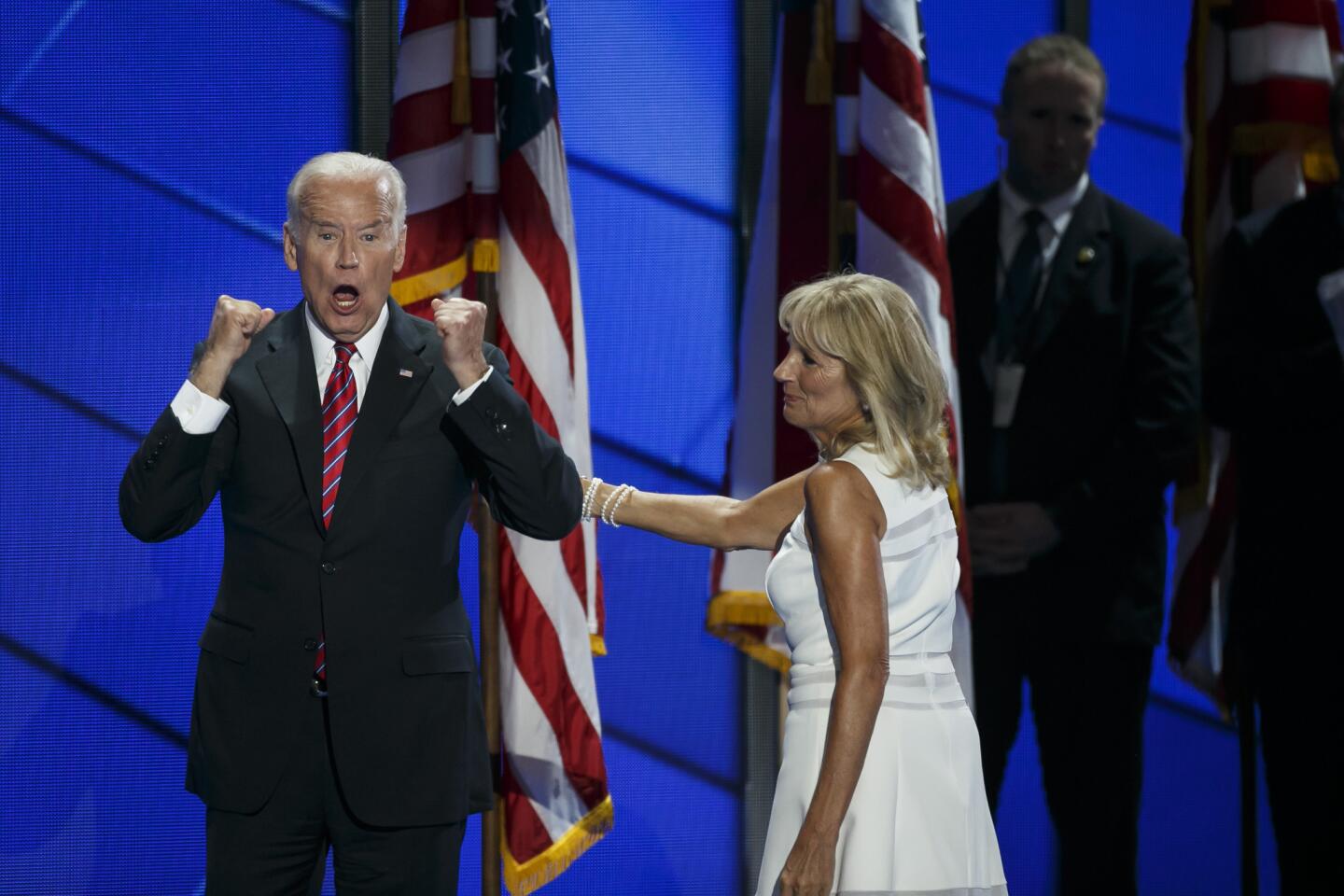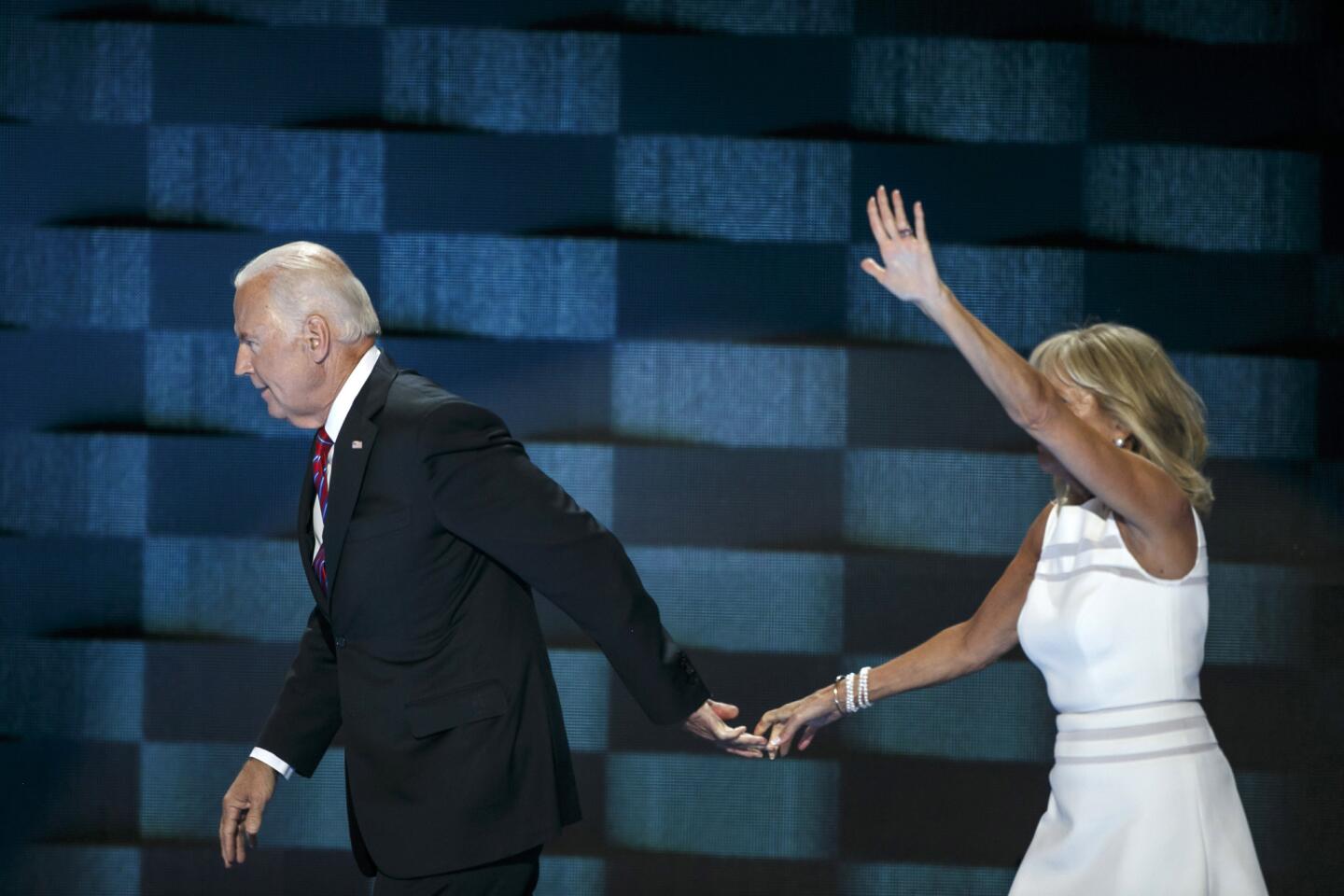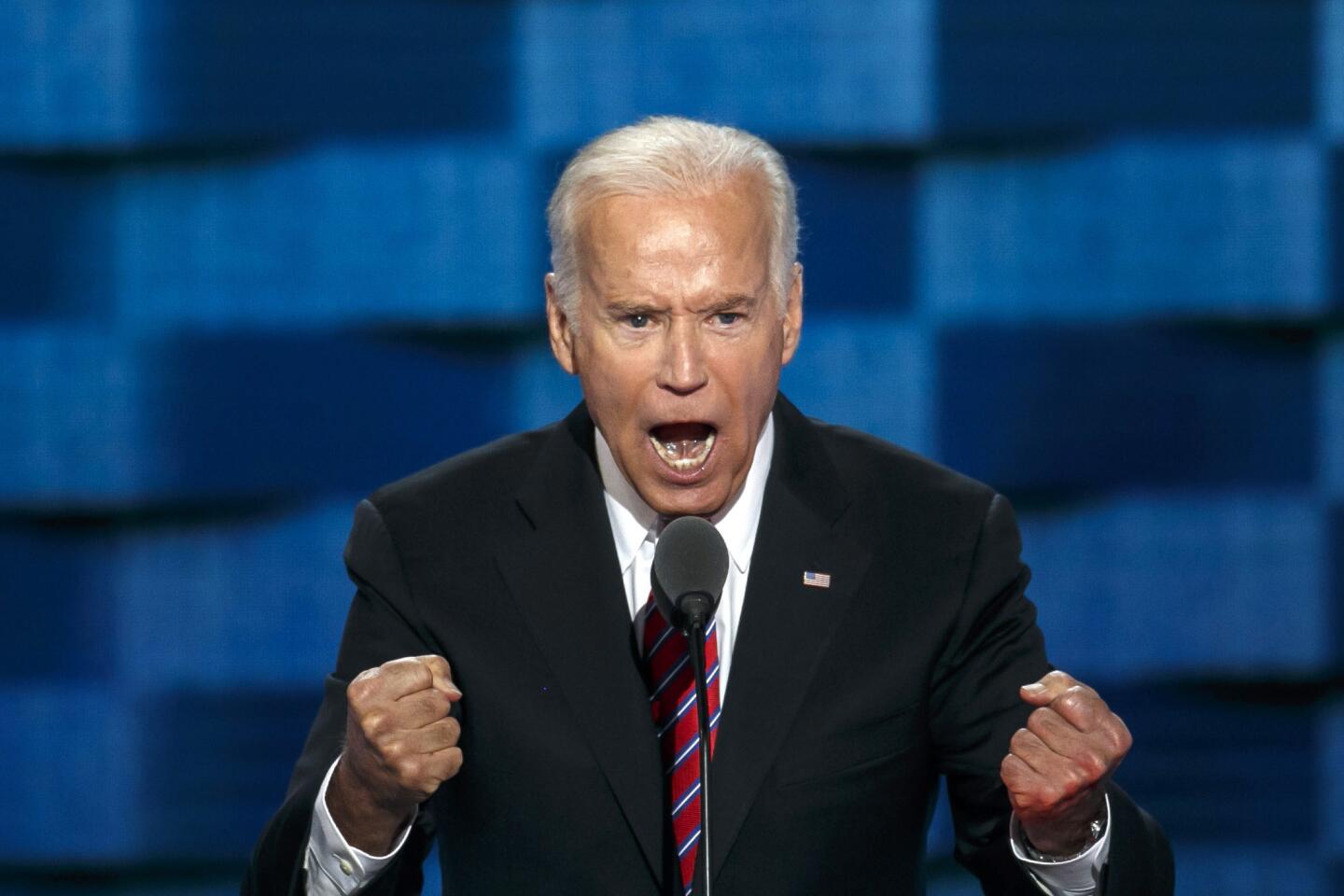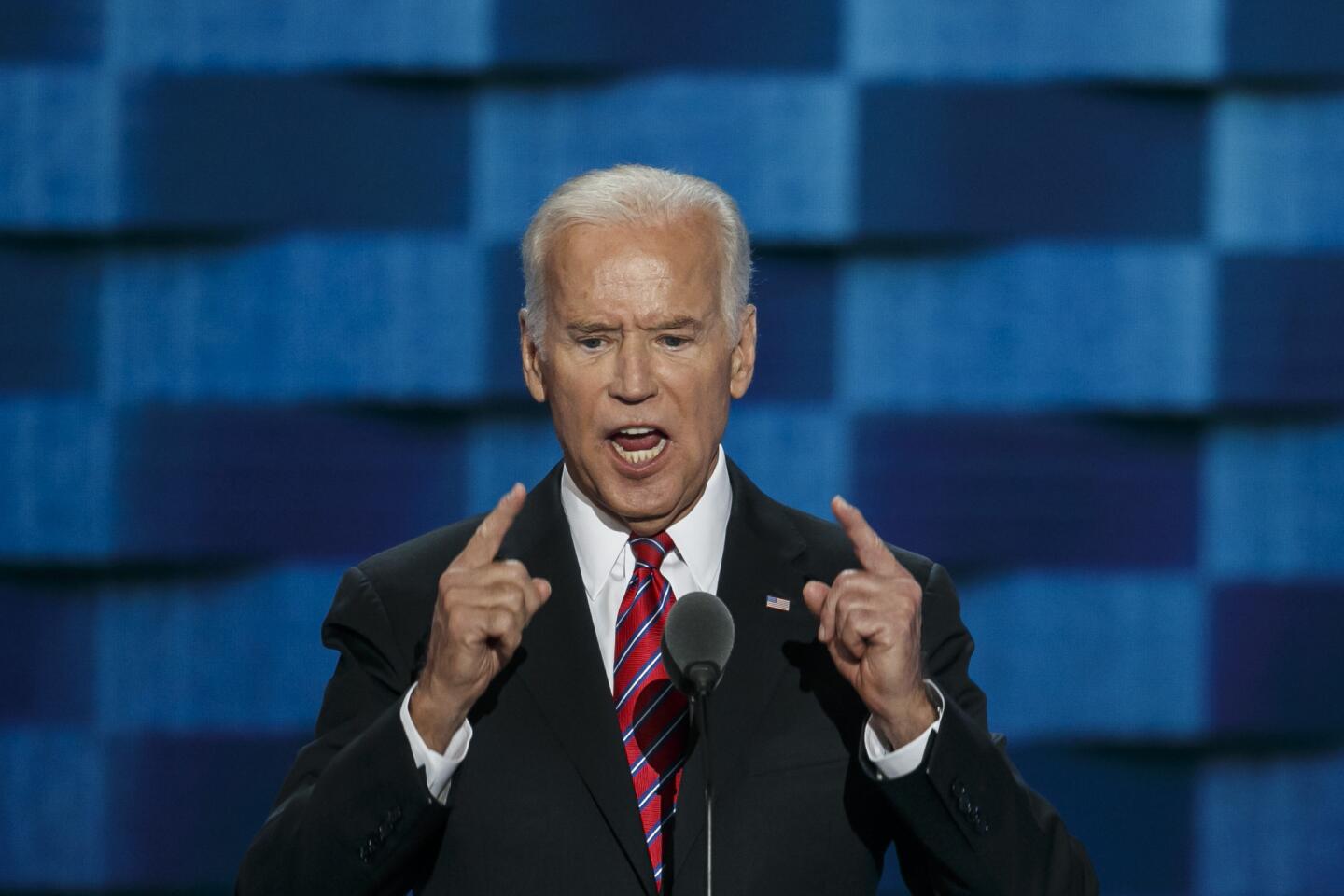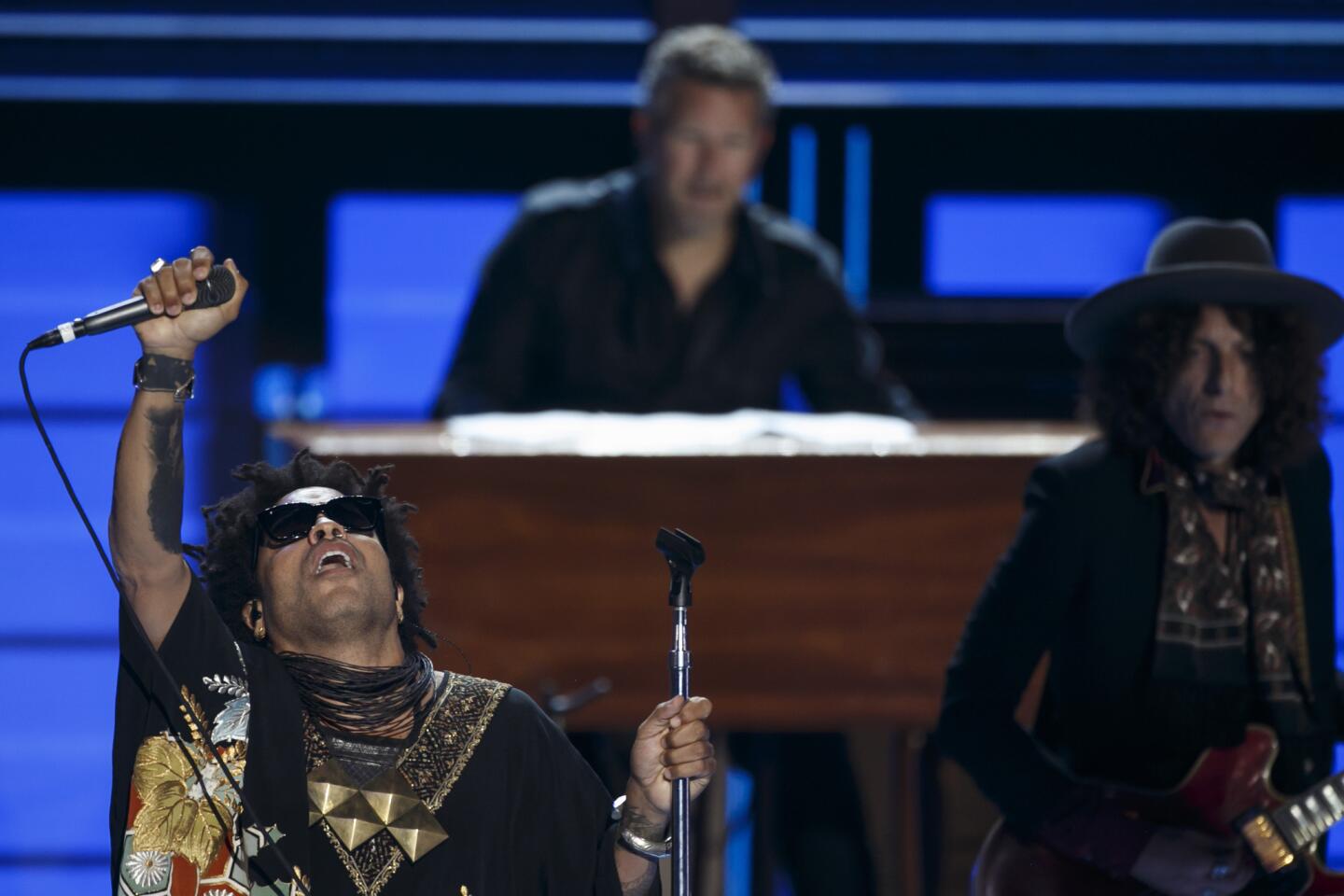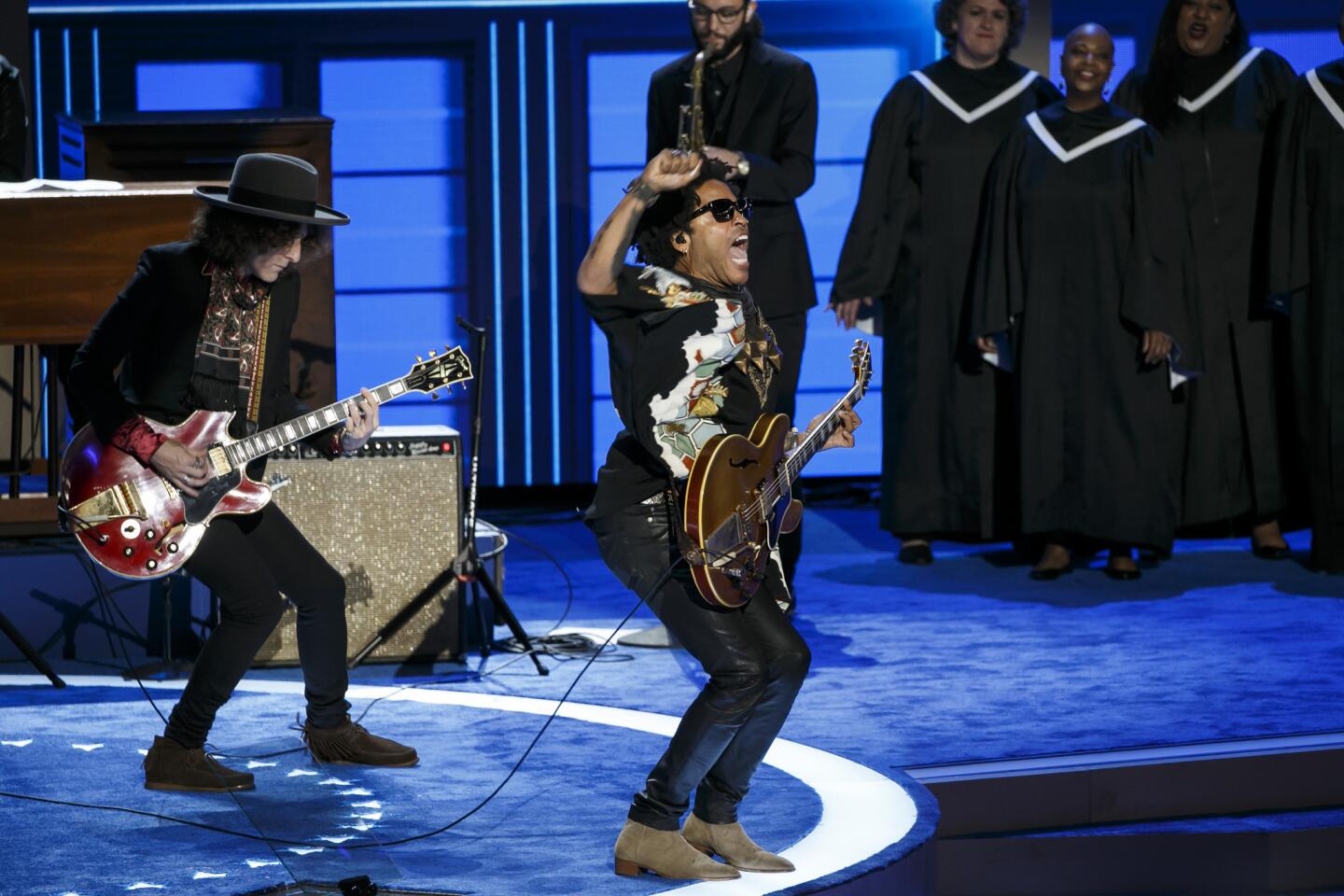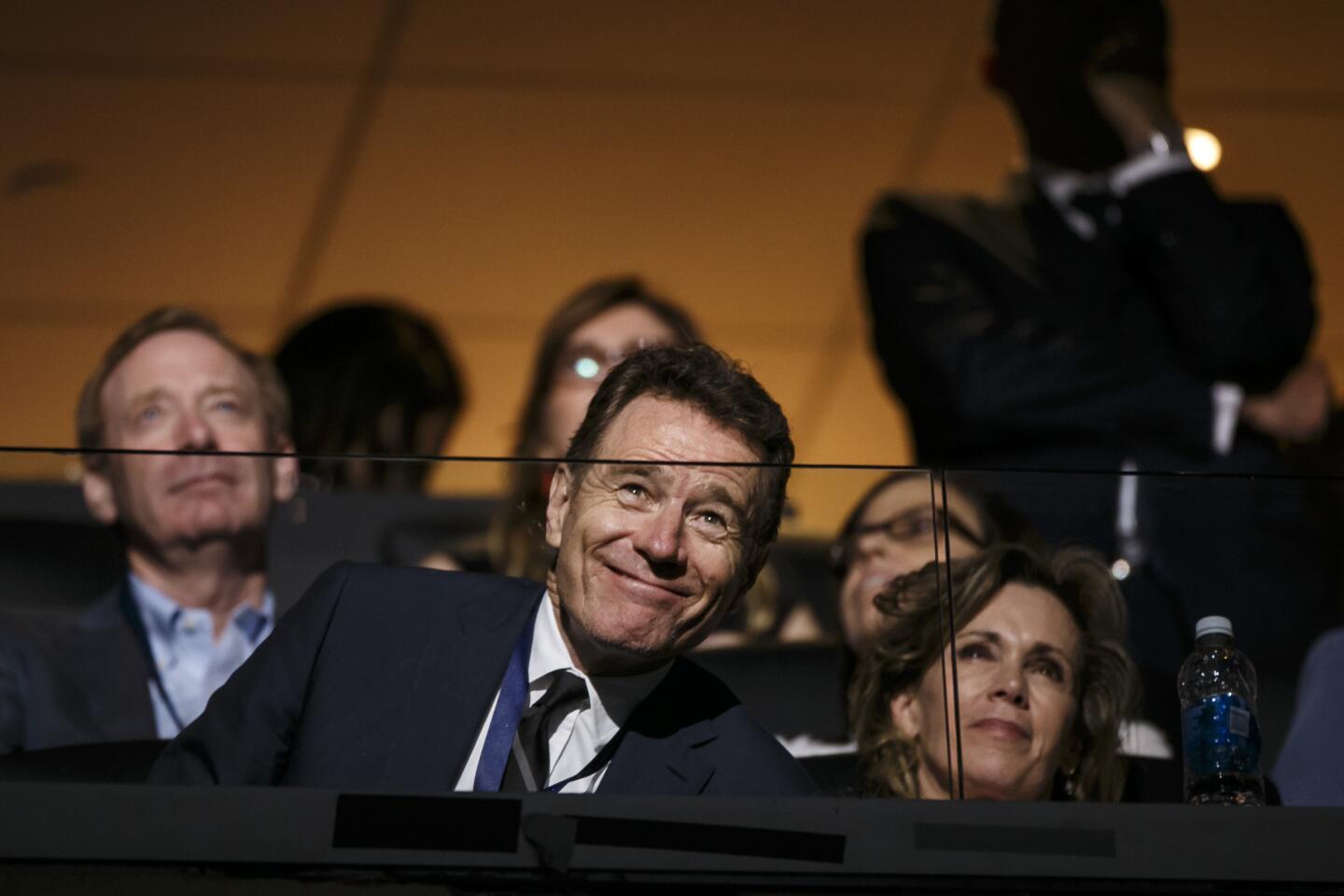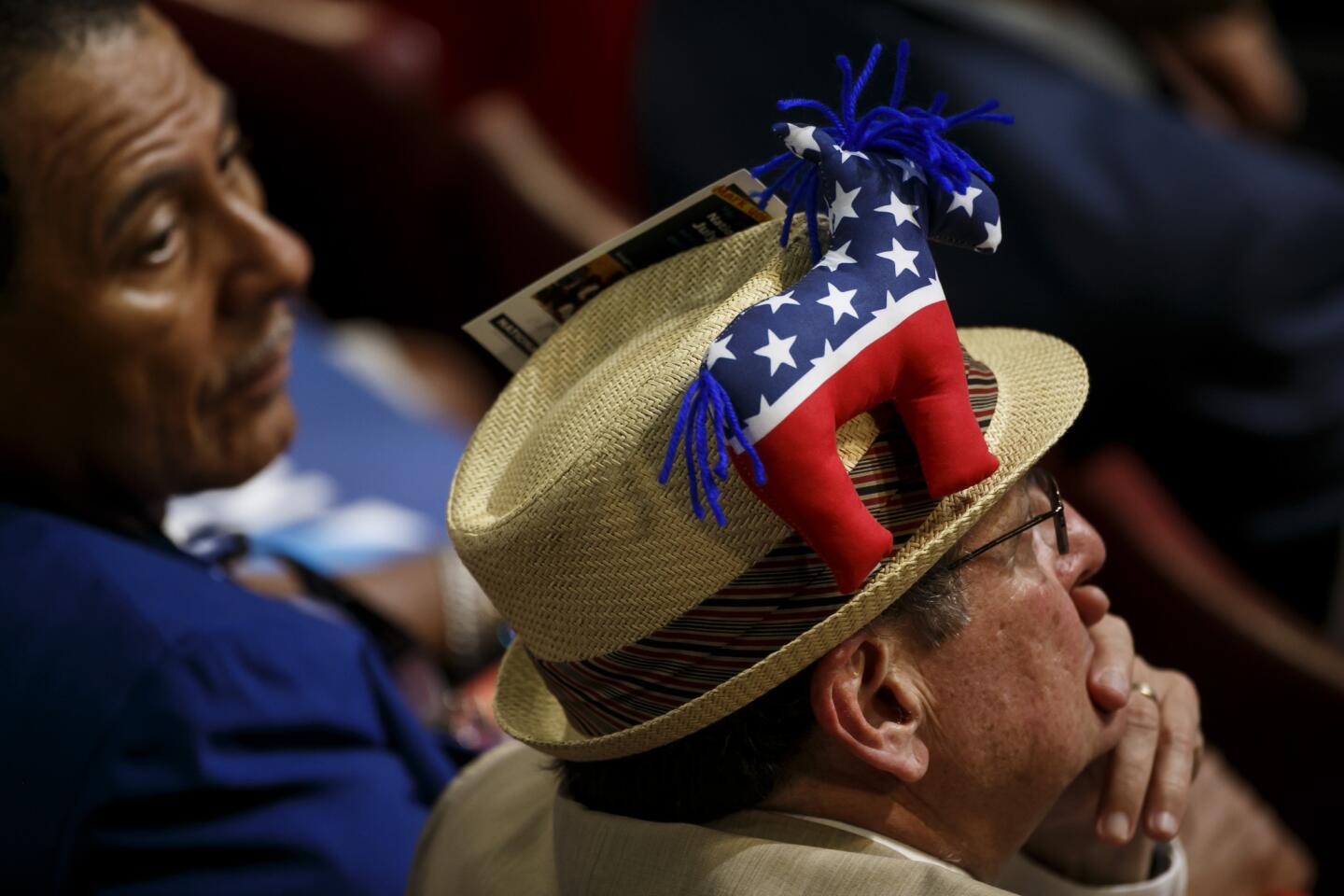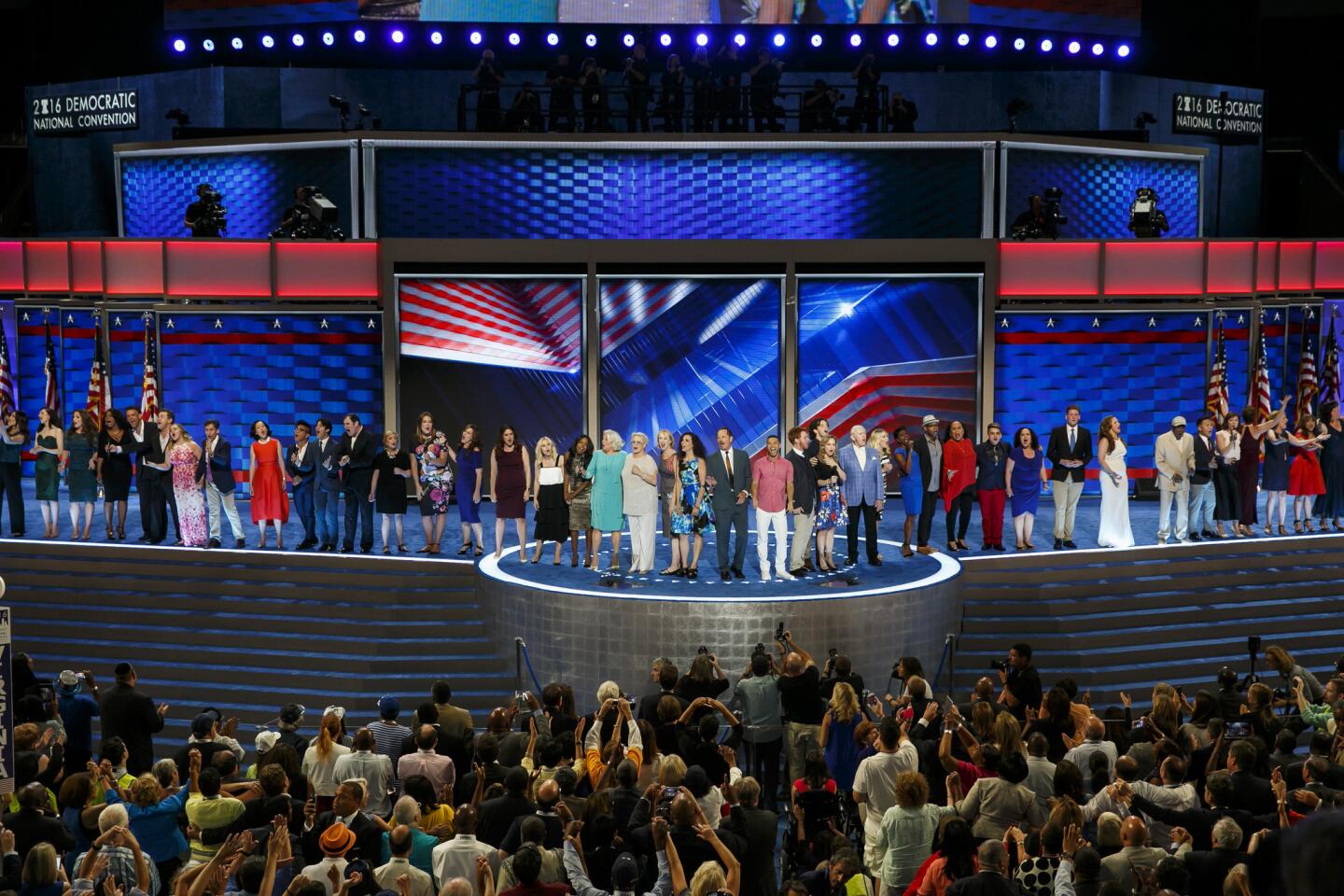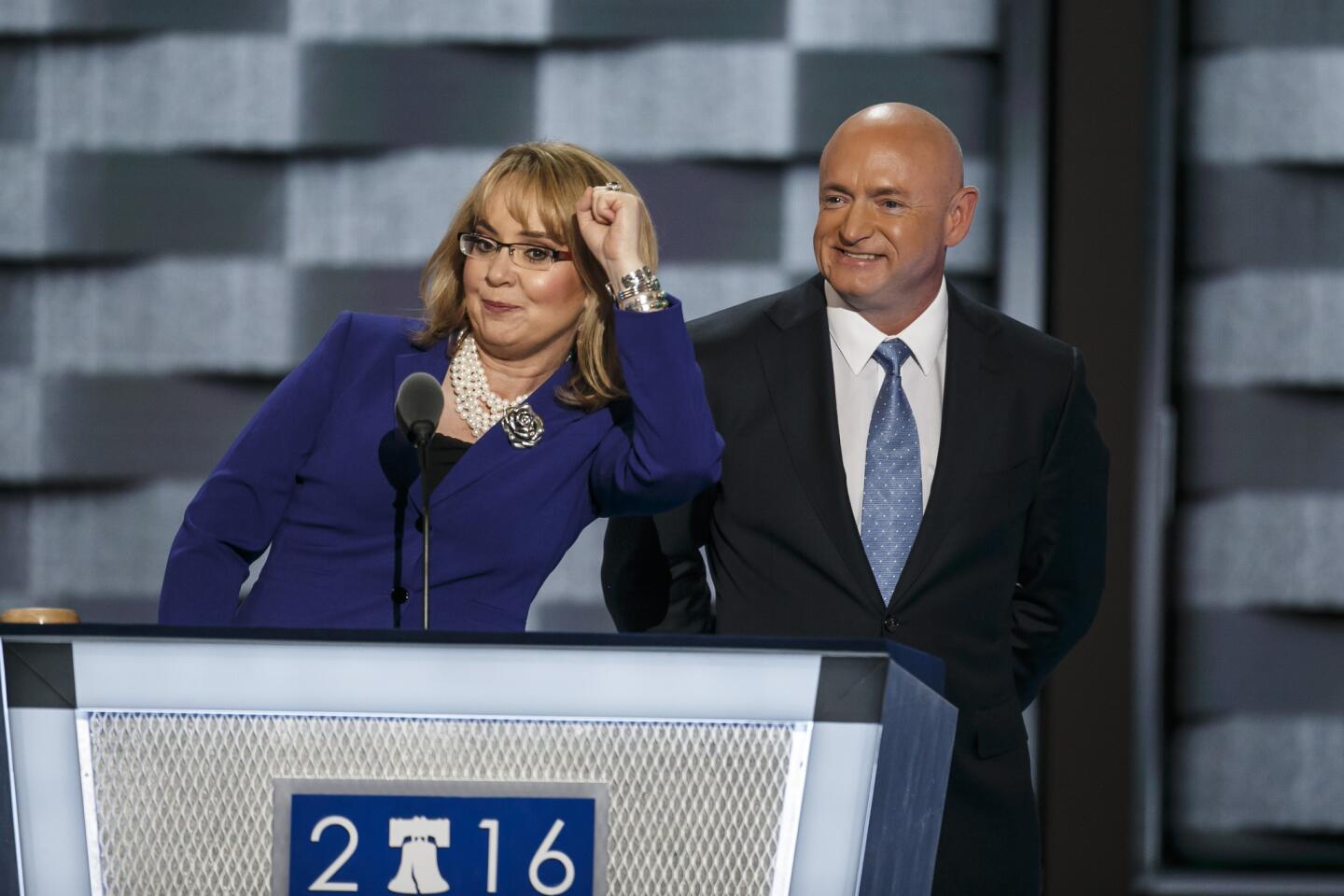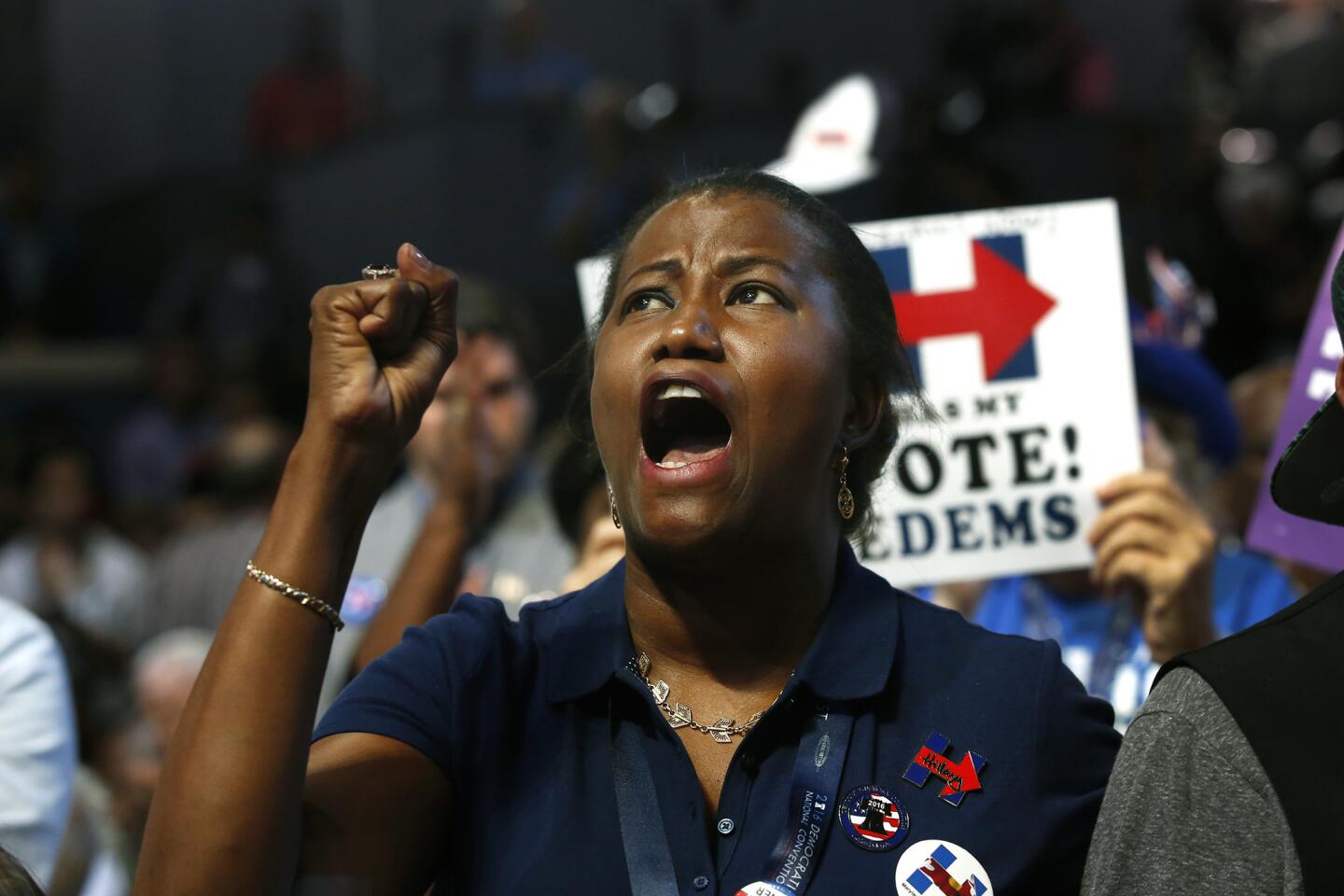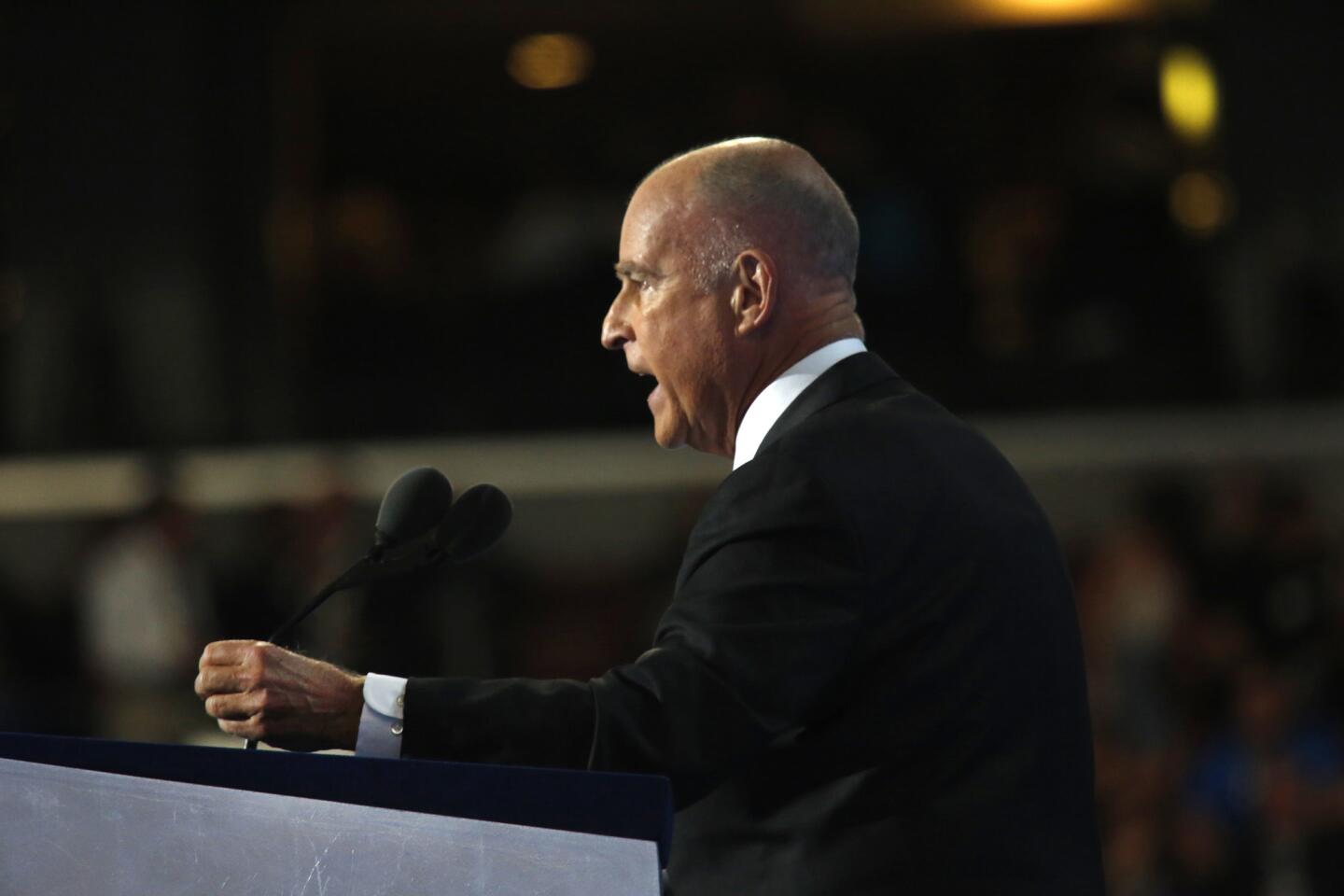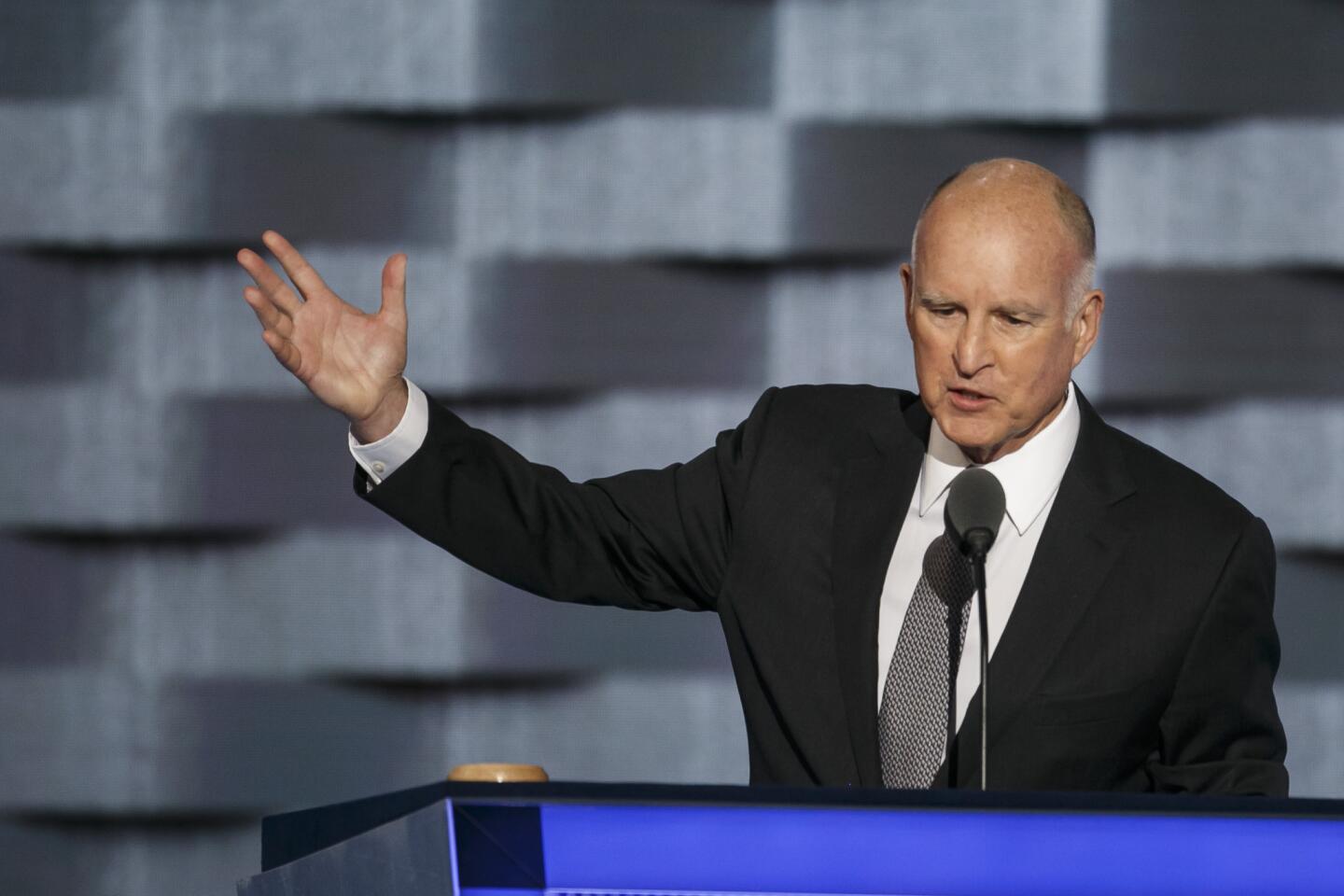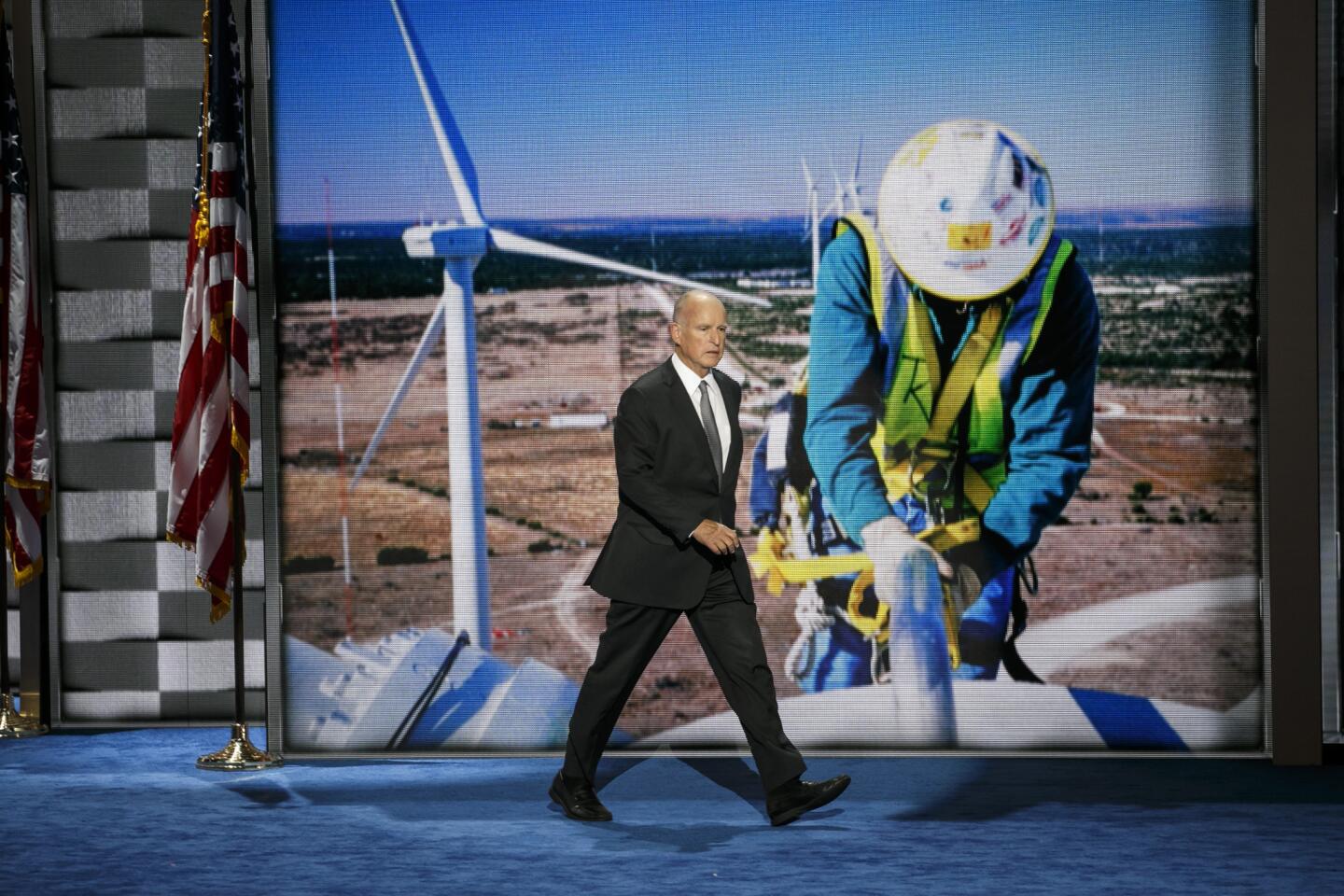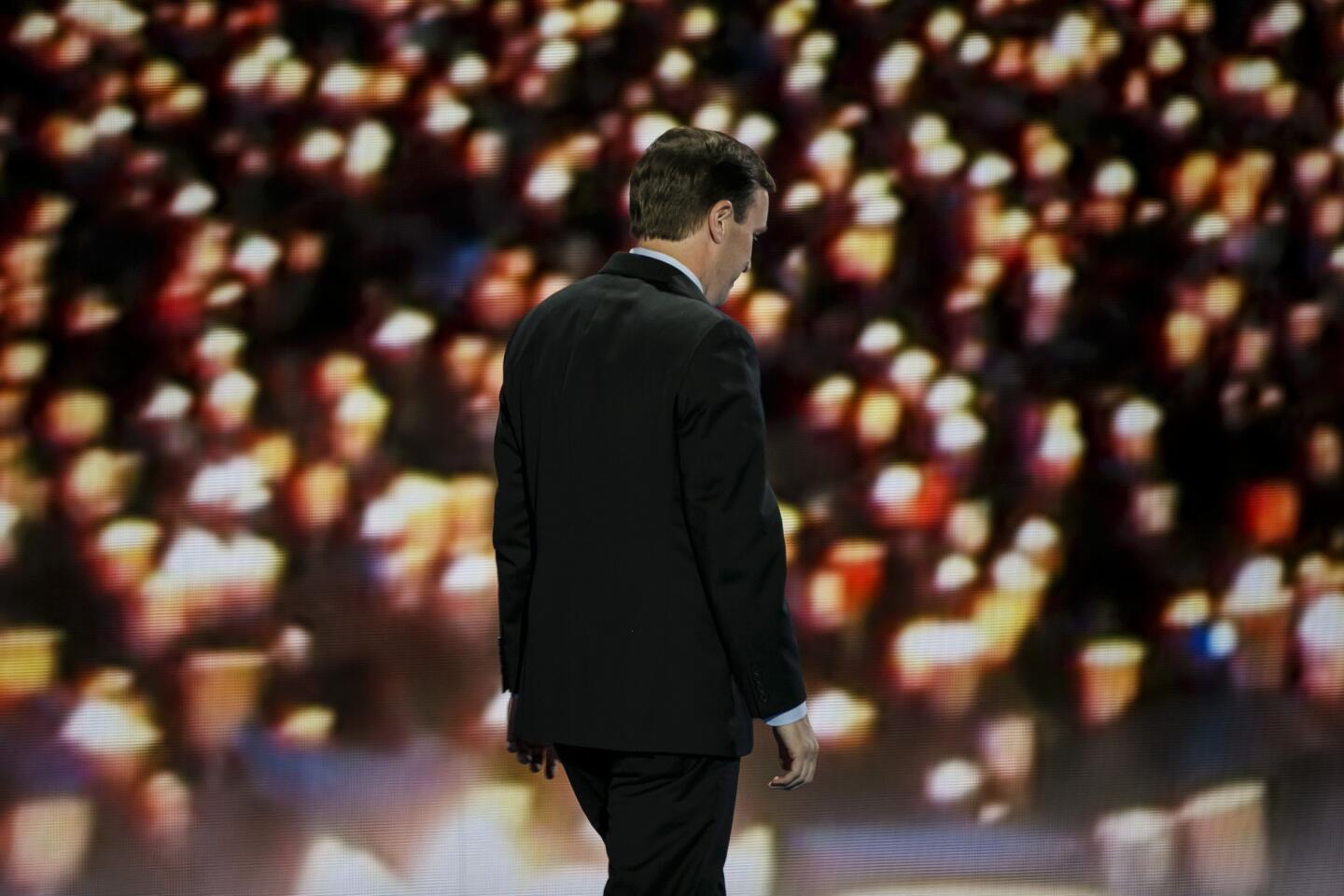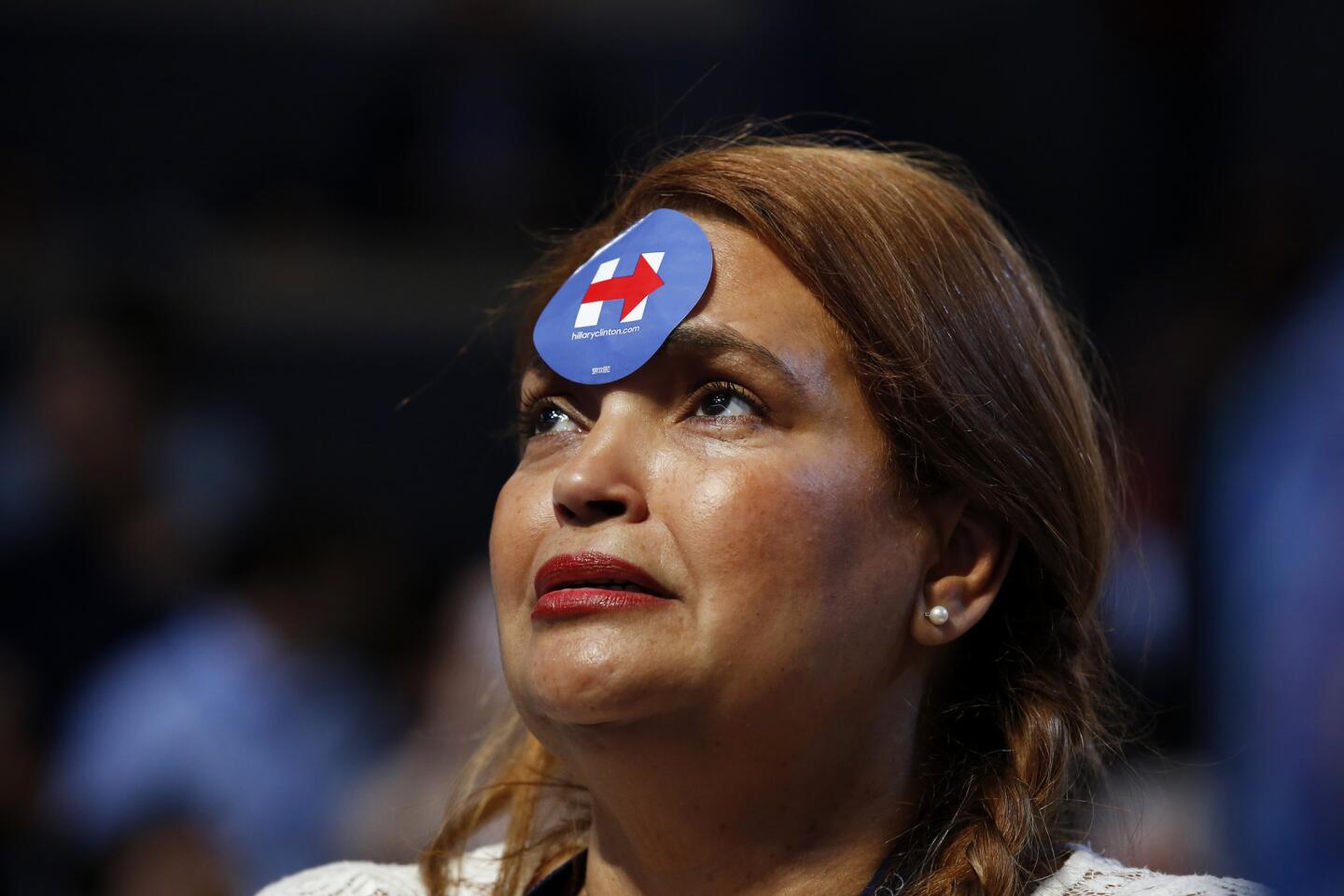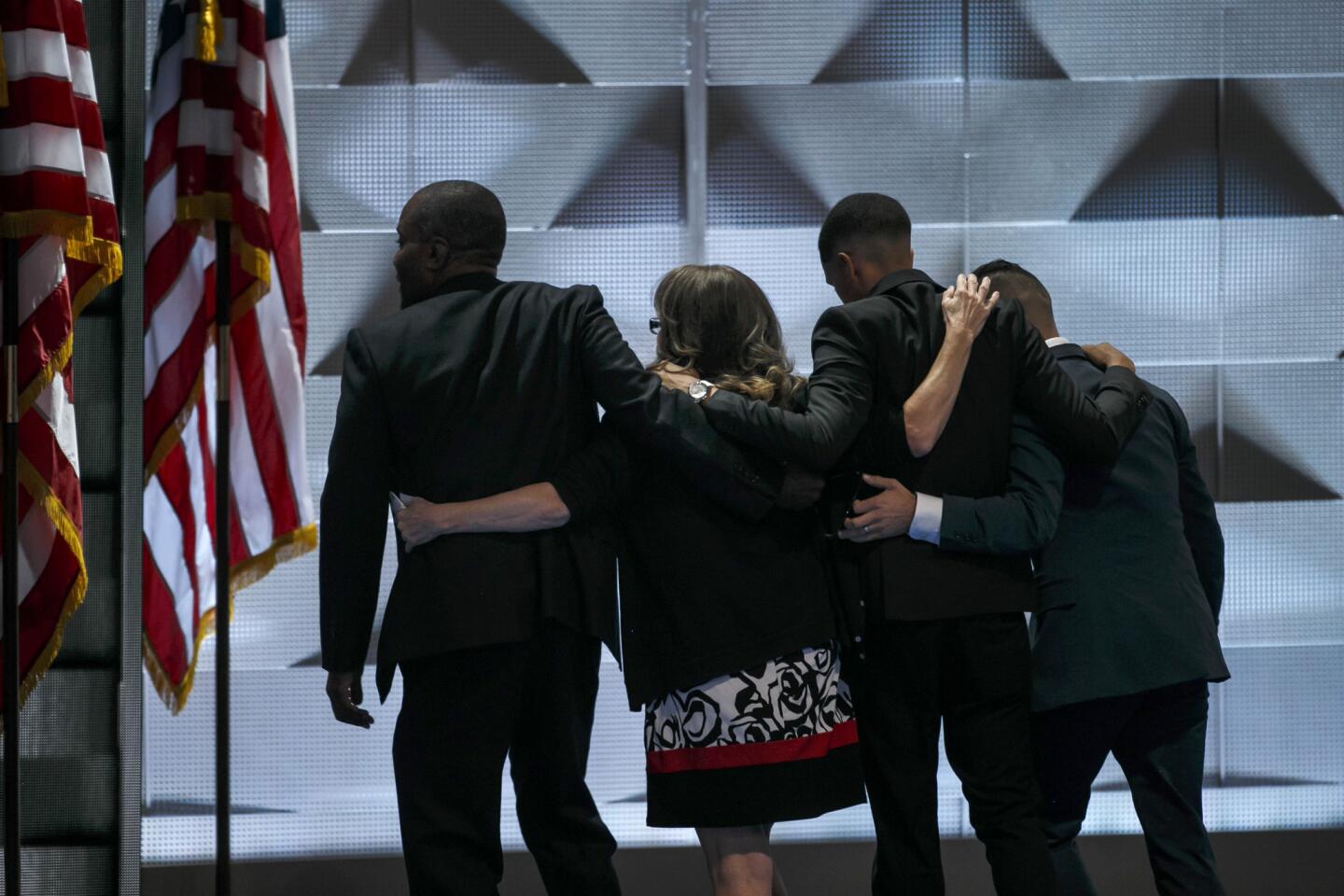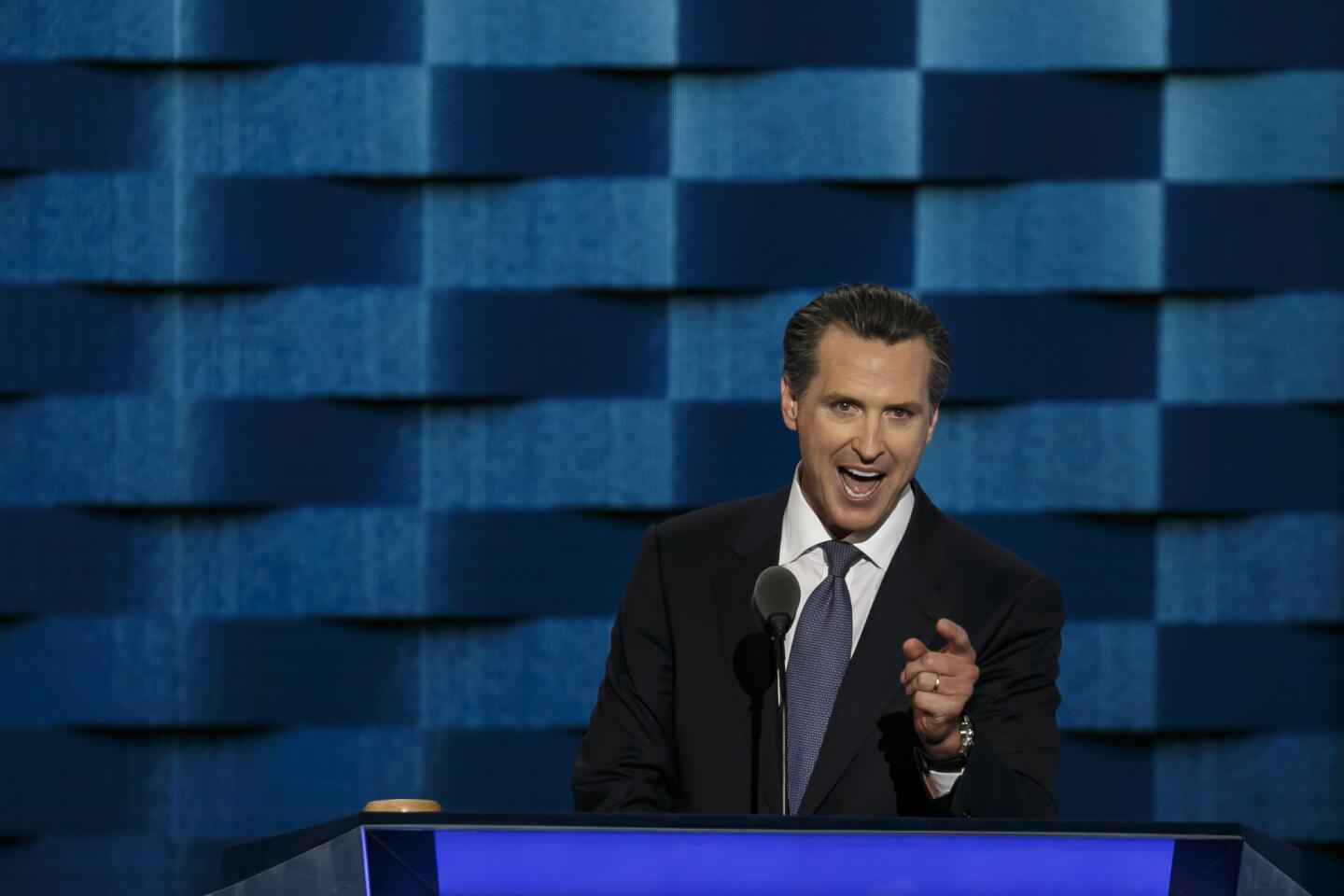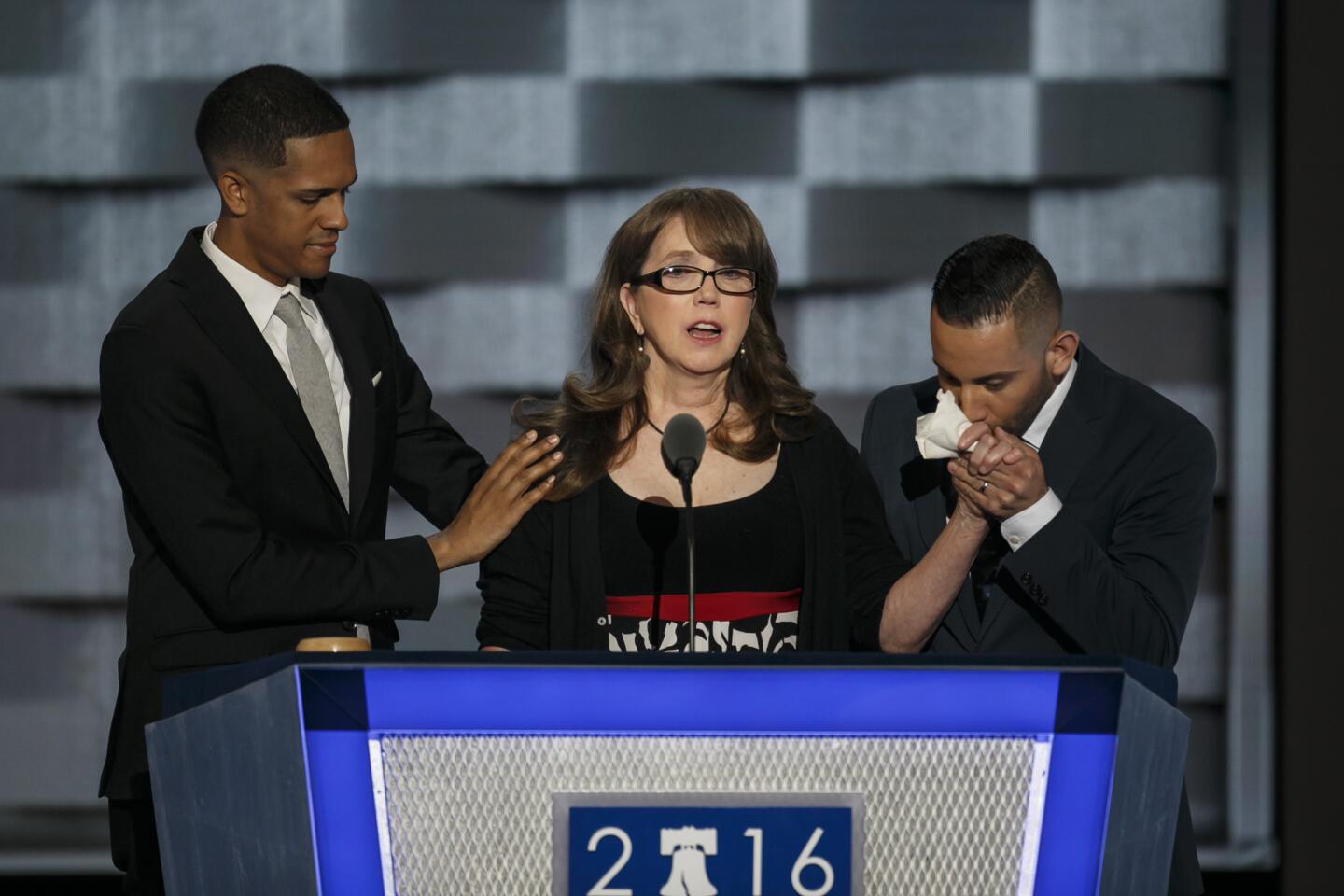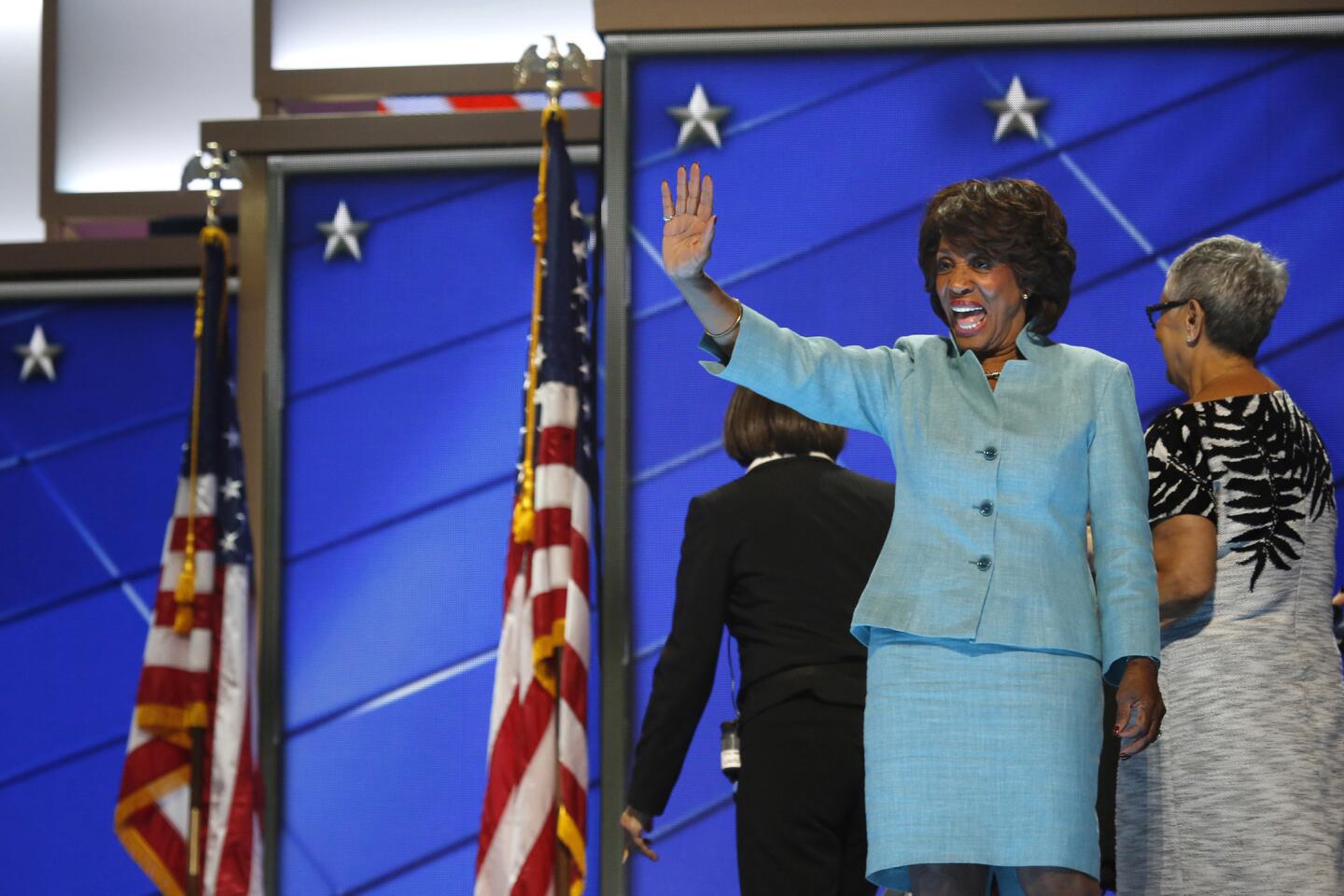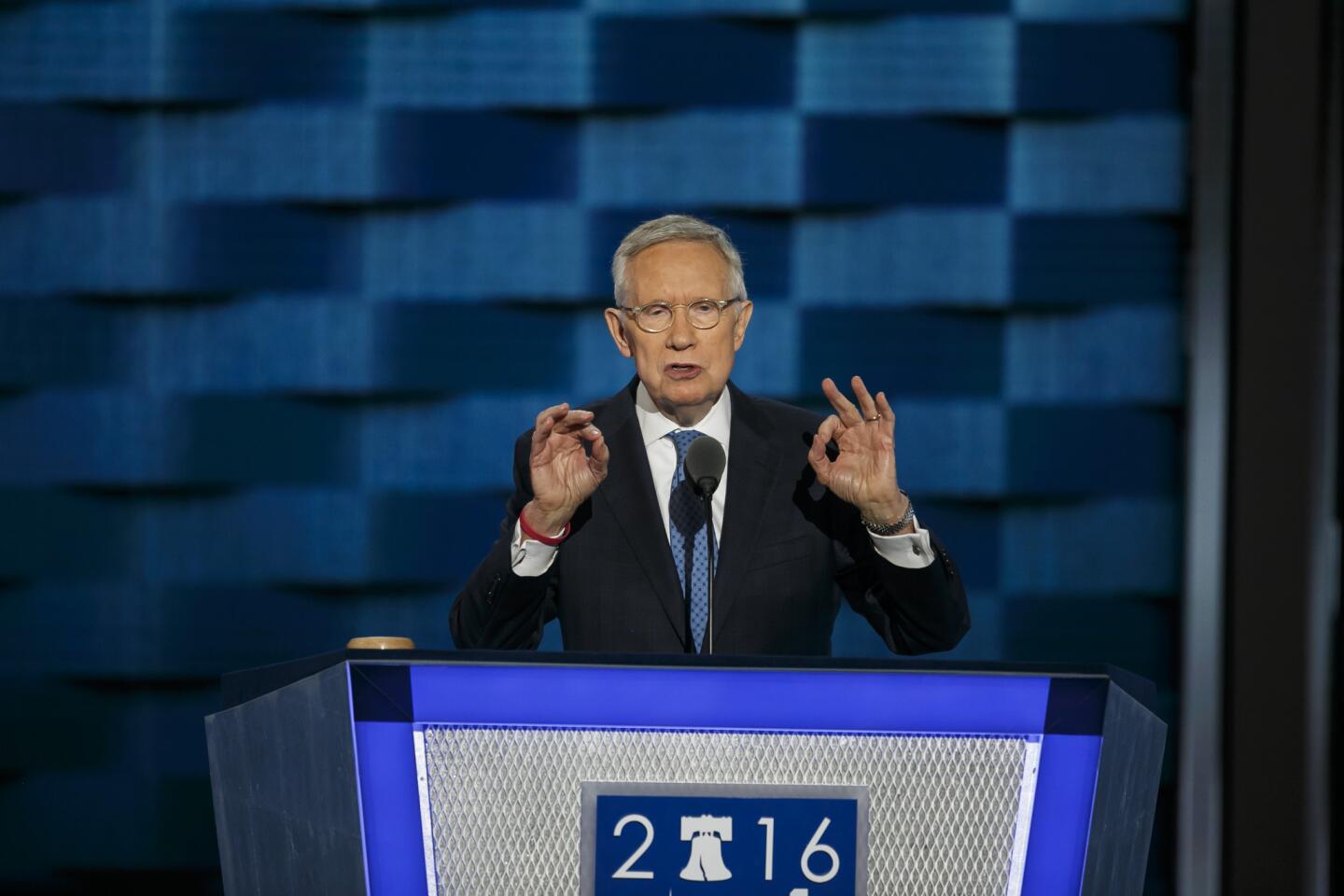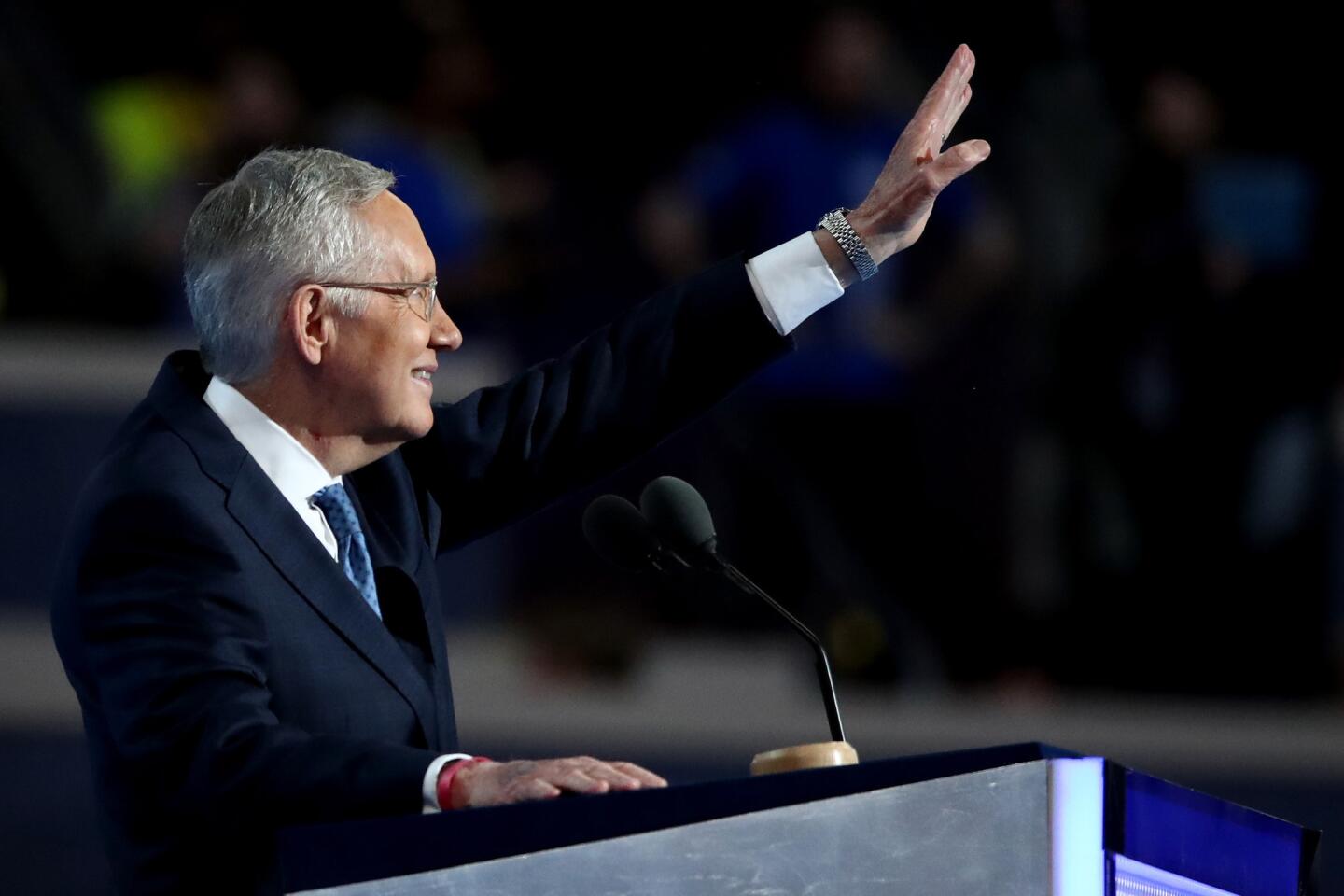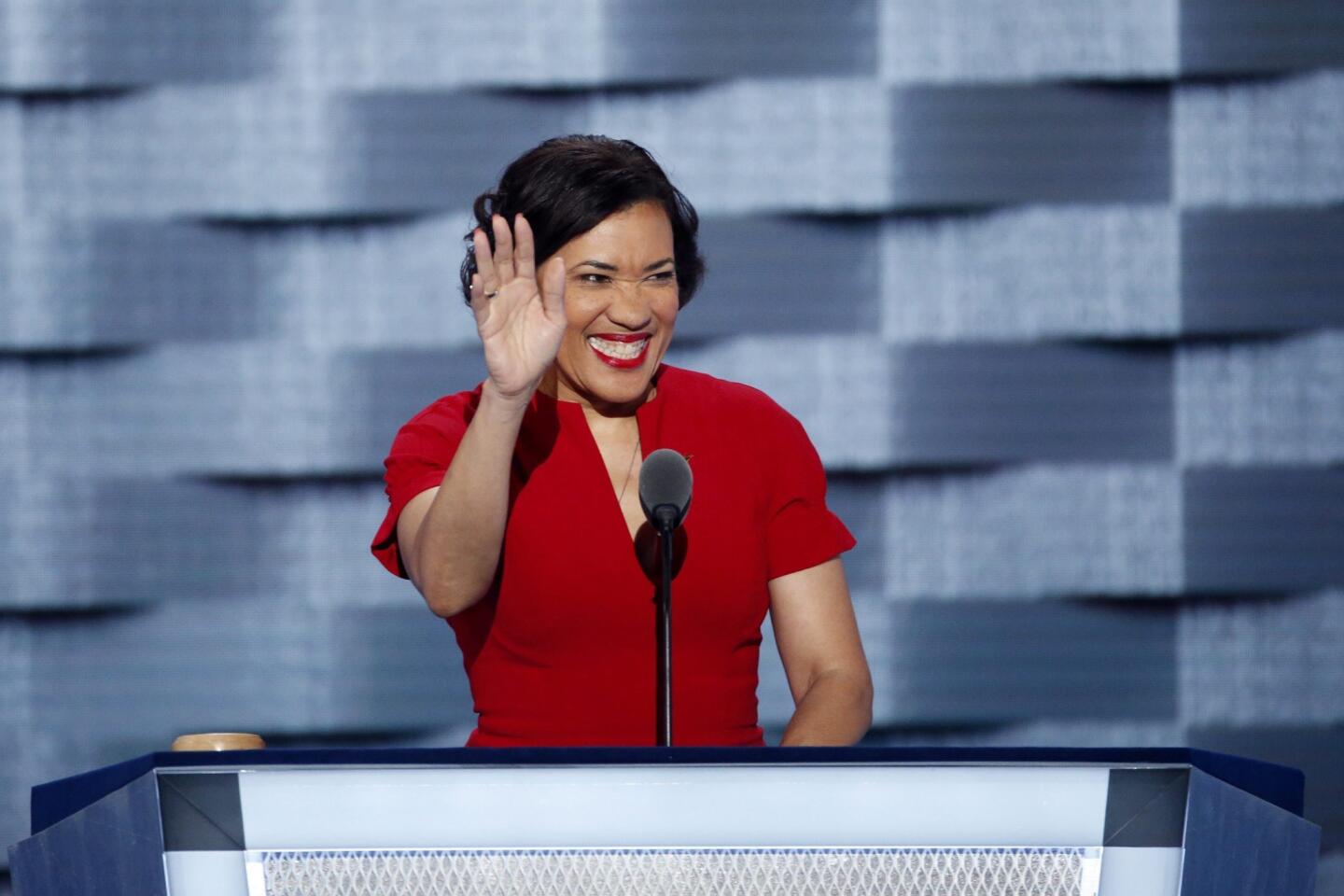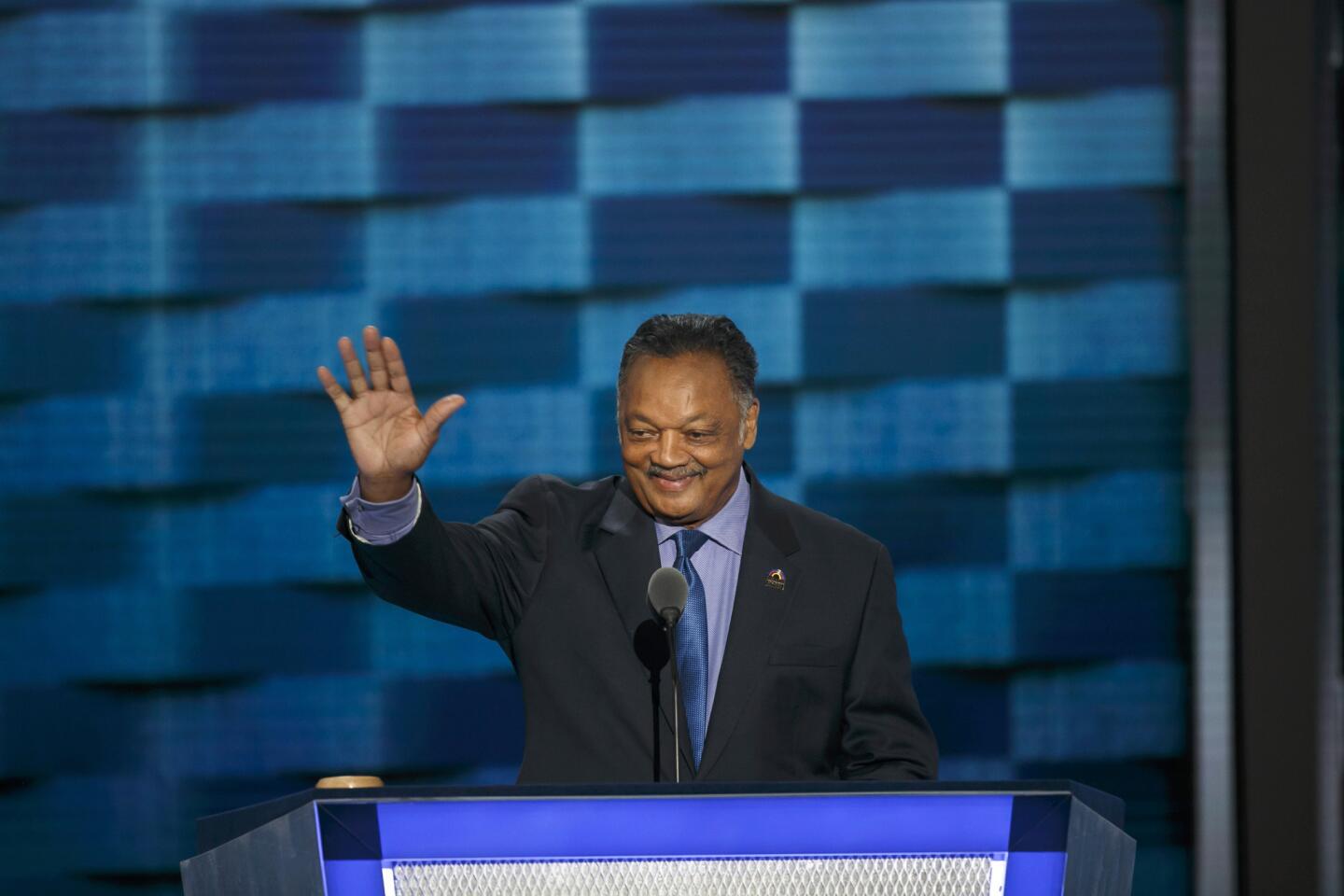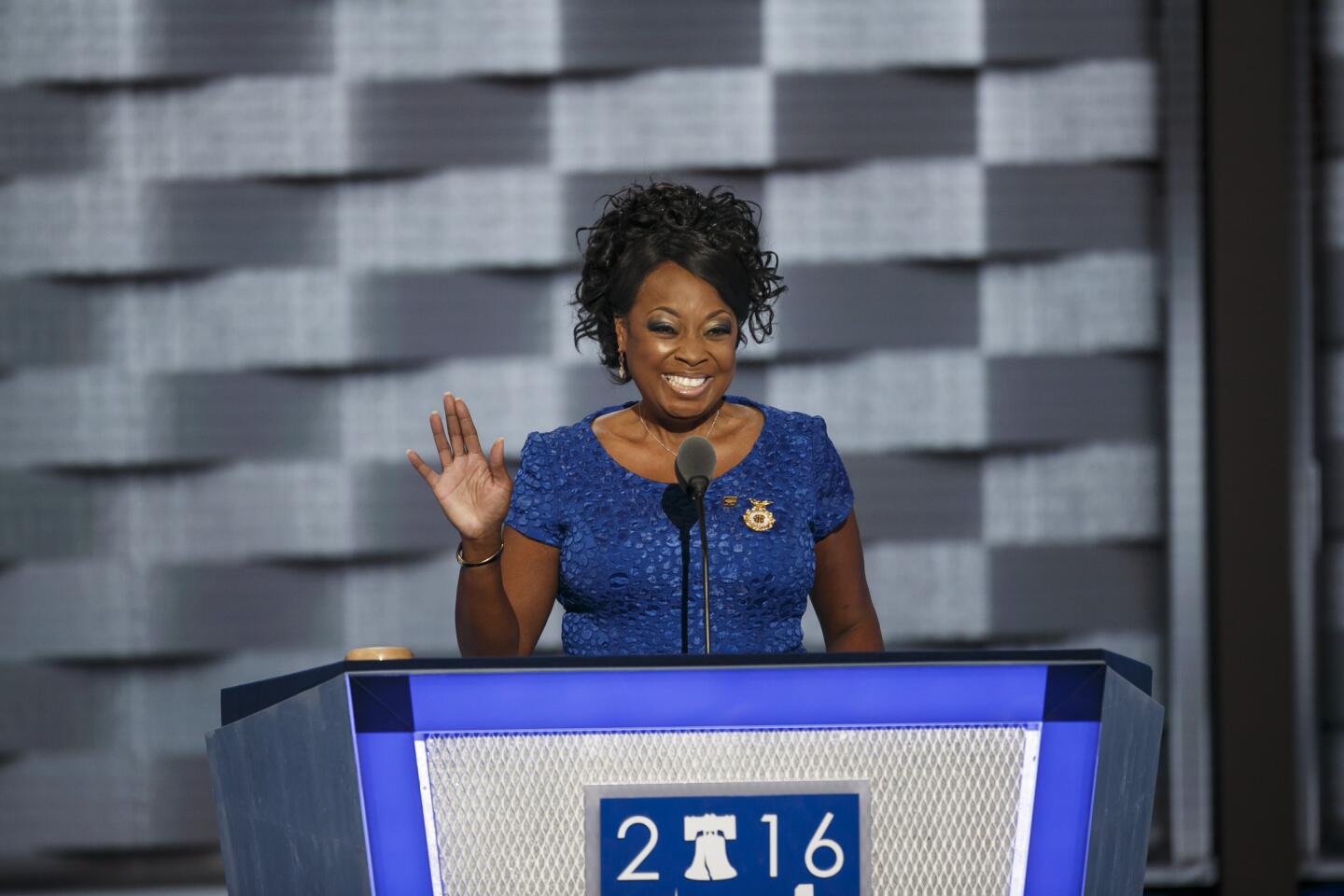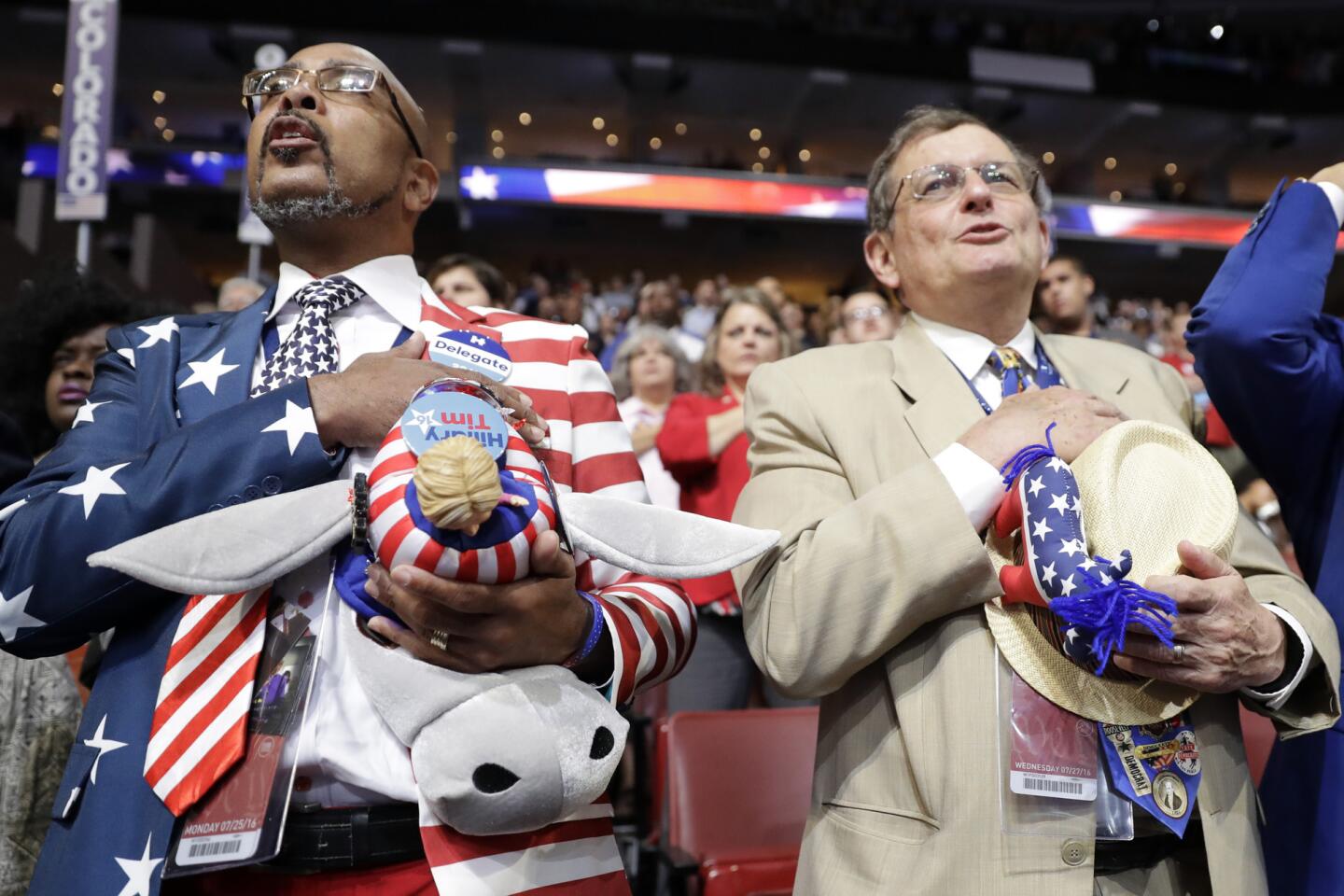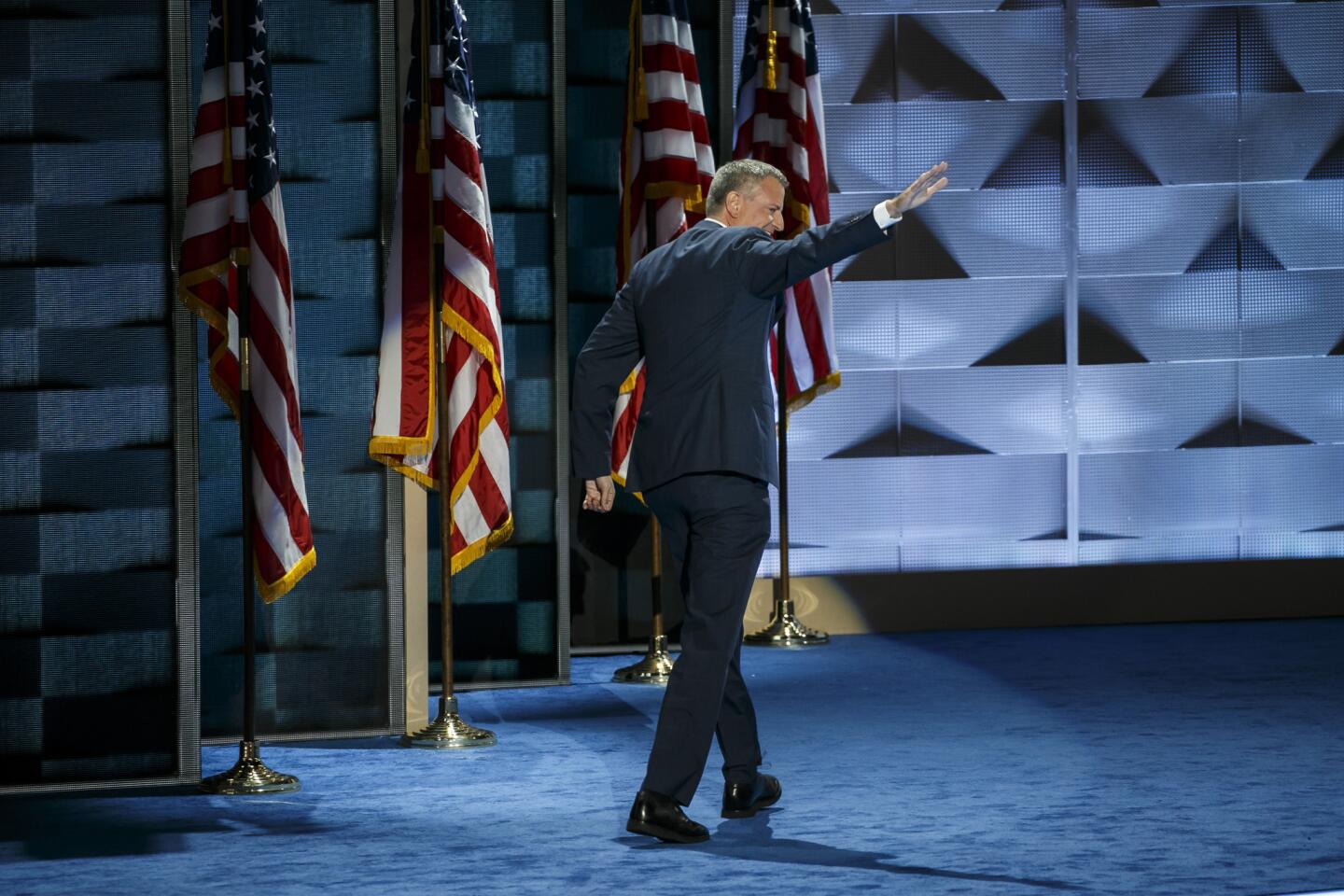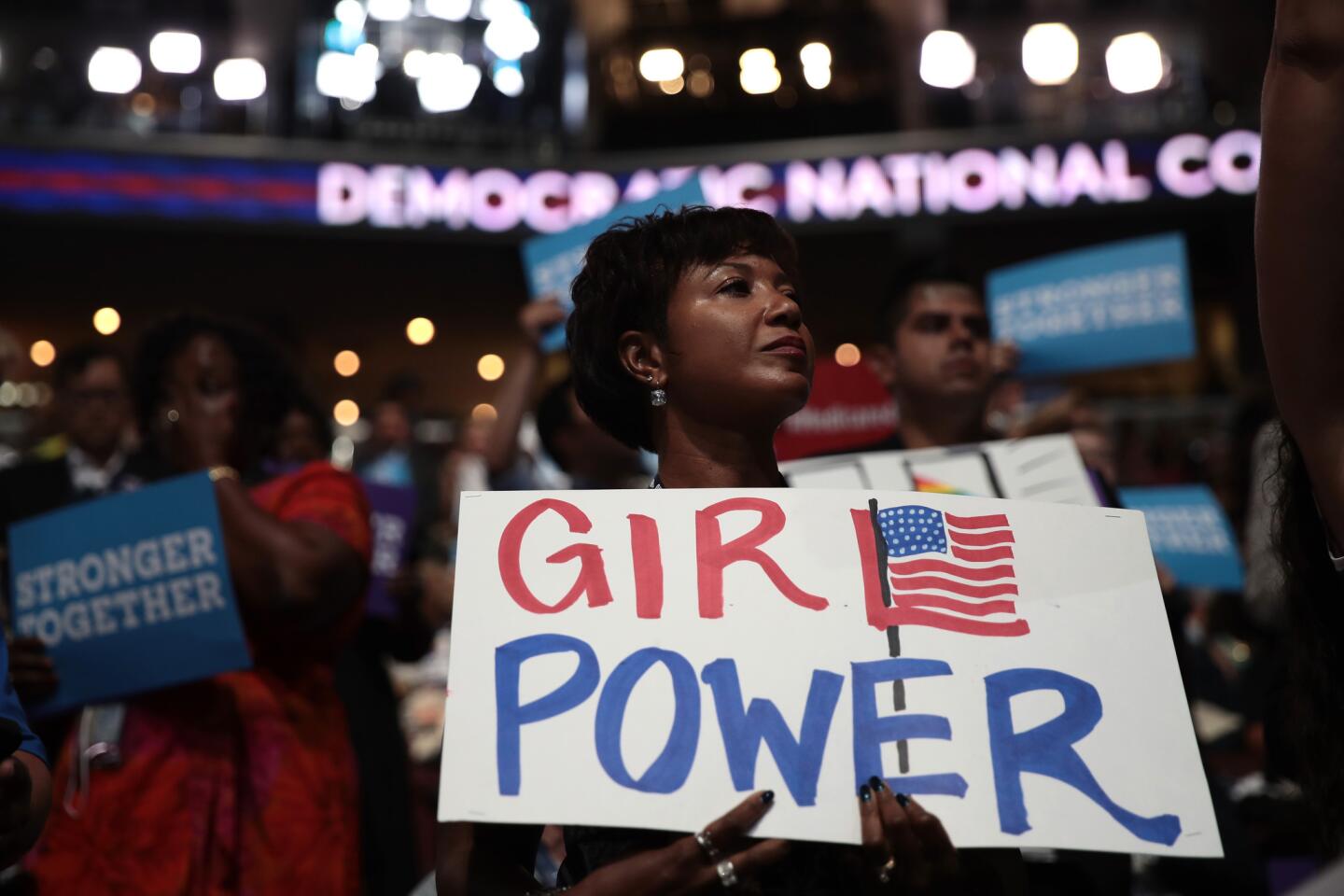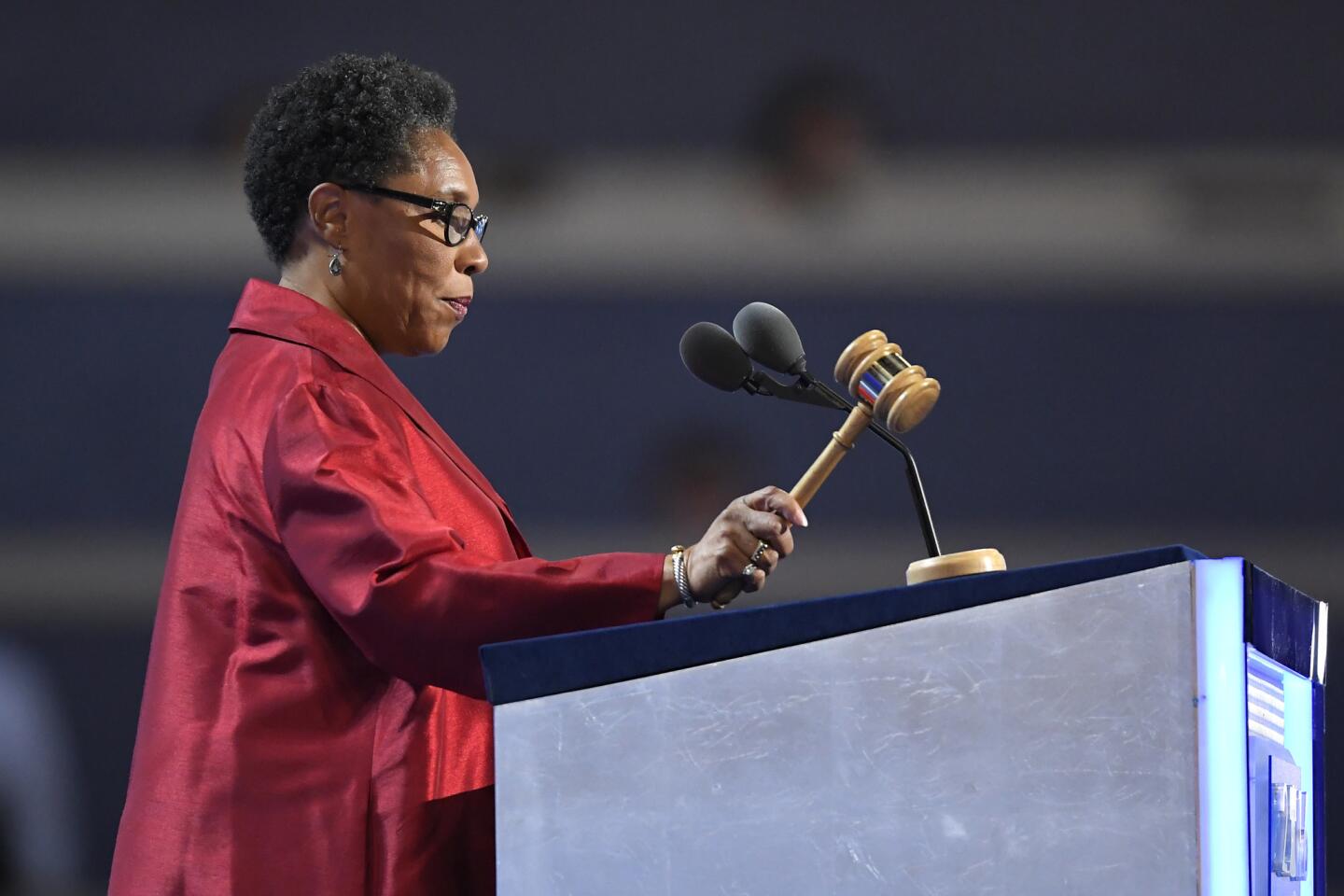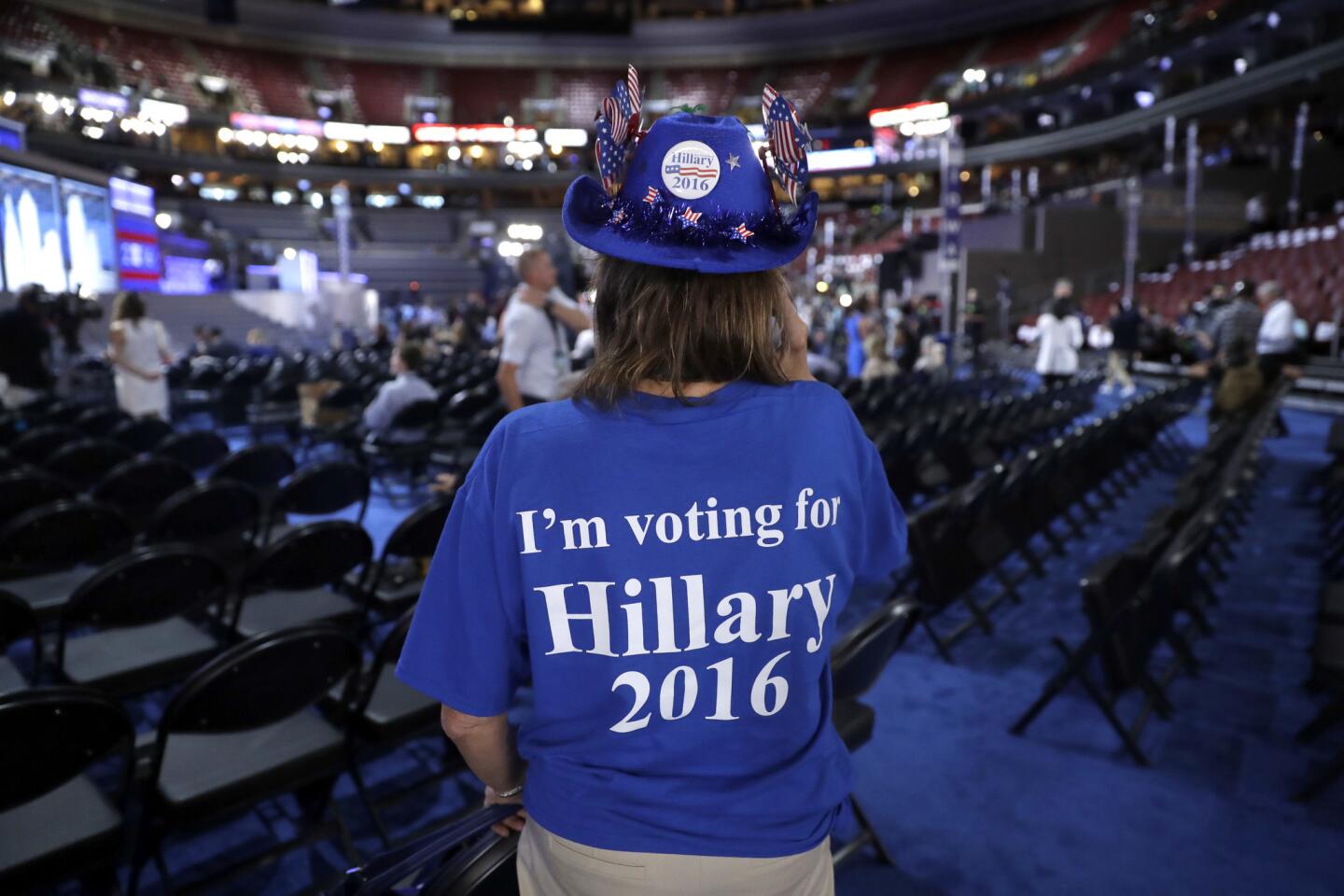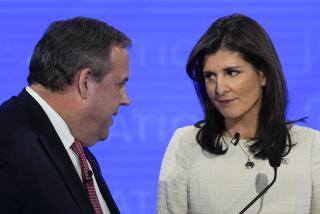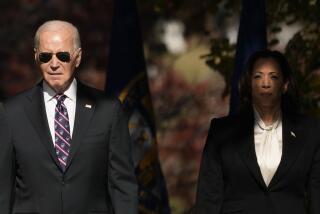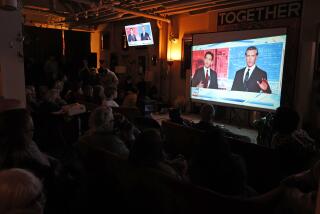Reporting from Philadelphia — If nothing else, the opening day of the Democratic National Convention showed that family feuds are not solely the province of the Republican Party.
Party stalwarts arrived onstage only to be treated dismissively — loudly so — by many of the delegates. That followed a second day of protests by supporters of Sen. Bernie Sanders, the second-place finisher, who was booed by many of his own backers for suggesting they should cast their November ballots for the winner, Hillary Clinton.
That followed Florida delegates yelling at the party’s chairwoman, Florida Rep. Debbie Wasserman Schultz, on Monday morning, contributing to her decision to cancel her convention appearances.
“Brothers and sisters, this is the real world that we live in,” Sanders had implored his supporters as they booed.
Real world or not, it should come as no shock after the campaign season America has witnessed that chaos has been visited upon both political parties as they seek to put their best faces forward in four-day television extravaganzas.
But the lines of division are not the same in each party.
Republicans saw last week that their party has been taken over by Donald Trump, the real estate impresario whose improbable campaign defeated more than a dozen candidates who, in more normal times, could have found success.
Trump channeled the economic and cultural concerns of Americans who felt spurned by more traditional Republicans, attracting them with bombastic words and spraying insults across many voter groups.
He succeeded to the point that delegates to his Cleveland convention roundly booed when his second-place finisher, Texas Sen. Ted Cruz, failed to endorse Trump, saying that people should vote their consciences.
The Democratic problem is the opposite in many ways: Rather than taking over the party, many supporters of Sanders here remain on the outside, protesting. They do so despite his dramatic successes in winning votes, raising money, successfully liberalizing the party platform and contributing to the deposing of Wasserman Schultz, who will leave her post at the conclusion of the convention, months before her term ended.
Both feuds also look very different outside the convention halls.
1/97
Hillary Clinton celebrates at the 2016 Democratic National Convention in Philadelphia. (Marcus Yam / Los Angeles Times )
2/97
Balloons and confetti fall as Hillary Clinton and Senator Tim Kaine appear before the crowd at the end of the Democratic National Convention in Philadelphia. (Marcus Yam / Los Angeles Times)
3/97
Hillary Clinton and Senator Tim Kaine celebrates after accepting her party’s nomination at the 2016 Democratic National Convention.
(Marcus Yam / Los Angeles Times) 4/97
Hillary Clinton embraces her daughter, Chelsea Clinton, after wrapping up the 2016 Democratic National Convention in Philadelphia.
(Marcus Yam / Los Angeles Times) 5/97
Democratic presidential candidate Hillary Clinton stands with her husband former President Bill Clinton on stage with Vice President nominee Tim Kaine and his wife Anne Holton at the end of the fourth day of the Democratic National Convention.
(Alex Wong / Getty Images) 6/97
Hillary Clinton becomes the first woman to win the nomination for President for any party in America. Celebration begins after she finished her address to the delegation on the final night of the Democratic National Convention in Philadelphia.
(Carolyn Cole / Los Angeles Times) 7/97
Hillary Clinton becomes the first woman to win the nomination for President for any party in America.
(Carolyn Cole / Los Angeles Times) 8/97
Hillary Clinton becomes the first woman to win the nomination for President for any party in America. Celebration with her family begins after she finished her address to the delegation on the final night of the Democratic National Convention in Philadelphia.
(Carolyn Cole / Los Angeles Times) 9/97
Hillary Clinton gets a hug from President Bill Clinton after becoming the first woman to win the nomination for President for any party in America.
(Carolyn Cole / Los Angeles Times) 10/97
Hillary Clinton and Senator Tim Kaine appear before the crowd at the end of the 2016 Democratic National Convention in Philadelphia.
(Marcus Yam / Los Angeles Times) 11/97
Hillary Clinton becomes the first woman to win the nomination for President in America. Celebration begins with Senator Tim Kaine after she finished her address.
(Carolyn Cole / Los Angeles Times) 12/97
Democratic presidential nominee Hillary Clinton speaks on stage during the fourth and final night of the Democratic National Convention. (Nicholas Kamm / AFP / Getty Images)
13/97
Hillary Clinton on the final night of the Democratic National Convention. (Carolyn Cole / Los Angeles Times)
14/97
Democratic presidential candidate Hillary Clinton delivers remarks during the fourth day of the Democratic National Convention.
(Jessica Kourkounis / Getty Images) 15/97
Hillary Clinton addresses the delegation on the final night of the Democratic National Convention in Philadelphia.
(Carolyn Cole / Los Angeles Times) 16/97
Democratic presidential candidate Hillary Clinton acknowledges the crowd as she arrives on stage during the fourth day of the Democratic National Convention.
(Alex Wong / Getty Images) 17/97
Hillary Clinton enters after her daughter Chelsea Clinton introduces her on the final night of the Democratic National Convention in Philadelphia.
(Carolyn Cole / Los Angeles Times) 18/97
Chelsea Clinton, embraces her mother, Democratic presidential nominee Hillary Clinton, during the final day of the Democratic National Convention.
(Mark J. Terrill / Associated Press) 19/97
Marc Mezvinsky, from left, President Bill Clinton, Senator Tim Kaine, and Anne Holton watch a video about Hillary Clinton at the 2016 Democratic National Convention.
(Marcus Yam / Los Angeles Times) 20/97
Chelsea Clinton speaks on the final night of the Democratic National Convention in Philadelphia.
(Carolyn Cole / Los Angeles Times) 21/97
Chelsea Clinton’s husband Marc Mezvinsky, former President Bill Clinton applaud as they listen to Chelsea Clinton, daughter of Democratic presidential nominee Hillary Clinton, during the final day of the Democratic National Convention in Philadelphia.
(Carolyn Kaster / Associated Press) 22/97
Chelsea Clinton arrives on stage to address delegates during the fourth and final night of the Democratic National Convention at Wells Fargo Center in Philadelphia.
(Saul Loeb / Getty Images) 23/97
General Tim Allen speaks on the final night of the Democratic National Convention in Philadelphia.
(Carolyn Cole / Los Angeles Times) 24/97
Actors Ted Danson and Mary Steenburgen speak during the final day of the 2016 Democratic National Convention
(Robyn Beck / AFP / Getty Images) 25/97
Former NBA star Kareem Abdul-Jabaar speaks during the final day of the Democratic National Convention in Philadelphia.
(Paul Sancya / Associated Press) 26/97
Members of the California delegation support Senator Barbara Boxer as she leaves the stage after speaking on the final night of the Democratic National Convention in Philadelphia.
(Carolyn Cole / Los Angeles Times) 27/97
Representative Nancy Pelosi speaks on the final night of the Democratic National Convention in Philadelphia.
(Carolyn Cole / Los Angeles Times) 28/97
Members of the California delegation cheer for Representative Nancy Pelosi as she speaks on the final night of the Democratic National Convention in Philadelphia.
(Carolyn Cole / Los Angeles Times) 29/97
Some of the United States Senate Women appear together after speaking at the Democratic National Convention in Philadelphia.
(Carolyn Cole / Los Angeles Times) 30/97
California delegate holds up at sign that reads, “A Woman’s Place Is In The White House,” at the 2016 Democratic National Convention in Philadelphia.
(Marcus Yam / Los Angeles Times) 31/97
Senator Barbara Boxer speaks to the delegates as one of the other U.S. Senate Women on the final night of the Democratic National Convention in Philadelphia.
(Carolyn Cole / Los Angeles Times) 32/97
Senator Barbara Boxer addresses the delegates at the Democratic National Convention in Philadelphia.
(Carolyn Cole / Los Angeles Times) 33/97
Delegates embrace each other during the 2016 Democratic National Convention in Philadelphia.
(Marcus Yam / Los Angeles Times) 34/97
Singer Carol King performs “You’ve Got a Friend” on the final night of the DNC in Philadelphia.
(Carolyn Cole / Los Angeles Times) 35/97
Delegates hold up signs on the fourth and final day of the Democratic National Convention.
(Nicholas Kamm / AFP / Getty Images) 36/97
Kim Frederick, a delegate from Texas, wears a cape during the final day of the 2016 Democratic National Convention in Philadelphia. (Marcus Yam / Los Angeles Times)
37/97
Delegates cheer for Hillary Clinton during the 2016 Democratic National Convention in Philadelphia.
(Marcus Yam / Los Angeles Times) 38/97
Wisconsin delegates cheer during the 2016 Democratic National Convention in Philadelphia.
(Marcus Yam / Los Angeles Times) 39/97
Los Angeles Mayor Eric Garcetti at the 2016 Democratic National Convention in Philadelphia.
(Marcus Yam / Los Angeles Times) 40/97
PHILADELPHIA, PENNSYLVANIA--JULY 28, 2016--Los Angeles Mary Eric Garcetti speaks on the accomplishments of Los Angeles on the final night of the Democratic National Convention in Philadelphia, Pennsylvania on July 28, 2016. (Carolyn Cole/Los Angeles Times) (Carolyn Cole / Los Angeles Times)
41/97
Political fashion styles on the floor of the 2016 Democratic National Convention in Philadelphia.
(Marcus Yam / Los Angeles Times) 42/97
An anti-Trump fashion statement on the floor of the 2016 Democratic National Convention in Philadelphia.
(Marcus Yam / Los Angeles Times) 43/97
Delegates embrace each other 2016 Democratic National Convention in Philadelphia.
(Marcus Yam / Los Angeles Times) 44/97
Mayor Eric Garcetti, shown at the Democratic National Convention in Philadelphia, is in Rio de Janeiro trying to gain support for Los Angeles’ bid to host the Olympics in 2024. (Marcus Yam / Los Angeles Times)
45/97
Wisconsin Delegates watch videos on the mega screen at the 2016 Democratic National Convention in Philadelphia.
(Marcus Yam / Los Angeles Times) 46/97
Former California Assembly member and former Los Angeles Mayor Antonio Villaraigosa speaks to delegates on the final day of the Democratic National Convention in Philadelphia.
(Carolyn Cole / Los Angeles Times) 47/97
John West wears a suit with a picture of Hillary Clinton on the back at the 2016 Democratic National Convention in Philadelphia.
(Marcus Yam / Los Angeles Times) 48/97
Members of the 3rd Regiment Intantry United States Colored Troops conduct the presentation of the colors on the final of the Democratic National Convention in Philadelphia.
(Carolyn Cole / Los Angeles Times) 49/97
Delegate Danielle Adams, of Durham, North Carolina, center, listens to the invocation on the final night of the Democratic National Convention in Philadelphia.
(Carolyn Cole / Los Angeles Times) 50/97
President Obama hugs Hillary Clinton at the Democratic convention in Philadelphia.
(Marcus Yam / Los Angeles Times) 51/97
President Barak Obama is joined by Hillary Clinton at the end of his speech on the third day of the Democratic National Convention.
(Carolyn Cole / Los Angeles Times) 52/97
President Barack Obama hugs the Democratic nominee for President, Hillary Clinton, at the 2016 Democratic National Convention in Philadelphia.
(Marcus Yam / Los Angeles Times) 53/97
President Barak Obama is joined by Hillary Clinton at the end of his speech on the third day of the Democratic National Convention.
(Carolyn Cole / Los Angeles Times) 54/97
President Barack Obama and Democratic nominee for President Hillary Clinton wave at the crowd at the 2016 Democratic National Convention in Philadelphia.
(Marcus Yam / Los Angeles Times) 55/97
President Barak Obama is given a huge applause at the end of his speech on the third day of the Democratic National Convention.
(Carolyn Cole / Los Angeles Times) 56/97
President Barack Obama speaks at the 2016 Democratic National Convention in Philadelphia.
(Marcus Yam / Los Angeles Times) 57/97
President Barak Obama speaks to the delegates on the third day of the Democratic National Convention.
(Carolyn Cole / Los Angeles Times) 58/97
Delegates listen to President Barak Obama deliver his speech on the third day of the Democratic National Convention.
(Carolyn Cole / Los Angeles Times) 59/97
President Bill Clinton cheer as praises are sung about his wife Hillary Clinton, at the 2016 Democratic National Convention in Philadelphia.
(Marcus Yam / Los Angeles Times) 60/97
President Barack Obama waves to the crowd at the 2016 Democratic National Convention in Philadelphia.
(Marcus Yam / Los Angeles Times) 61/97
President Barack Obama arrives at the 2016 Democratic National Convention in Philadelphia.
(Marcus Yam / Los Angeles Times) 62/97
Democratic Nominee for Vice President Tim Kaine is joined by his wife at the end of his speech on the third day of the Democratic National Convention.
(Carolyn Cole / Los Angeles Times) 63/97
Tim Kaine, Democratic nominee for vice president, speaks at the Democratic National Convention in Philadelphia.
(Marcus Yam / Los Angeles Times) 64/97
Vice presidential nominee Tim Kaine acknowledges the audience.
(Brendan Smialowski / AFP-Getty Images) 65/97
Tim Kaine. (Marcus Yam / Los Angeles Times)
66/97
American flags are visible on stage as Tim Kaine arrives to speak on the third night of the convention. (Marcus Yam / Los Angeles Times )
67/97
Tim Kaine walks onstage.
(Marcus Yam / Los Angeles Times) 68/97
Vice President Joe Biden and his wife, Jill, exit the stage.
(Marcus Yam / Los Angeles Times) 69/97
Vice President Joe Biden and wife Jill.
(Marcus Yam / Los Angeles Times) 70/97
Vice President Joe Biden.
(Marcus Yam / Los Angeles Times) 71/97
Vice President Joe Biden speak at the 2016 Democratic National Convention in Philadelphia.
(Marcus Yam / Los Angeles Times) 72/97
Lenny Kravitz performs at the 2016 Democratic National Convention in Philadelphia.
(Marcus Yam / Los Angeles Times) 73/97
Lenny Kravitz performs at the 2016 Democratic National Convention in Philadelphia.
(Marcus Yam / Los Angeles Times) 74/97
Actor Bryan Cranston watching the 2016 Democratic National Convention in Philadelphia.
(Marcus Yam / Los Angeles Times) 75/97
A delegate sports a political hat at the 2016 Democratic National Convention in Philadelphia. (Marcus Yam / Los Angeles Times)
76/97
Musical Performance - What the World Needs Now at the 2016 Democratic National Convention in Philadelphia.
(Marcus Yam / Los Angeles Times) 77/97
PHILADELPHIA, PA. -- WEDNESDAY, JULY 27, 2016: Gabby Giffords and Mark Kelly speak at the 2016 Democratic National Convention.
(Marcus Yam / Los Angeles Times) 78/97
A member of the Florida delegation shouts her support for gun control on the third day of the Democratic National Convention.
(Carolyn Cole / Los Angeles Times) 79/97
California governor Jerry Brown speaks on the third day of the Democratic National Convention.
(Carolyn Cole / Los Angeles Times) 80/97
California Governor Jerry Brown at the 2016 Democratic National Convention in Philadelphia.
(Marcus Yam / Los Angeles Times) 81/97
California Governor Jerry Brown at the 2016 Democratic National Convention in Philadelphia.
(Marcus Yam / Los Angeles Times) 82/97
Senator Chris Murphy speak about the tragedy of Sandy Hook massacre at the 2016 Democratic National Convention in Philadelphia.
(Marcus Yam / Los Angeles Times) 83/97
A member of the Florida delegation gets emotional during the section on gun control and the shooting in Orlando on the third day of the Democratic National Convention.
(Carolyn Cole / Los Angeles Times) 84/97
Director Lee Daniels, Christine Leinonen, mother of Christopher “Drew” Leinonen killed in the Pulse nightclub attack in Orlando, Florida, and survivors Brandon Wolf and Jose Arriagada leave the stage during the Democratic National Convention at the Wells Fargo Center in Philadelphia.
(Marcus Yam / Los Angeles Times) 85/97
California Lieutenant Governor Gavin Newsom at the 2016 Democratic National Convention, in Philadelphia.
(Marcus Yam / Los Angeles Times) 86/97
Brandon Wolf, from left, Christine Leinonen and Jose Arraigada at the 2016 Democratic National Convention, in Philadelphia.
(Marcus Yam / Los Angeles Times) 87/97
Representative Maxine Waters appears with other members of the Congressional Black Caucus on the third day of the Democratic National Convention.
(Carolyn Cole / Los Angeles Times) 88/97
Senate Democratic Leader Harry Reid speaks at the 2016 Democratic National Convention, in Philadelphia.
(Marcus Yam / Los Angeles Times) 89/97
Sen. Harry Reid waves to the crowd before delivering remarks on the third day of the Democratic National Convention in Philadelphia.
(Jessica Kourkounis / Getty Images) 90/97
Flint, Michigan Mayor Karen Weaver delivers remarks at the Democratic National Convention in Philadelphia.
(Shawn Thew / EPA) 91/97
Civil Rights Leader Reverend Jesse Jackson at the 2016 Democratic National Convention in Philadelphia.
(Marcus Yam / Los Angeles Times) 92/97
Actress Star Jones waves at the 2016 Democratic National Convention in Philadelphia.
(Marcus Yam / Los Angeles Times) 93/97
Louisiana delegates Rodney Mcfarland and Jim Harlan sing the national anthem during the third day session of the 2016 Democratic National Convention in Philadelphia on Wednesday.
(Matt Rourke / AP) 94/97
New York City Mayor Bill de Blasio waves to the crowd after speaking on the third day of the Democratic National Convention at the 2016 in Philadelphia on Wednesday.
(Marcus Yam / Los Angeles Times) 95/97
An attendee holds a sign that reads “Girl Power” on the third day of the 2016 Democratic National Convention in Philadelphiaon Wednesday.
(Drew Angerer / Getty Images) 96/97
Rep. Marcia Fudge, D-Ohio, Chair, Democratic National Convention, calls the convention to order on the third day of the Democratic National Convention in Philadelphia.
(Mark J. Terrill / AP) 97/97
Florida delegate Dianne Krumel from Pensacola shows her support for Democratic Presidential candidate Hillary Clinton before the start of the third day of the Democratic National Convention in Philadelphia.
(Matt Rourke / AP) Many Republicans are decidedly not in Trump’s corner, nor do they agree with the direction of the party. The representatives of that faction, including two former presidents and the last party nominee, boycotted the proceedings, which were fairly bereft of high-profile Republicans.
By contrast, among the Democrats, most of Sanders’ supporters are already in Clinton’s camp, reluctantly or not, polls have shown. Those at the convention who have protested his endorsement of her don’t represent the bulk of Democrats, although their televised protests give them outsized presence. A significant number of them are proud to say that they aren’t Democrats at all, having joined the party in the last year just to work for Sanders.
Still, the protests in both parties have a grounding in dramatic, continuing shifts among American voters.
Trump benefited from a political party growing more white and older by the year, giving it a distance from minorities but not from fears of their impact on the nation’s culture. By force of personality — and a honed sense of connecting to their emotions — he overrode any concerns about deviations from what has been decades-long Republican orthodoxy on issues like trade and foreign policy.
The question that will be decided after this election — either swiftly if Trump loses, or after years if he wins — is whether he’s a celebrity anomaly or represents a more lasting change of Republican policy.
The Democratic future also depends on the winner in November. But already, the party establishment, including Clinton, has moved in the direction espoused by Sanders. While that has not stilled all the criticism of her at this convention, it has smoothed the path ahead.
Most of the speakers on the opening night of the convention worked to bind up any lingering wounds. They spoke to the sentiment behind Sanders’ effort, even as they praised Clinton and reminded the delegates — and television audience — that only she stood between Trump and the presidency.
Elizabeth Warren, Sanders’ choice for the vice presidential nomination, echoed Sanders’ words as she spoke to delegates about a “rigged” system.
“We fought and we won and we improved the lives of millions of people,” she said of Democrats.
But she was worried, she said, “that opportunity is slipping away from people who work hard and play by the rules.”
For those steeped in Democratic politics, that was a reminder that, in some ways, Democratic goals have been constant even if the policies have moved left: Those were the exact words used daily by Bill Clinton in his first presidential campaign, 24 years ago.
Michelle Obama delivered another kind of salve, reminding Democrats of whom they are united in loathing. She lanced Trump, without naming him, for the years of criticism he has leveled at her husband, casting Trump as a man she and President Obama had to teach their children to ignore.
Michelle Obama, first lady of the United States, speaks at the Democratic National Convention. More coverage at latimes.com/trailguide.
The first couple, she said, thinks about “how we explain that when someone is cruel or acts like a bully, you don’t stoop to their level. No, our motto is, ‘When they go low, we go high.’ With every word we utter, with every action we take, we know our kids are watching us.”
It was left to Sanders to try to persuade his heartfelt and somewhat unwieldy flock to gather behind Clinton’s candidacy.
Sanders appeared anything but vanquished. He delivered a shortened version of his usual speech in which he railed against a nation where the rich reap sweeping benefits while the poor struggle.
But he also leavened his message with a bit of the “real world” that he’d warned his followers about hours before.
He laid out the accomplishments of President Obama, the goals of his self-described “political revolution” and the extent to which those goals could be achieved with a president other than him.
“By these measures, any objective observer will conclude that -– based on her ideas and her leadership –- Hillary Clinton must become the next president of the United States,” he said. “The choice is not even close.”
Those lines provoked a giant, extended blast of applause from the audience. “Bernie” signs were raised toward him, even as shouts of “Hillary!” filled the arena.
It had a cathartic feeling of unity, as if some of the emotion driving Sanders’ supporters had been released over the course of the long evening.
But there was also another Sanders line.
“I think we can all agree that much, much more needs to be done,” Sanders said.
That spoke of decisions yet unmade by Democrats, and feuds yet fully eased.
cathleen.decker@latimes.com
Twitter: @cathleendecker
ALSO
Donald Trump aims at voters he already has, betting they will give him a win in November
Updates on California politics
Live coverage from the campaign trail


